The Empire Strikes Back 95 - 1880-1885
Summoning the Senate
Blachernae Palace, 1st of January 1885
Senators,
As we wait for the Empress to arrive for the address, the following newspapers are considered significant by the archivists.

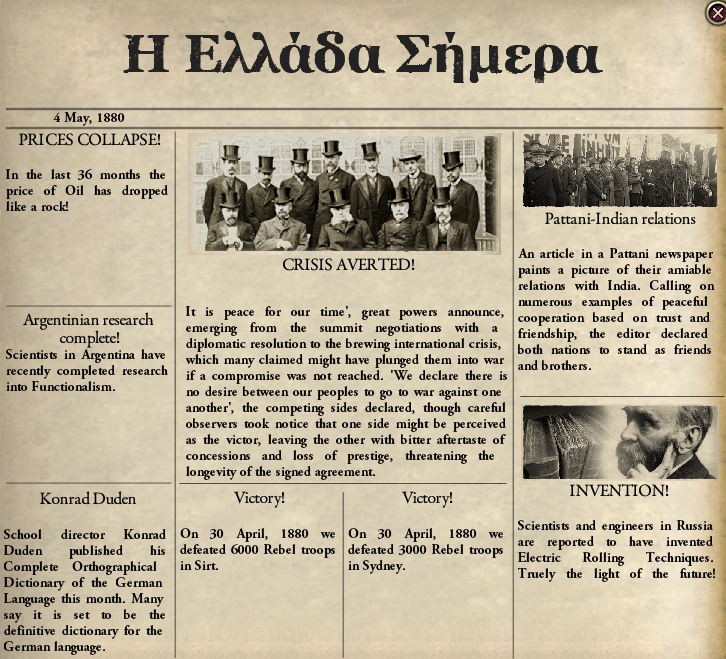
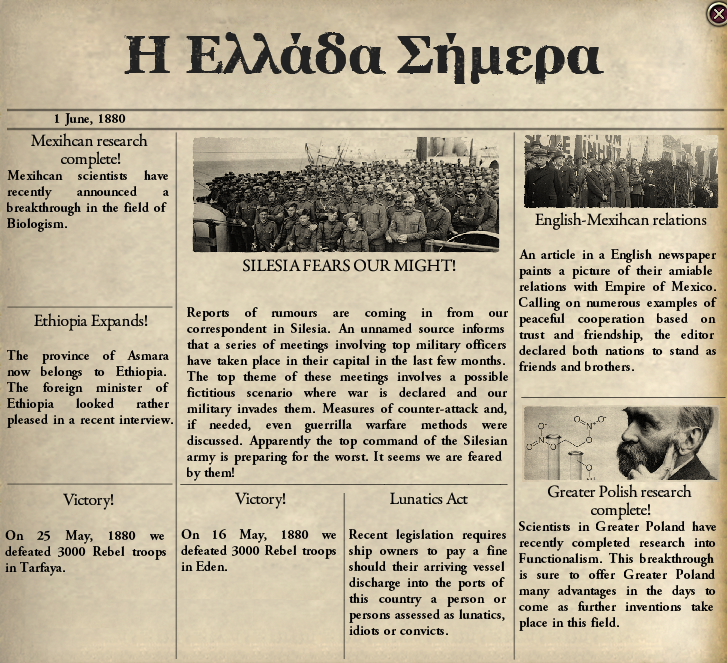
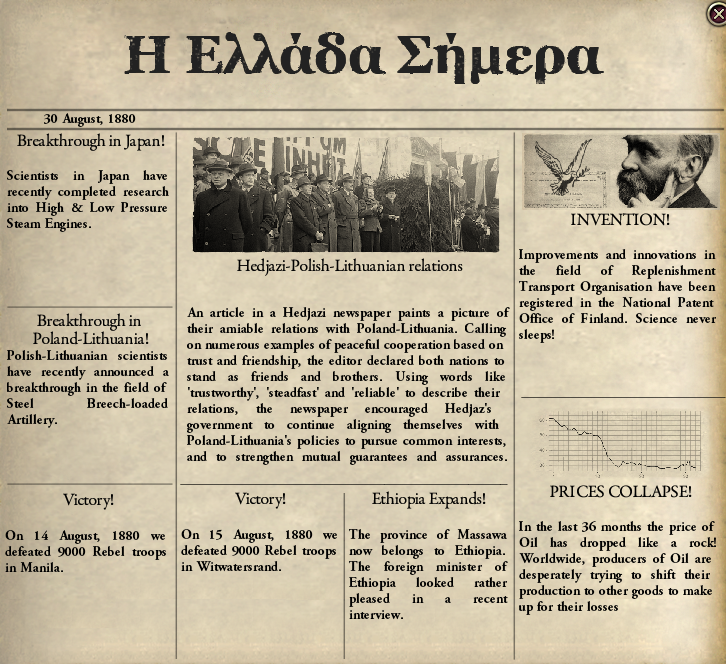
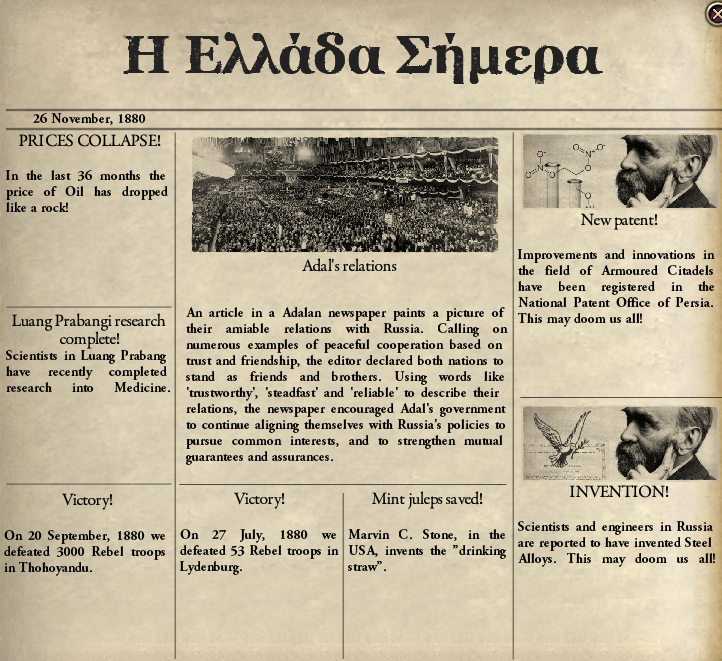
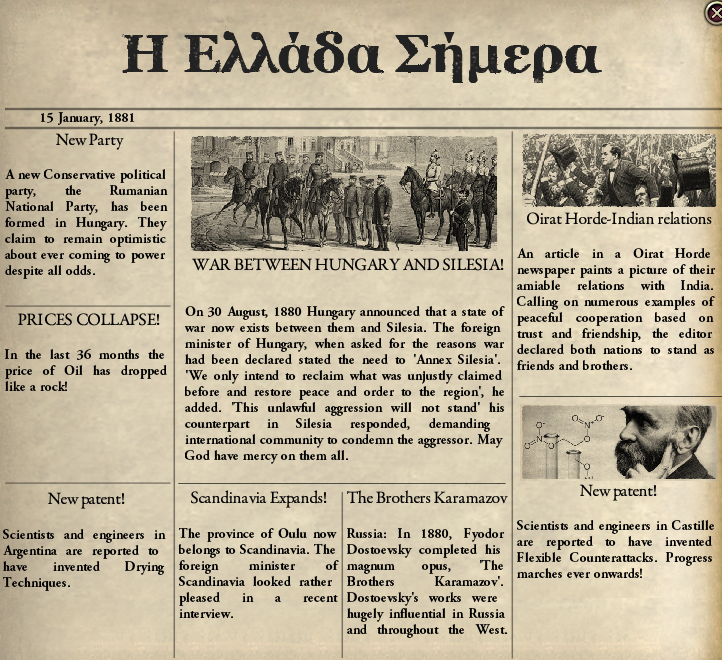
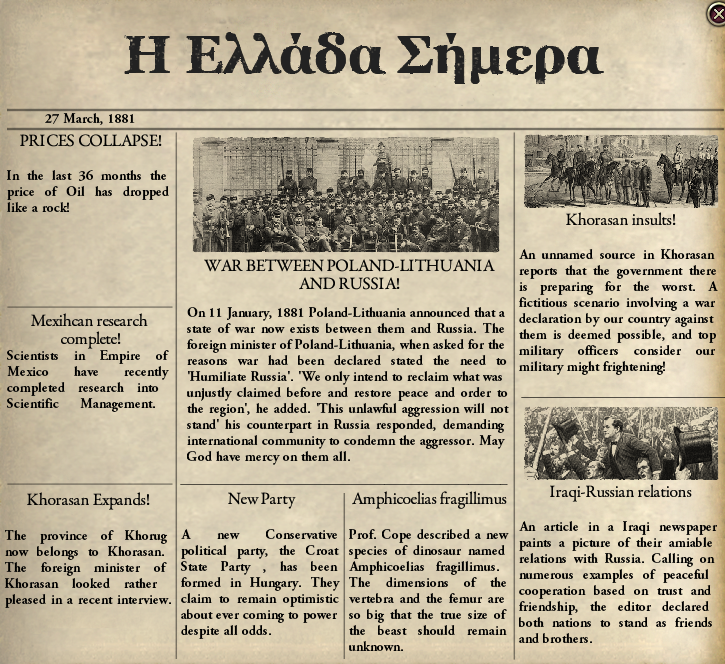
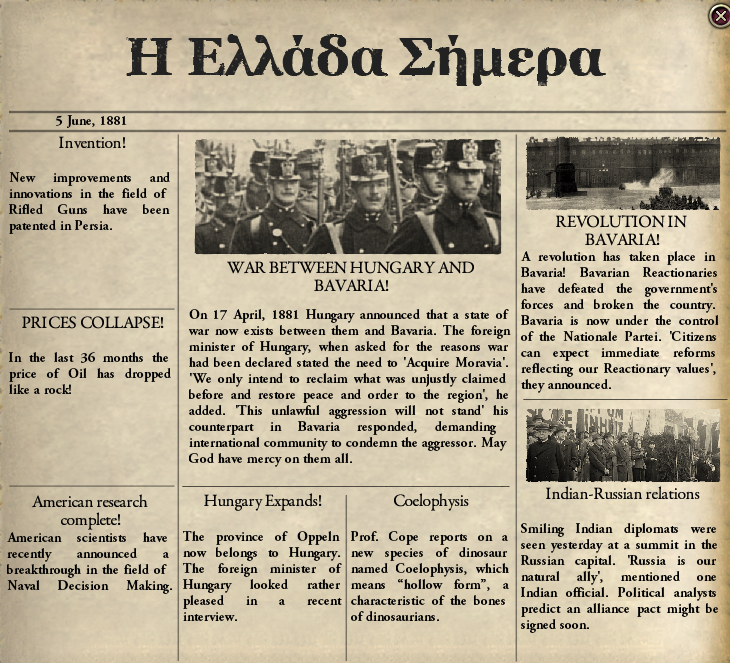
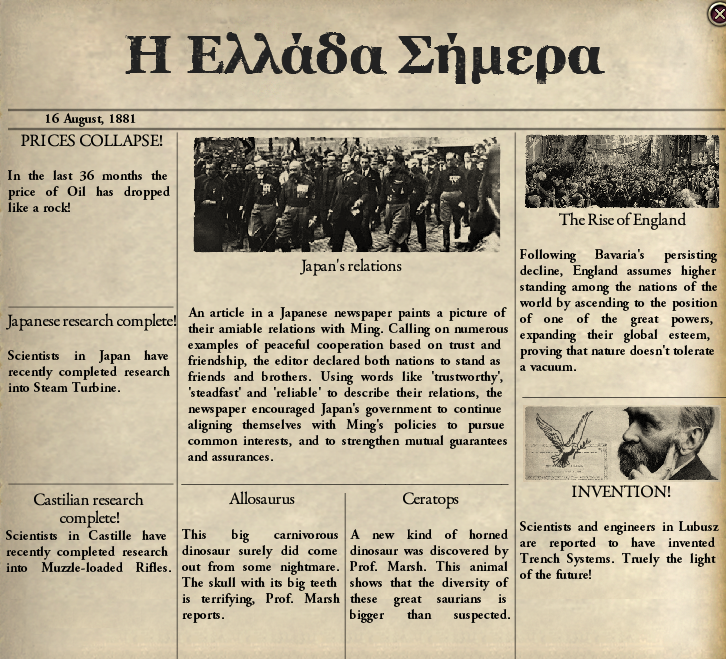
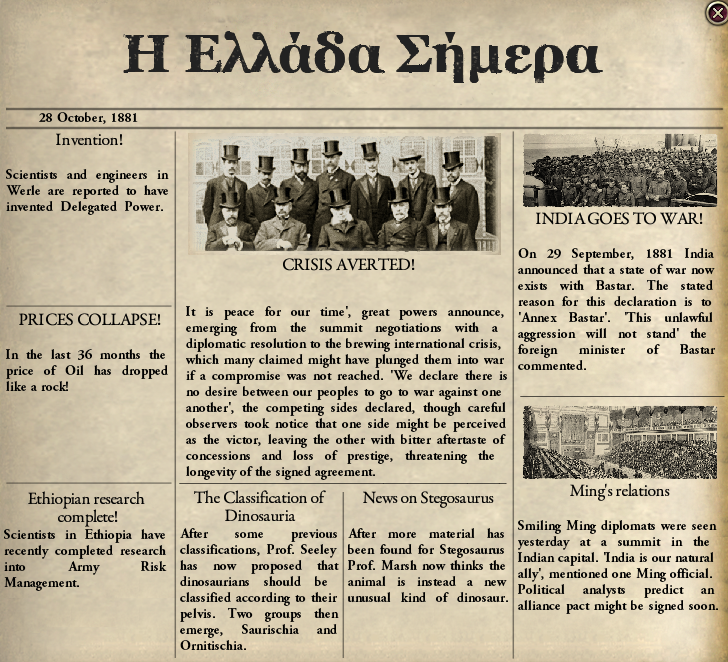
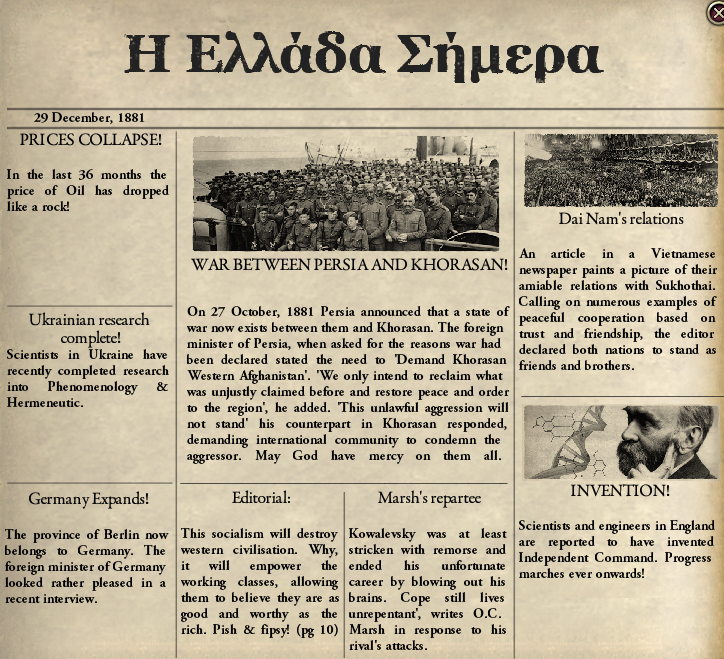
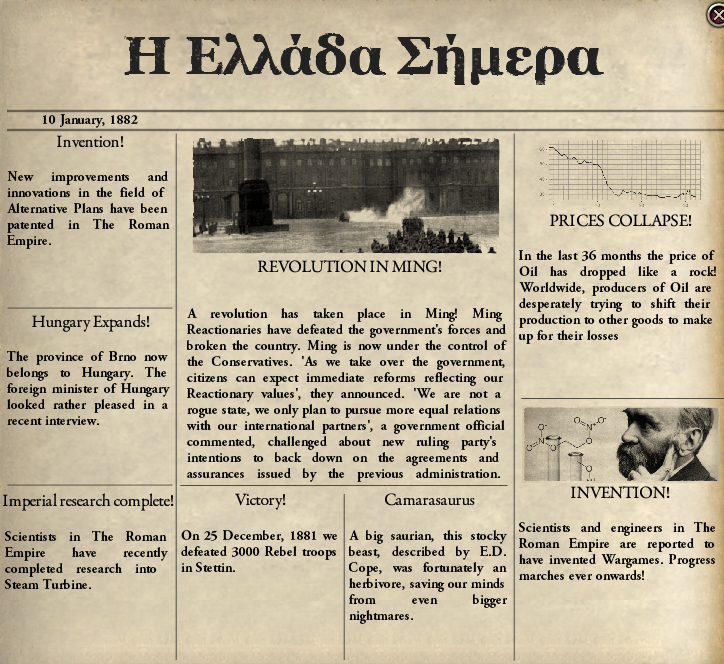
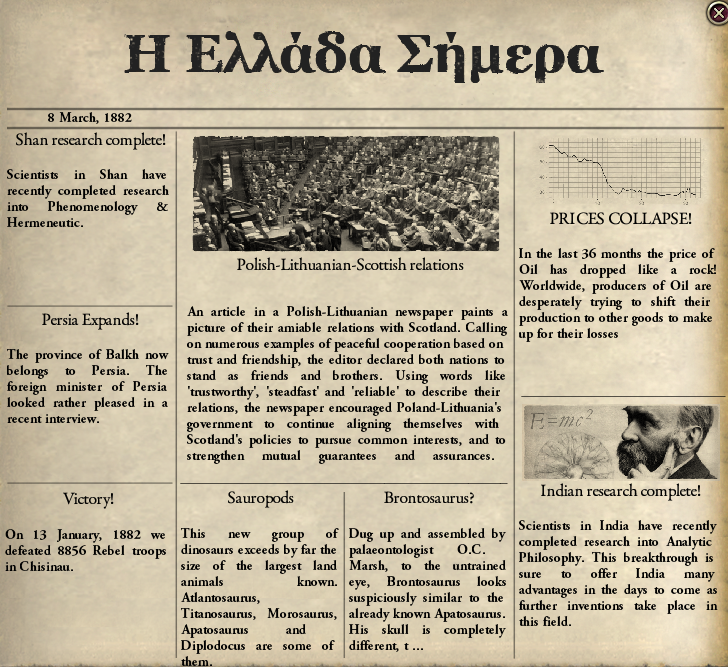
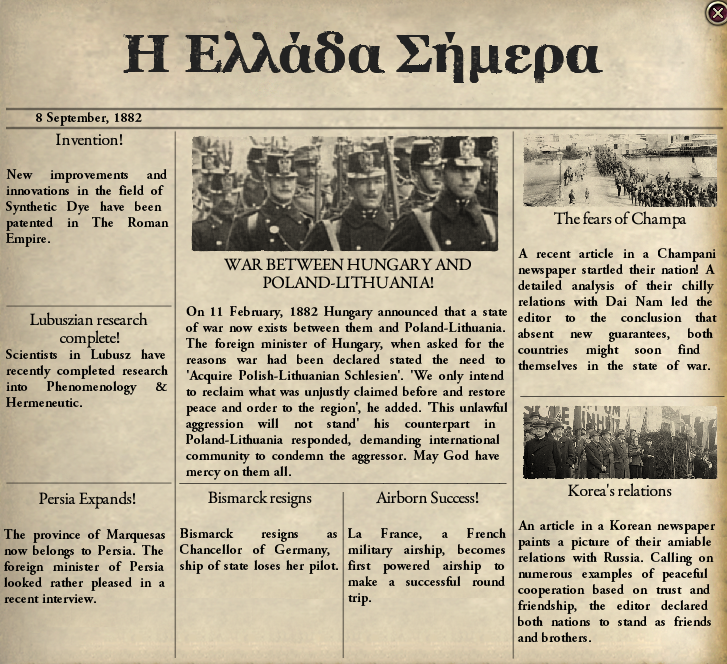
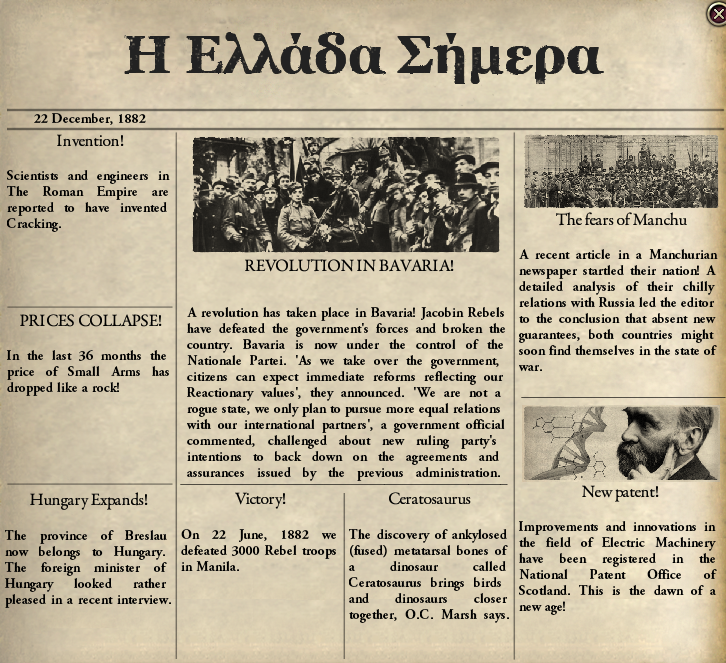
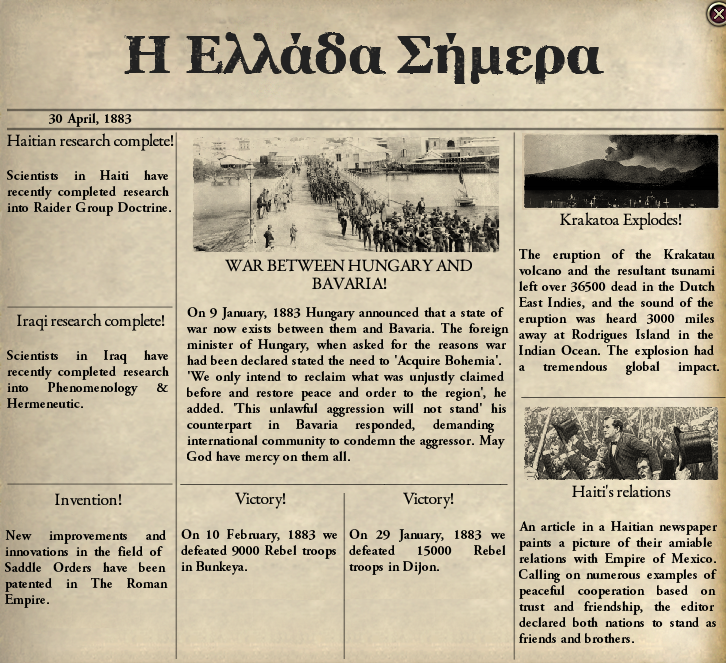
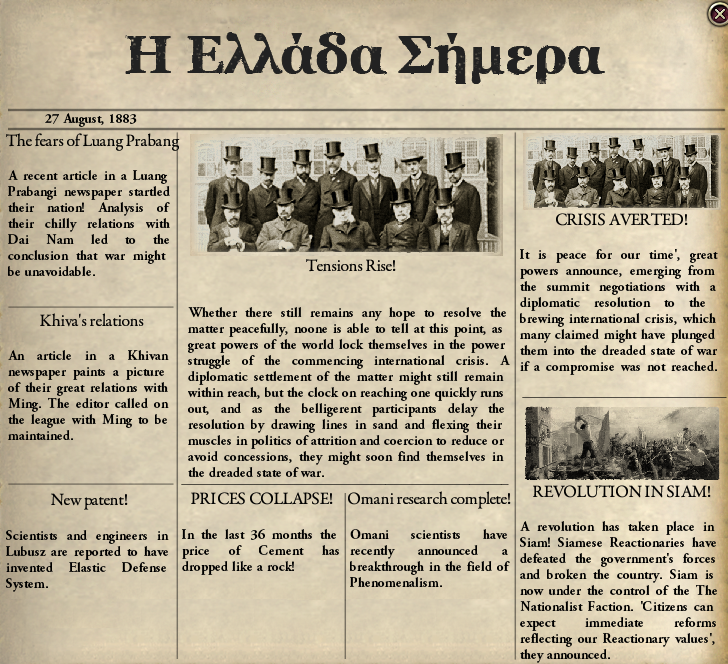
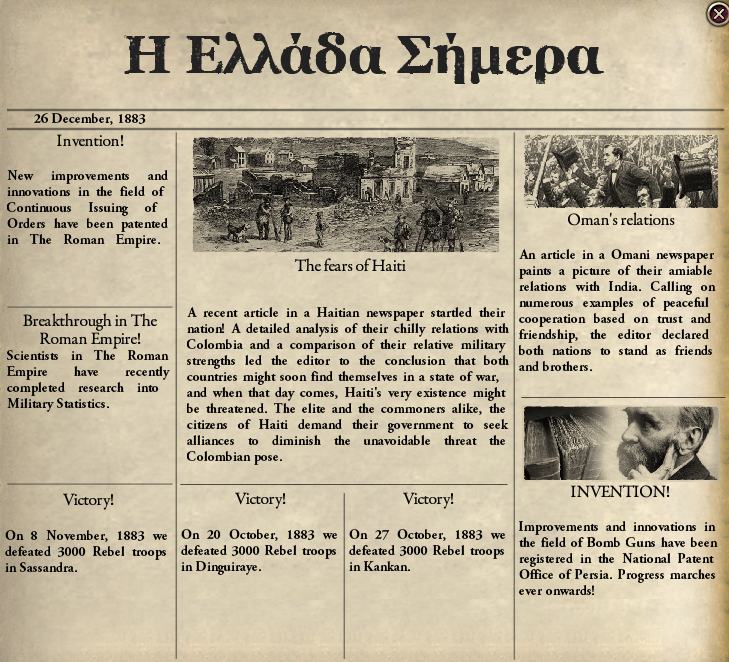
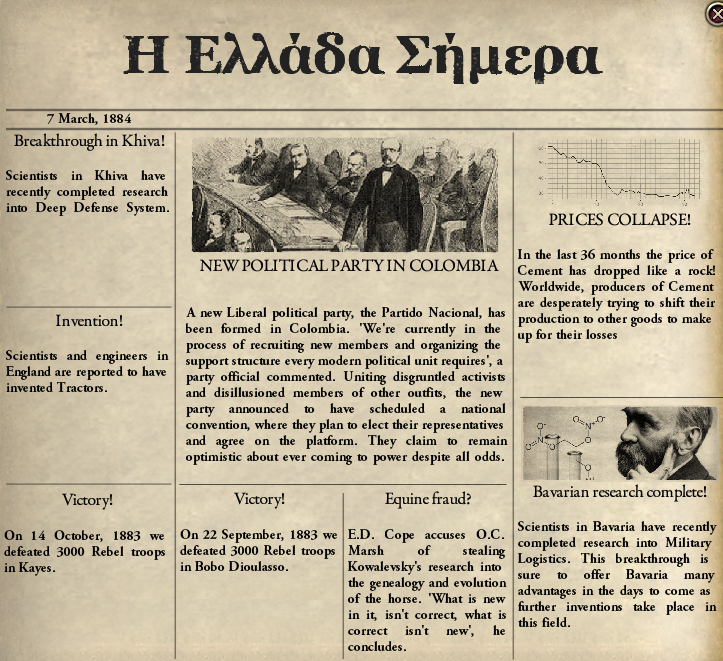
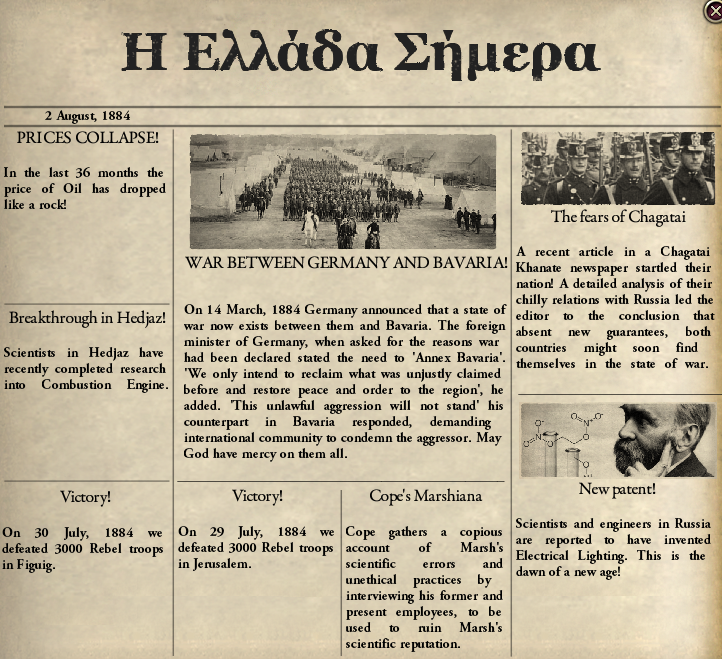
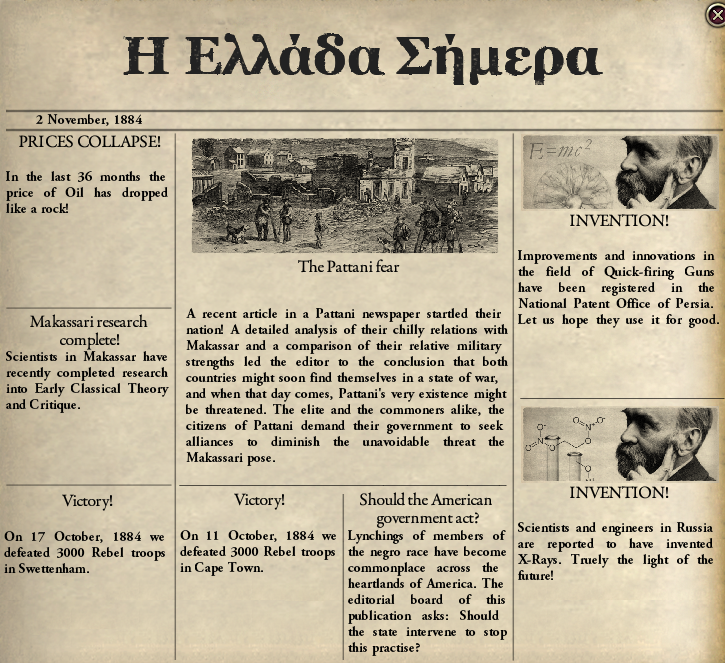
And as you can see, the world map in this room has been updated. I’m told the Senate’s is being updated now, too.
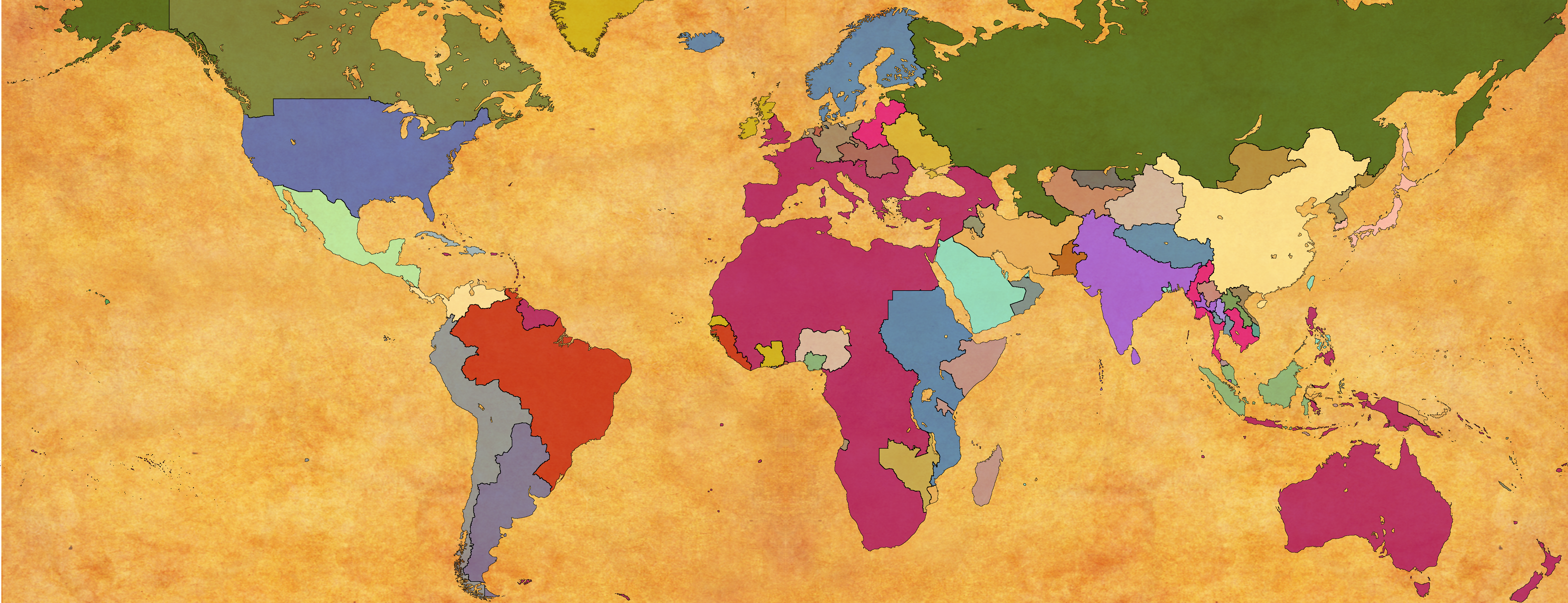
((Meanwhile in the Hippodrome))
The crowds roared as a man dressed in Imperial purple stepped into the middle of the arena. Chariot racing had long been abandoned in the Empire, replaced with more popular, safer, and practical horse racing. No games between the Blues and Greens had been scheduled lately, but they weren’t why so many citizens were here. If one looked in the stables then, one would have found the dismembered bodies of at least fifty guards hidden under the hay.
“Citizens of the Empire!” said the man.
The resulting roar from the crowd could be heard all the way from Blachernae and the Senate Building.
The man continued. “I come to you in a time of great need. The Empire is undergoing massive change. We have become the masters of two continents-Europe and Africa. Our military is superior to all others. Our enemies fear our intervention in their personal business. We are at peace.”
He paused. “Or so the Empress says. You know, what was the cost of all of this? Do you want to know why all of you have such high taxes? Do you want to know what was the price of civilizing Africa? Of rescuing…”
He tried to say “my grandfather,” but couldn’t.
“…an old Senator who had outlived his usefulness? There are things that the Empress is hiding from you. Why do you think that so many of you rose up against her in the Communist revolution of the 1870s? Just why?
“The Empire is hanging on a thread. Thanks to the wasteful spending of the Empress, she lives like the heretic Popes of old did centuries ago: decadent, swimming in gold, with a harem of little boys to enjoy…No! We are the heirs of Rome! And we shall live up to the legacies of Caesar, Augustus, Trajan, Hadrian, Diocletian, Hadrian, Konstantinos X, all of them!
“I stand before you today because I am going to return the Empire to its rightful glory and place in the sun. We’re going to make the Empire great again! By God, I swear that I will create the most jobs of any Emperor, and that those jobs will go to you hard-working Greeks, the only true Romans! The Empire has become a dumping ground for everybody else’s social and political problems.”
The audience cheered. “Thank you. It’s true, and you Romans are the best and the finest. When England, Ruthenia, Bavaria, Scotland, the Ming, the United Tribes, all of them sends their people, they’re not sending their best. They’re not sending you. They’re not sending you civilized people. They’re sending people that have lots of problems, and they’re bringing those problems with us. They’re bringing drugs. They’re bringing crime. They’re rapists. And all of them, I assume, are savages.
“We will not deal with savages. We will not deal with Germanic and Slavic barbarians who brought down the Empire centuries ago. We will, however, make the Empire great again! I will restore the Imperial dream, where all hard-working citizens can rise to the top, like I am doing! Romanitas! Remember that! That is the Roman identity, which anybody can attain with citizenship! Also, to prevent our pure Roman blood from being diluted with the blood of savage Germanic barbarians I shall force Bavaria to build a wall along our shared border. An insecure border does also let in terrorists, drug dealers, rapists, murderers, all of whom I’ve prosecuted and put down during my time in the Army.
“So join me! Join me in deposing the false Empress and her decadent court, her senator lovers, and her harem! A woman is clearly unfit for ruling our great nation! Make the Empire great again!”
“HAIL EMPEROR KONSTANTINOS XX DOUKAS!” roared the crowd. “DEATH TO THE EMPRESS!”
Konstantinos retreated to his hideout, where his generals were getting ready to execute the plan. They would seize Blachernae, the Hagia Sophia, and the Senate simultaneously so that his annoying brother and the Athenian Lancers would not have time to intervene.
“Ready, men?” he said.
“Yes, your Highness,” said his generals.
He pointed at the burn mark over his eye and the limp in his leg. “Soon, we will avenge me.”
“Sir, should we march on the–” said a general.
Konstantinos silenced him suddenly with a sweep of his hand which also hurled a dagger towards a spy hiding at the far corner of the room. The man collapsed quickly.
“My father has sent spies to our meeting, so nobody is safe,” Konstantinos said, “To prove your loyalty, kill each other and I will reward the survivor greatly.”
Within seconds there were only two men alive in the room–Konstantinos and a general named Markos.
“We march on the Senate at once!” he ordered.
((To be continued…))
Bismarck resigns, eh? We’ll miss that guy. Remember how at all of the times he appeared before the Senate he kept ranting about “blood and iron” and how Germany was going to become as powerful as the Empire itself? Funny guy. He was also a nice guy–gave me a pickelhaube as a birthday present once.
Why so many reactionaries now after so many Jacobins?
Also, that military airship we built in France…I feel like we’re going to need it soon.
- Alexios Doukas
I would like to congratulate the Senate on formulating the Lunatics Act.
Central Europe has been full of strife. While I may have detested Bavaria I fear that Germany has grown too strong by annexing them.
- Moustakas
I simply detest the Germans as they descended from the Germanic tribes that had wiped out Varus’ lost legions with trickery. I hope they have reformed and no longer will backstab us or else they shall face the wrath of Roman steel! Still, best of luck on their new, united, hopefully peaceful country.
- Senator Andronikos Palaiologos, Governor of Britannia and Duke of Nicaea
Whoever writes these newspapers presented to the Senate should really be fired by now. “Dutch East Indies”? Why are the Dutch getting exclusive naming rights to the region when it is predominately Roman-controlled. And this “drinking straw” invention came from some unknown country called the USA. Is it somehow related to the UTA? Perhaps a typo? Also, a French military ship! Unless our French subjects are militarizing behind our backs, it should be a Roman ship. I may have to conduct an investigation into this.
Besides all that, the volcanic eruption of Krakatoa sounds horrific. Our colonies in the region must be devastated. I recommend we send as much aid as we can.
The number of revolutions worldwide is quite worrisome. It seems that only the Roman Empire can provide stability in these troublesome times. It is our duty to ensure the world does not devolve into further chaos.
- Senator Leonardo Favero
After many years of helping Empire grow in it’s strenght, Alexios Damaskinos, my dear father, passed away on 12 November 1884. By the law his seat in Senate and title of Governor of Africa is passed to me. I hope that my actions would make my father proud. Rest in Peace, my dear father.
- Alexandros Damaskinos
Indeed, let us pray for the victims of the volcano attack. Clearly God was angry about the constant swarm of revolutions around the planet.
- Mikael Moustakas
Greetings fellow Senators, allow me to introduce myself; I am Senator Magnus Kvensson.
First, I would like to thank the most pristine and wise Empress for my new position among this prestigious and respected society. Now I assume many of you doubt my loyalty to the empire espcially with a name as outlandish as mine, but I assure you i have bled and lost close kin for the empire and her interest. I have served for 15 years in our eternal legions and even worked my way to Legate. But most of all I cannot stand these Slavic pagans that do these cruel and unusual rituals to the good citizens we vow and swore to protect!
(Ahem)
However, I don’t believe a military conquest is the way to solve the pagan issue, for we cannot even guarantee our own internal stability. And how do we achieve this stability you may wonder? Simple. Money.
We control practically all of Africa and the very populous Indian continent as well as large swaths of land in Australia. We should focus on harvesting these raw resource pools and investing in their development.
Every night i hear someone, anyone ranting about how these “socialist” and “communist” and how they’ll bring wealth to everyone. So I propose this as the counter to these upstart ideals and rebellions and calm the populous.
Thank you for listening and I look forward to meeting all of you prestigious senators.
- Senator Magnus Kvensson
After an intense discussion, I will be retiring after the next Senate session and living out the rest of my life at my estate at Nicaea. I will the Dukedom of Nicaea to my eldest son and my heir, Ambrosio Palaiologos, after the next session of the Senate. He is 33 years old, being born on January 29th, 1852((Is this right? What year are we in, 1880 or 1885?)) He was born in Londinium in Britannia. He will continue my fights for justice, order, and prosperity and is a firm believer in the power of Rome, the invincibility of her legions, and the maginimious naature of the Empress and administration. He will take over my position in the Kyriarchía (( Who is the head of this party? If noone has claimed it, may I be the head of the Kyriarchía?)). I would also like the Empress the assign Ambrosio to the rector provinciae of Britannia and also to promote him to praetor after my retirement, taking over my positions. Thank you for your benevolence to me throughout my years of service. I understand if my son is not fit to be rector provinciae and you decide to assign him somewhere else. Hail Empress Veronica! Hail Rome! Hail the Empire!
IMPERIUM ROMANUM
SPQR
Senator Andronikos Palaiologos, governor of Britannia, propraetor of Rome, and duke of Nicaea.
It has been decided that as my eldest son Konstantinos is not fit mentally and emotionally to inherit my titles and senatorship due to trauma he endured during the last rebellion, I shall introduce my second eldest son, Michael Konstantios Doukas, a most capable young man who has served several years in the Army and has proven his experience at governing Thema Greece in my absence. He is currently observing the proceedings of this Senate session to prepare him for his future position.
- Senator Alexios Doukas, etc.((Outside the Senate building, where nobody notices them, Konstantinos and his men observe the Senate.))
Konstantinos chuckled. “All is going according to plan. My brother and father are in the same building and will die as soon as the Empress arrives. How is the rest of the plan going?”
“My lord,” said Markos, “Our agents have been planted in strategic locations across the Empire, ready to strike at your command. We can barely control the mob, as they want blood now; there have been minor riots, but nobody will think much of them. My men will storm the Hagia Sophia and seize the Patriarch at your command. Also, those pesky Athenian Lancers have been sent on a wild goose chase to Bulgaria after I ‘tipped them off’ about a possible Cult stronghold there.”
“Excellent, my loyal servant” said Konstantinos, “Now we just have to wait for the false Empress to arrive at the Senate and we will win.”
Andronikos says to his son”I am mighty proud of you, have I ever told you that”. Ambrosio replies “Yes, I know you are proud of my service to the Empire as legate of the 14th Martia Valeria Victrix Legion, one of the most famous legions in the empire. However, I have not achieved praetorship like you have. I have merely dealt with enemies of the Empire.” Andronikos sighs “Some of the peasant rabble these days are going crazy. Have you heard about that riot in Batavia? It was small but there have been more and more rioting in the Empire. That is why I asked you to bring a vexillation of the 14th. I also brought Nicaean Guardsmen, my personal guard, and Governorate Troops from Colchester and Londinium to show the Empress that we will always be there at her side, ready to strike down her opponents.” Ambrosio drily replies “Sometimes, I think you’re going paranoid. The only threat to us in the Imperial capital was the cult and we crushed them. I don’t see why you had to bring 1,200 troops here.” Andronikos looks Ambrosio in the eye and says “You never know what will happen, the Athenian Lancers are away today. There was some remnants of the Cult in Moesia that they had to hunt down showing that the Cult could strike again. Anyways, first impressions count. The Empress will be mightily impressed by your dedication to the Empire by bringing so many loyal troops as a show of support”.
Alexios beckons to his son Michael, a young man in uniform sitting near the door. “Michael, I have something I wish to discuss with you.”
((Whispering to each other so that nobody hears them))
“I have a bad feeling about today, son,” said Alexios, “The Lancers are away, so if something happens we can’t rely on them for help.”
“Yes, father,” said Michael, “However, I have brought with me a half dozen bodyguards who can be trusted.”
“Any word on Konstantinos?”
“No, father, not since that letter last month begging me to reconsider my loyalties. My spies have told me that he’s clean of any treasonous thoughts, but I have reason to assume Konstantinos is paying them off (otherwise how could one of them have bought a bloody Arabian horse that was more suited for the Hippodrome than for farming?). Konstantinos is hiding his tracks, but why?”
“Yes, why? He’s made it clear to us he wishes to depose the Empress, but surely he wouldn’t act on those wishes…”
“I heard that one of the other senators has brough his own guards here in the absence of the Lancers, father. You’ll be safe here. (Also, I know he’s brought them here just to boost his own standing.)”
“I know that, but I’m still worried about Konstantinos…”
(Outside the Senate Hall Magnus recognizes a seated man reading a book and begins to approach him and takes a seat next to him.)
“Jensen”
“Mr. Kvensson”
“I assume that the detachment of my security detail is still on route?”
“Of course, sir.”
“Well, have them hasten their journey, there is an uneasiness about the air here.”
Jensen marks his page with bookmark and closes the book shut.
“Sir?”
“The other senators seem tense, there is much more whispering going about, with worried looks.”
“Well sir, the Athenian Lancers aren’t in the city so-“
“What?!”
“Yes sir, they left the walls a few days ago.”
“Damn it” said Magnus with a hushed tone.
The two sat in silence for a moment.
“Jensen, as soon as I can secure governorship of the Oceanic colonies, we’re going to Barcelona.”
“What happened to trying to build connections?”
“Half of these connections might be dead by the end of the month, be sure to have Valdemar and Anders aware and prepared for the coming days.”
Magnus puts his hand on Jensen’s knee while standing up.
“And most of all, you be prepared, the times are changing.”
Magnus walks away back towards the Senate hall.
“I didn’t ask for this.” Jensen grumbles under his breath.
(Outside the Senate in the city, near the forum of Constantine)
The citizens of Nova Roma Constantinopolis were world renowned for their ability to kick up a fuss Columba reflected but as he gazed at the crowd boiling around the well corroding statue of the great Emperor on his crumbling column there was something about this crowed that told him more blood than usual was in the air. This was the last thing he needed he had hardly sat down properly in the last few years. Whether it was to do with the tensions in Reatia coming from diff rent cultural groups which had only heightened following the Jacobin revolution in Bavaria and that country’s subsequent war with Hungary which saw some violence spill over the border had set the whole thing close to boiling point. With the Legions set to guarding the frontier only the provincial police and militia kept things in order and those he only trusted because he had to. Aside from them there was his personal guard whom he trusted with his life he had raised them himself and many of his old friends and acquaintances from back home.
“Anyone in this crowd who doesn’t have blood on their minds already has it on their hands.” It was the senators lifelong friend and aide Donal McDonald eternal teased for his name but that’s what happens with alcoholic parents.
“Too true; for once I’m glad everything has been so on edge lately otherwise I shouldn’t have brought so many men along”
“How many incidentally Guv’nor”
“You’re calling me that deliberately again aren’t you. Well 300 from my personal guard; 200 from the provincial militia, police and local garrisons; along with detachments form the Legions with another 200 plus however many we picked up along the way”
“For the surprise birthday parade we were planning to hold for the Basilia?”
“Yes. Though I fear they will be exhibiting a more practical demonstration than we anticipated”
“Will there be blood your eminence?”
“I see you now realise the seriousness of the situation and the answer is yes. You and I have both seen enough situations like this to know when it’s inevitable. It’s going to kick off soon and it will be something to remember tell the men to get ready for a fight rifles, muskets, sword, shield, bow whatever just tell them to get-aaagh!”
“Sir!”
“I’m alright! Don’t panic. Damn knee”
“Still not quite the same?”
“Not since that incident when some damn deustche dafty broke into my bedroom and woke me up with a knife in my leg”
“Not pleasant then”
“It was somewhat inconvenient. There is still blood on my mattress though whether it’s his, mine or both is anyone’s guess.”
“You showed him what foe ehh-“
“Aye well look we don’t have time for that there’s going to be a riot and a big one our first Priority has to be Veronica and her family; then the Patriarch; then the senators.”
“So what do we do?”
“Contain the crowd. Put men at the main roads in and out of the forum and some on the colonnade surrounding it mix the men up as well the legionaries and guard will hold; the militia might and the others won’t so mix them up give everyone a boost to their morale. Don’t do anything stupid unless you have to; send riders after the lancers and tell them to get back here as if their lives depended on it.”
“Do their lives depend on it?”
“That very much depends of the forthcoming events. From here to the walls look clam but keep a rearguard just in case check the harbours for anything even remotely out of the ordinary and find out whats happening at the Sacred Palace the others might be in danger.”
The senator turns his horse around ready to ride off.
“Ohh and one more thing. Go to the Varangian Barracks and find out what the hell is going on over there after you get my brother and his family out of the city”
“Pished perhaps sir?”
“The ones that aren’t pished will be steamin the ones that aren’t steamin will be wasted and the ones that aren’t wasted will have whitied allover the floor so be careful. And watch out for the blood from broken noses and those recovering from a hangover they’re the worst. 5,000 Vikings, Celts and Anglo-saxons cooped up in City of man’s desire who thought that was a good idea?”
“And where are you going sir?”
“Blacherne. Along with the life guards if there is a riot the Empress is our first priority you’re in charge here keep me informed.”
“Yes sir.”
Columba turned and rode down the line losening his claymore at his waist and sgian-dubh at his ankle; he sliped his round shield from his back to his front the gilt bosses gleaming in the sun “lovely day for it. If there ever is one.” Tanning a cheeky wee dram from his flask he replaced it in his sporran and rode off for what ever awaited.
Andronikos turns to Ambrosio and says “All the senators are bringing a personal entourage to impress the Empress. They might even be foolish enough to think that there will be a revolt in the city! I tell you, this discontent is merely some miscreants trying to start a few riots. We need better social policies to educate the youth to prevent this!” Ambrosio replies “I wouldn’t be so sure that this will not turn into a revolt. There have been riots throughout the Empire, those weren’t isolated incidents. I have a bad feeling about the next Senate meeting, don’t you want to put the troops on alert?” Andronikos retorts “Nonsense, the populace have just got some radicals whipping out their followers. I tell you, the worst thing are riots and the City Guard and Imperial Police will easily handle them. Why should I put the troops on alert? There is no threat to this city! Who would dare contest the power of Rome and the glory of the Empress? If you are so worried, I will send Nisene to Nicaea to meet with Heracles, Tanaya, and Kate. But Diederick stays.” Ambrosio sighs “That would be for the best though I still have a gut feeling that this is part of something larger.”
The wind blew through Leonardo’s hair as his ships entered the Bosphorus strait. He had returned to Venice briefly to deal with some financial affairs. The usual buyer for the wine his vineyards produced had gone bankrupt and he had had to find a new business partner. He had also taken the time to peruse a few factories that had been popping up in the region. Factories were becoming much more profitable than the usual estates of nobles. Perhaps when he returned to Venice, he could buy some shares in some to reap the rewards. He surely wasn’t hurting for money, but more was always better. The more he had, the more he could invest in his business ventures. Surely the entire region benefited as a whole from the profitable business he produced.
Leonardo couldn’t help but smile as his shipped docked in Constantinople. He had another two dozen ships out in the harbour with various trade goods he had acquired in Italy to sell in the City of World’s Desire. He never wasted the opportunity to make an extra buck when travelling. The extra ships were also great to ward off smugglers or those who’d dare attack his shipping, not that many would dare do that in this day and age. The Roman navy was too fearsome to oppose.
As Leonardo entered the city, there was a certain tenseness in the air. There seemed to be less people in the streets, as though many had decided it was best to stay at home. Others eyed one another with suspicion. Leonardo had his usual body guards with him, so he didn’t feel in any danger. He made his way to the Senate without interference. He only hoped the same atmosphere wasn’t infecting the Senate as well.
((Still hiding outside the Senate))
Konstantinos chuckled silently. “Ha! The fools march to their deaths!” he thought. “Good thing I placed several bombs at strategic points in every major city…”
((Alexios))
Why are we still here? Is the Senate Session not at Blachernae?((Konstantinos))
Sigh. Looks like we’ll have to make do with the mobs of unemployed and homeless assembled at the Hippodrome. Markos, tell everyone we’re headed to Blachernae, where we’ll ambush the senators and Empress there.
((Further proof that many of the people of our proud Empire live in poverty.))
As for all of this, Nicodemo was seeking council with the Empress over disturbing news he had received from an old friend. Nicodemo had received cable from his former collaborator, English communist Leon Lewis. He had dressed himself in full outfit, and set out on horseback. There was information he felt had to be given to the Empire. He was now idling about in a large ballroom hoping there would be time in the Empress’ schedule to see him momentarily.
The Empress enters the ballroom with her usual bodyguard, who stay behind at the doors.
Senator Theodosio, you said you had a message of critical importance? Is it something I should include in the address? I am on the way to the Grand Hall to deliver the address.
Empress, I have news of worry within the city, an old friend sent me a letter saying that a large amount of arms have been shipped from London recently and stockpiled within Constantinople. I had heard no news of military expansion, so I had a man check, and there are indeed stockpiles of weapons throughout the city, for what purpose, I cannot say. I cannot see it being in anyway positive. I have been working to repress any hint of rebellion among the communists, but I do not know what faction could be responsible for what is going on.
I urge you to call together your guard and flee the city, as quickly as you are able, there are hostile factions at work here, and the Empire will collapse if you fall.
The Scholai Palatinae is currently to the north clearing out a Cult stronghold. When they return, We will strongly consider doing as you suggest. For now, We shall give Our address to the Senate, who should be assembled by now.
((Konstantinos)) Soon…
((From the journal of General Ioannes of the Athenian Lancers, in Bulgaria/Wallachia/somewhere in the Carpathians))
Left Varna at 8:35 P. M, on [REDACTED], arriving at Vienna early next morning; should have arrived at 6:46, but train was an hour late. Buda-Pesth seems a wonderful place, from the glimpse which I got of it from the train and the little I could walk through the streets. I feared to go very far from the station, as we had arrived late and would start as near the correct time as possible.
The impression I had was that we were leaving the Empire; the most southern of splendid bridges over the Danube, which is here of noble width and depth, took us among the traditions of non-Imperial rule
We left in pretty good time, and came after nightfall to Klausenburgh. Here I stopped for the night at the Hotel Royale. I had for dinner, or rather supper, a chicken done up some way with red pepper, which was very good but thirsty. (Mem. get recipe for Mara.) I asked the waiter, and he said it was called “paprika hendl,” and that, as it was a national dish, I should be able to get it anywhere along the Carpathians.
I found my smattering of Hungarian very useful here, indeed, I don’t know how I should be able to get on without it.
Having had some time at my disposal when in Constantinople before my deployment, I had visited the Imperial Museum, and made search among the books and maps in the library regarding Transylvania; it had struck me that some foreknowledge of the country could hardly fail to have some importance in dealing with a nobleman of that country who was possibly giving shelter to the Cult. I find that the district he named is in the extreme east of the country, just on the borders of three states, Transylvania, Moldavia, and Bukovina, in the midst of the Carpathian mountains.
I was not able to light on any map or work giving the exact locality of the Castle Dracula, as there are no maps of this country as yet to compare with our own Ordnance Survey Maps; but I found that Bistritz, the post town named by Count Dracula, is a fairly well-known place. I shall enter here some of my notes, as they may refresh my memory when I talk over my travels with Mara.
In the population of Transylvania there are four distinct nationalities: Saxons in the South, and mixed with them the Wallachs, who are the descendants of the Dacians, ancient enemies of the Empire; Magyars in the West, and Szekelys in the East and North. I am going among the latter, who claim to be descended from Attila and the Huns. This may be so, for when the Magyars conquered the country centuries ago they found the Huns settled in it.
I read that every known superstition in the world is gathered into the horseshoe of the Carpathians, as if it were the centre of some sort of imaginative whirlpool; if so my stay may be very interesting. (Mem., I must ask the Count all about them.)
I did not sleep well, though my bed was comfortable enough, for I had all sorts of queer dreams. There was a dog howling all night under my window, which may have had something to do with it; or it may have been the paprika, for I had to drink up all the water in my carafe, and was still thirsty. Towards morning I slept and was wakened by the continuous knocking at my door, so I guess I must have been sleeping soundly then. The other Lancers assured me there was nobody there.
I had for breakfast more paprika, and a sort of porridge of maize flour which they said was “mamaliga”, and egg-plant stuffed with forcemeat, a very excellent dish, which they call “impletata”. (Mem.,get recipe for this also.)
I had to hurry breakfast, for the train started a little before eight, or rather it ought to have done so, for after rushing to the station at 7:30 I had to sit in the carriage for more than an hour before we began to move. The other Lancers were equally annoyed.
It seems to me that the further north you go the more unpunctual are the trains. What ought they to be in Russia?
All day long we seemed to dawdle through a country which was full of beauty of every kind. Sometimes we saw little towns or castles on the top of steep hills such as we see in old missals; sometimes we ran by rivers and streams which seemed from the wide stony margin on each side of them to be subject of great floods. It takes a lot of water, and running strong, to sweep the outside edge of a river clear.
At every station there were groups of people, sometimes crowds, and in all sorts of attire. Some of them were just like the peasants at home or those I saw coming through Macedonia and northern Greece.
The women looked pretty, except when you got near them, but they were very clumsy about the waist. They had all full white sleeves of some kind or other, and most of them had big belts with a lot of strips of something fluttering from them like the dresses in a ballet, but of course there were petticoats under them.
The strangest figures we saw were the Slovaks, who were more barbarian than the rest, with their big cow-boy hats, great baggy dirty-white trousers, white linen shirts, and enormous heavy leather belts, nearly a foot wide, all studded over with brass nails. They wore high boots, with their trousers tucked into them, and had long black hair and heavy black moustaches. They are very picturesque, but do not look prepossessing. On the stage they would be set down at once as some old Oriental band of brigands. They are, however, I am told, very harmless and rather wanting in natural self-assertion. They have been quite loyal Imperial citizens as of late.
It was on the dark side of twilight when we got to Bistritz, which is a very interesting old place. Being practically on the frontier–for the Borgo Pass leads from it into Bukovina–it has had a very stormy existence, and it certainly shows marks of it. Fifty years ago a series of great fires took place, which made terrible havoc on five separate occasions.
Count Dracula had directed us to go to the Golden Krone Hotel, which I found, to my great delight, to be thoroughly old-fashioned, for of course I wanted to see all I could of the ways of the country.
I was evidently expected, for when I got near the door I faced a cheery-looking elderly woman in the usual peasant dress–white undergarment with a long double apron, front, and back, of coloured stuff fitting almost too tight for modesty. When I came close she bowed and said, “The Imperial soldier?”
“Yes,” I said, “Ioannes Dalassenos.”
She smiled, and gave some message to an elderly man in white shirt-sleeves, who had followed her to the door.
He went, but immediately returned with a letter:My friends in the Athenian Lancers.
Welcome to the Carpathians. I am anxiously expecting you. Sleep well tonight. At three tomorrow the diligence will start for Bukovina; a place on it is kept for you. At the Borgo Pass my carriage will await you and will bring you to me. I trust that your journey from Constantinople has been a happy one, and that you will enjoy your stay in my beautiful land.
Your friend,
Dracula.The next day.
–I found that my landlord had got a letter from the Count, directing him to secure the best place on the coach for me; but on making inquiries as to details he seemed somewhat reticent, and pretended that he could not understand my Hungarian.
This could not be true, because up to then he had understood it perfectly; at least, he answered my questions exactly as if he did.
He and his wife, the old lady who had received me, looked at each other in a frightened sort of way. He mumbled out that the money had been sent in a letter, and that was all he knew. When I asked him if he knew Count Dracula, and could tell me anything of his castle, both he and his wife crossed themselves, and, saying that they knew nothing at all, simply refused to speak further. It was so near the time of starting that I had no time to ask anyone else, for it was all very mysterious and not by any means comforting.
Just before I was leaving, the old lady came up to my room and said in a hysterical way: “Must you go? Oh! Young Imperial, must you go?” She was in such an excited state that she seemed to have lost her grip of what Hungarian she knew, and mixed it all up with some other language which I did not know at all. I was just able to follow her by asking many questions. When I told her that I must go at once, and that I was engaged on important business, she asked again:
“Do you know what day it is?” I answered that it was the fourth of May. She shook her head as she said again:
“Oh, yes! I know that! I know that, but do you know what day it is?”
On my saying that I did not understand, she went on:
“It is the eve of St. George’s Day. Do you not know that to-night, when the clock strikes midnight, all the evil things in the world will have full sway? Do you know where you are going, and what you are going to?” She was in such evident distress that I tried to comfort her, but without effect. Finally, she went down on her knees and implored me not to go; at least to wait a day or two before starting.
It was all very ridiculous but I did not feel comfortable. However, there was business to be done, and I could allow nothing to interfere with it.
I tried to raise her up, and said, as gravely as I could, that I thanked her, but my duty was imperative, and that I must go.
She then rose and dried her eyes, and taking a crucifix from her neck offered it to me.
I did not know what to do, for, as an Imperial Churchman, I have been taught to regard such things as in some measure weird, and yet it seemed so ungracious to refuse an old lady meaning so well and in such a state of mind.
She saw, I suppose, the doubt in my face, for she put the rosary round my neck and said, “For your mother’s sake,” and went out of the room.
I am writing up this part of the diary whilst I am waiting for the coach, which is, of course, late; and the crucifix is still round my neck.
Whether it is the old lady’s fear, or the many ghostly traditions of this place, or the crucifix itself, I do not know, but I am not feeling nearly as easy in my mind as usual.
If this book should ever reach Mara before I do, let it bring my good-bye. Here comes the coach!The next day. The Castle.
–The gray of the morning has passed, and the sun is high over the distant horizon, which seems jagged, whether with trees or hills I know not, for it is so far off that big things and little are mixed.
I am not sleepy, and, as I am not to be called till I awake, naturally I write till sleep comes.
There are many odd things to put down, and, lest who reads them may fancy that I dined too well before I left Bistritz, let me put down my dinner exactly.
I dined on what they called “robber steak”–bits of bacon, onion, and beef, seasoned with red pepper, and strung on sticks, and roasted over the fire, in simple style of the Constantinople cat’s meat!
The wine was Golden Mediasch, which produces a queer sting on the tongue, which is, however, not disagreeable.
I had only a couple of glasses of this, and nothing else.
When I got on the coach, the driver had not taken his seat, and I saw him talking to the landlady. The other Lancers got on after me. It was quite a large coach, fitting all of us easily.
They were evidently talking of us, for every now and then they looked at us, and some of the people who were sitting on the bench outside the door–came and listened, and then looked at us, most of them pityingly. I could hear a lot of words often repeated, queer words, for there were many nationalities in the crowd, so I quietly got my polyglot dictionary from my bag and looked them out.
I must say they were not cheering to me, for amongst them were “Ordog”–Satan, “Pokol”–hell, “stregoica”–witch, “vrolok” and “vlkoslak”–both mean the same thing, one being Slovak and the other Servian for something that is either werewolf or vampire. (Mem.,I must ask the Count about these superstitions.) If the Cult occupied this region they would have met with little resistance!
When we started, the crowd round the inn door, which had by this time swelled to a considerable size, all made the sign of the cross and pointed two fingers towards me.
With some difficulty, I got a fellow passenger to tell me what they meant. He would not answer at first, but on learning that I was English, he explained that it was a charm or guard against the evil eye.
This was not very pleasant for me, just starting for an unknown place to meet an unknown man. But everyone seemed so kind-hearted, and so sorrowful, and so sympathetic that I could not but be touched.
I shall never forget the last glimpse which I had of the inn yard and its crowd of picturesque figures, all crossing themselves, as they stood round the wide archway, with its background of rich foliage of oleander and orange trees in green tubs clustered in the centre of the yard.
Then our driver, whose wide linen drawers covered the whole front of the boxseat,–“gotza” they call them–cracked his big whip over his four small horses, which ran abreast, and we set off on our journey.
I soon lost sight and recollection of ghostly fears in the beauty of the scene as we drove along, although had I known the language, or rather languages, which my fellow-passengers were speaking, I might not have been able to throw them off so easily. Before us lay a green sloping land full of forests and woods, with here and there steep hills, crowned with clumps of trees or with farmhouses, the blank gable end to the road. There was everywhere a bewildering mass of fruit blossom–apple, plum, pear, cherry. And as we drove by I could see the green grass under the trees spangled with the fallen petals. In and out amongst these green hills of what they call here the “Mittel Land” ran the road, losing itself as it swept round the grassy curve, or was shut out by the straggling ends of pine woods, which here and there ran down the hillsides like tongues of flame. The road was rugged, but still we seemed to fly over it with a feverish haste. I could not understand then what the haste meant, but the driver was evidently bent on losing no time in reaching Borgo Prund. I was told that this road is in summertime excellent, but that it had not yet been put in order after the winter snows. In this respect it is different from the general run of roads in the Carpathians, for it is an old tradition that they are not to be kept in too good order.
Beyond the green swelling hills of the Mittel Land rose mighty slopes of forest up to the lofty steeps of the Carpathians themselves. Right and left of us they towered, with the afternoon sun falling full upon them and bringing out all the glorious colours of this beautiful range, deep blue and purple in the shadows of the peaks, green and brown where grass and rock mingled, and an endless perspective of jagged rock and pointed crags, till these were themselves lost in the distance, where the snowy peaks rose grandly. Here and there seemed mighty rifts in the mountains, through which, as the sun began to sink, we saw now and again the white gleam of falling water. One of my companions touched my arm as we swept round the base of a hill and opened up the lofty, snow-covered peak of a mountain, which seemed, as we wound on our serpentine way, to be right before us.
“Look! Isten szek!”–“God’s seat!”–and he crossed himself reverently.
As we wound on our endless way, and the sun sank lower and lower behind us, the shadows of the evening began to creep round us. This was emphasized by the fact that the snowy mountain-top still held the sunset, and seemed to glow out with a delicate cool pink. Here and there we passed Cszeks and slovaks, all in picturesque attire, but I noticed that goitre was painfully prevalent. By the roadside were many crosses, and as we swept by, my companions all crossed themselves. Here and there was a peasant man or woman kneeling before a shrine, who did not even turn round as we approached, but seemed in the self-surrender of devotion to have neither eyes nor ears for the outer world. There were many things new to me. For instance, hay-ricks in the trees, and here and there very beautiful masses of weeping birch, their white stems shining like silver through the delicate green of the leaves.
Now and again we passed a leiter-wagon–the ordinary peasants’s cart–with its long, snakelike vertebra, calculated to suit the inequalities of the road. On this were sure to be seated quite a group of homecoming peasants, the Cszeks with their white, and the Slovaks with their coloured sheepskins, the latter carrying lance-fashion their long staves, with axe at end. As the evening fell it began to get very cold, and the growing twilight seemed to merge into one dark mistiness the gloom of the trees, oak, beech, and pine, though in the valleys which ran deep between the spurs of the hills, as we ascended through the Pass, the dark firs stood out here and there against the background of latelying snow. Sometimes, as the road was cut through the pine woods that seemed in the darkness to be closing down upon us, great masses of greyness which here and there bestrewed the trees, produced a peculiarly weird and solemn effect, which carried on the thoughts and grim fancies engendered earlier in the evening, when the falling sunset threw into strange relief the ghost-like clouds which amongst the Carpathians seem to wind ceaselessly through the valleys. Sometimes the hills were so steep that, despite our driver’s haste, the horses could only go slowly. I wished to get down and walk up them, as we do at home, but the driver would not hear of it. “No, no,” he said. “You must not walk here. The dogs are too fierce.” And then he added, with what he evidently meant for grim pleasantry–for he looked round to catch the approving smile of the rest–“And you may have enough of such matters before you go to sleep.” The only stop he would make was a moment’s pause to light his lamps.
When it grew dark there seemed to be some excitement amongst the passengers, and they kept speaking to him, one after the other, as though urging him to further speed. He lashed the horses unmercifully with his long whip, and with wild cries of encouragement urged them on to further exertions. Then through the darkness I could see a sort of patch of grey light ahead of us, as though there were a cleft in the hills. The excitement of the passengers grew greater. The crazy coach rocked on its great leather springs, and swayed like a boat tossed on a stormy sea. I had to hold on. The road grew more level, and we appeared to fly along. Then the mountains seemed to come nearer to us on each side and to frown down upon us. We were entering on the Borgo Pass. One by one several of the passengers offered me gifts, which they pressed upon me with an earnestness which would take no denial. These were certainly of an odd and varied kind, but each was given in simple good faith, with a kindly word, and a blessing, and that same strange mixture of fear-meaning movements which I had seen outside the hotel at Bistritz– the sign of the cross and the guard against the evil eye. Then, as we flew along, the driver leaned forward, and on each side the passengers, craning over the edge of the coach, peered eagerly into the darkness. It was evident that something very exciting was either happening or expected, but though I asked each passenger, no one would give me the slightest explanation. This state of excitement kept on for some little time. And at last we saw before us the Pass opening out on the eastern side. There were dark, rolling clouds overhead, and in the air the heavy, oppressive sense of thunder. It seemed as though the mountain range had separated two atmospheres, and that now we had got into the thunderous one. I was now myself looking out for the conveyance which was to take me to the Count. Each moment I expected to see the glare of lamps through the blackness, but all was dark. The only light was the flickering rays of our own lamps, in which the steam from our hard-driven horses rose in a white cloud. We could see now the sandy road lying white before us, but there was on it no sign of a vehicle. The passengers drew back with a sigh of gladness, which seemed to mock my own disappointment. I was already thinking what I had best do, when the driver, looking at his watch, said to the others something which I could hardly hear, it was spoken so quietly and in so low a tone, I thought it was “An hour less than the time.” Then turning to me, he spoke in Hungarian worse than my own.
“There is no carriage here. The man is not expected after all. He will now come on to Bukovina, and return tomorrow or the next day, better the next day.” Whilst he was speaking the horses began to neigh and snort and plunge wildly, so that the driver had to hold them up. Then, amongst a chorus of screams from the peasants and a universal crossing of themselves, a caleche, with four horses, drove up behind us, overtook us, and drew up beside the coach. I could see from the flash of our lamps as the rays fell on them, that the horses were coal-black and splendid animals. They were driven by a tall man, with a long brown beard and a great black hat, which seemed to hide his face from us. I could only see the gleam of a pair of very bright eyes, which seemed red in the lamplight, as he turned to us.
He said to the driver, “You are early tonight, my friend.”
The man stammered in reply, “The Imperial soldier was in a hurry.”
To which the stranger replied, “That is why, I suppose, you wished him to go on to Bukovina. You cannot deceive me, my friend. I know too much, and my horses are swift.”
As he spoke he smiled, and the lamplight fell on a hardlooking mouth, with very red lips and sharp-looking teeth, as white as ivory. One of my Lancers whispered to another the line from the story “Lenore,” in German.
“Denn die Todten reiten Schnell.” (“For the dead travel fast.”)
The strange driver evidently heard the words, for he looked up with a gleaming smile. The passenger turned his face away, at the same time putting out his two fingers and crossing himself. “Give me the Imperial’s luggage,” said the driver, and with exceeding alacrity my bags were handed out and put in the caleche. Then I descended from the side of the coach, as the caleche was close alongside, the driver helping me with a hand which caught my arm in a grip of steel. His strength must have been prodigious.
Without a word he shook his reins, the horses turned, and we swept into the darkness of the pass. As I looked back I saw the steam from the horses of the coach by the light of the lamps, and projected against it the figures of my late companions crossing themselves. Then the driver cracked his whip and called to his horses, and off they swept on their way to Bukovina. As they sank into the darkness I felt a strange chill, and a lonely feeling come over me. But a cloak was thrown over my shoulders, and a rug across my knees, and the driver said in excellent Greek–
“The night is chill, Imperial, and my master the Count bade me take all care of you. There is a flask of slivovitz (the plum brandy of the country) underneath the seat, if you should require it.”
I did not take any, but it was a comfort to know it was there all the same. I felt a little strangely, and not a little frightened. I think had there been any alternative I should have taken it, instead of prosecuting that unknown night journey. The carriage went at a hard pace straight along, then we made a complete turn and went along another straight road. It seemed to me that we were simply going over and over the same ground again, and so I took note of some salient point, and found that this was so. I would have liked to have asked the driver what this all meant, but I really feared to do so, for I thought that, placed as I was, any protest would have had no effect in case there had been an intention to delay.
By-and-by, however, as I was curious to know how time was passing, I struck a match, and by its flame looked at my watch. It was within a few minutes of midnight. This gave me a sort of shock, for I suppose the general superstition about midnight was increased by my recent experiences. I waited with a sick feeling of suspense. The other Lancers began whispering to each other and muttering prayers.
Then a dog began to howl somewhere in a farmhouse far down the road, a long, agonized wailing, as if from fear. The sound was taken up by another dog, and then another and another, till, borne on the wind which now sighed softly through the Pass, a wild howling began, which seemed to come from all over the country, as far as the imagination could grasp it through the gloom of the night.
At the first howl the horses began to strain and rear, but the driver spoke to them soothingly, and they quieted down, but shivered and sweated as though after a runaway from sudden fright. Then, far off in the distance, from the mountains on each side of us began a louder and a sharper howling, that of wolves, which affected both the horses and myself in the same way. In a few minutes, however, my own ears got accustomed to the sound, and the horses so far became quiet that the driver was able to descend and to stand before them.
He petted and soothed them, and whispered something in their ears, as I have heard of horse-tamers doing, and with extraordinary effect, for under his caresses they became quite manageable again, though they still trembled. The driver again took his seat, and shaking his reins, started off at a great pace. This time, after going to the far side or the Pass, he suddenly turned down a narrow roadway which ran sharply to the right.
Soon we were hemmed in with trees, which in places arched right over the roadway till we passed as through a tunnel. And again great frowning rocks guarded us boldly on either side. Though we were in shelter, we could hear the rising wind, for it moaned and whistled through the rocks, and the branches of the trees crashed together as we swept along. It grew colder and colder still, and fine, powdery snow began to fall, so that soon we and all around us were covered with a white blanket. The keen wind still carried the howling of the dogs, though this grew fainter as we went on our way. The baying of the wolves sounded nearer and nearer, as though they were closing round on us from every side. I grew dreadfully afraid, and the horses shared my fear. The driver, however, was not in the least disturbed. He kept turning his head to left and right, but I could not see anything through the darkness.
Suddenly, away on our left I saw a fain flickering blue flame. The driver saw it at the same moment, and so did the rest of the Lancers. He at once checked the horses, and, jumping to the ground, disappeared into the darkness. I did not know what to do, the less as the howling of the wolves grew closer. But while I wondered, the driver suddenly appeared again, and without a word took his seat, and we resumed our journey. I think I must have fallen asleep and kept dreaming of the incident, for it seemed to be repeated endlessly, and now looking back, it is like a sort of awful nightmare. Once the flame appeared so near the road, that even in the darkness around us I could watch the driver’s motions. He went rapidly to where the blue flame arose, it must have been very faint, for it did not seem to illumine the place around it at all, and gathering a few stones, formed them into some device.
Once there appeared a strange optical effect. When he stood between me and the flame he did not obstruct it, for I could see its ghostly flicker all the same. This startled me, but as the effect was only momentary, I took it that my eyes deceived me straining through the darkness. Then for a time there were no blue flames, and we sped onwards through the gloom, with the howling of the wolves around us, as though they were following in a moving circle. “What the…” said a Lancer. It had to be the Cult and its dark magic!
At last there came a time when the driver went further afield than he had yet gone, and during his absence, the horses began to tremble worse than ever and to snort and scream with fright. I could not see any cause for it, for the howling of the wolves had ceased altogether. But just then the moon, sailing through the black clouds, appeared behind the jagged crest of a beetling, pine-clad rock, and by its light I saw around us a ring of wolves, with white teeth and lolling red tongues, with long, sinewy limbs and shaggy hair. They were a hundred times more terrible in the grim silence which held them than even when they howled. For myself, I felt a sort of paralysis of fear. It is only when a man feels himself face to face with such horrors that he can understand their true import.
All at once the wolves began to howl as though the moonlight had had some peculiar effect on them. The horses jumped about and reared, and looked helplessly round with eyes that rolled in a way painful to see. But the living ring of terror encompassed them on every side, and they had perforce to remain within it. I called to the coachman to come, for it seemed to me that our only chance was to try to break out through the ring and to aid his approach, I shouted and beat the side of the caleche, hoping by the noise to scare the wolves from the side, so as to give him a chance of reaching the trap. How he came there, I know not, but I heard his voice raised in a tone of imperious command, and looking towards the sound, saw him stand in the roadway. As he swept his long arms, as though brushing aside some impalpable obstacle, the wolves fell back and back further still. Just then a heavy cloud passed across the face of the moon, so that we were again in darkness.
When I could see again the driver was climbing into the caleche, and the wolves disappeared. This was all so strange and uncanny that a dreadful fear came upon me, and I was afraid to speak or move. The time seemed interminable as we swept on our way, now in almost complete darkness, for the rolling clouds obscured the moon.
We kept on ascending, with occasional periods of quick descent, but in the main always ascending. Suddenly, I became conscious of the fact that the driver was in the act of pulling up the horses in the courtyard of a vast ruined castle, from whose tall black windows came no ray of light, and whose broken battlements showed a jagged line against the sky.
We had arrived at the Castle of the Count Dracula.
Senators,
We would take this time to announce new appointments to Our staff. Senator Alexander Smithereens shall be named Chief of the Navy. Senator Theodosio, We must confess that the last address was incorrect, and Senator Αιδεν Στήβεν has long been the Chief of Staff. However, if you would be interested in the position of Chief of Armaments or Chief of the Army, the position is yours.
As for family, We have four new grandchildren. Two from Prince Artoúros, and two from Prince Léon. Prince Léon was married in 1883 to Helene Friederike, the daughter of a regional administrator in Burgundy. He had a daughter and a son, but died from his hemophilia shortly before his son was born.
Now for news of the Empire.
As 1880 began, We again funded philosophic investigations at the University of Constantinople.
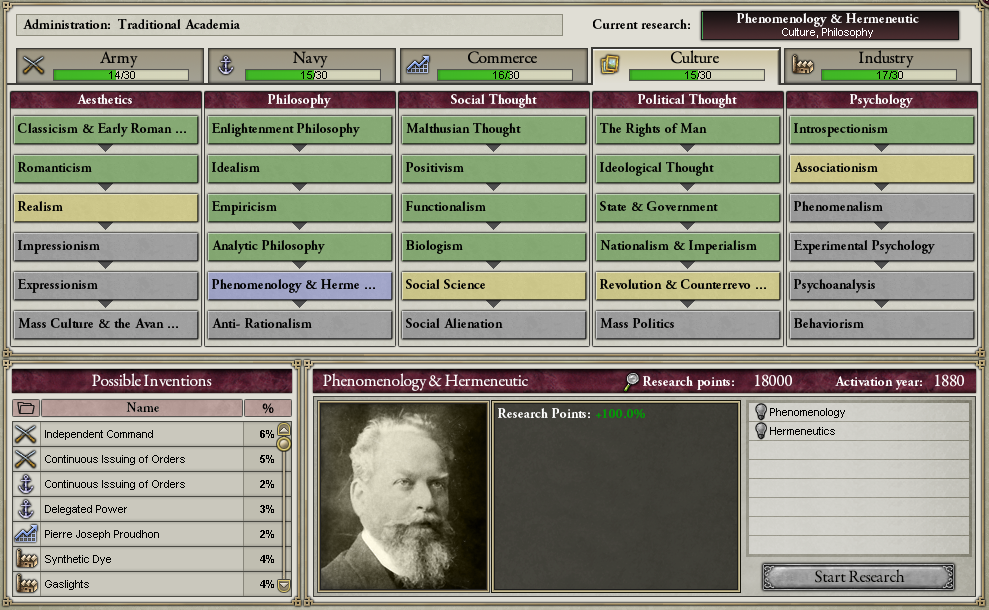
We also adjusted the various taxes to more accurately approximate a flat tax across the Empire.
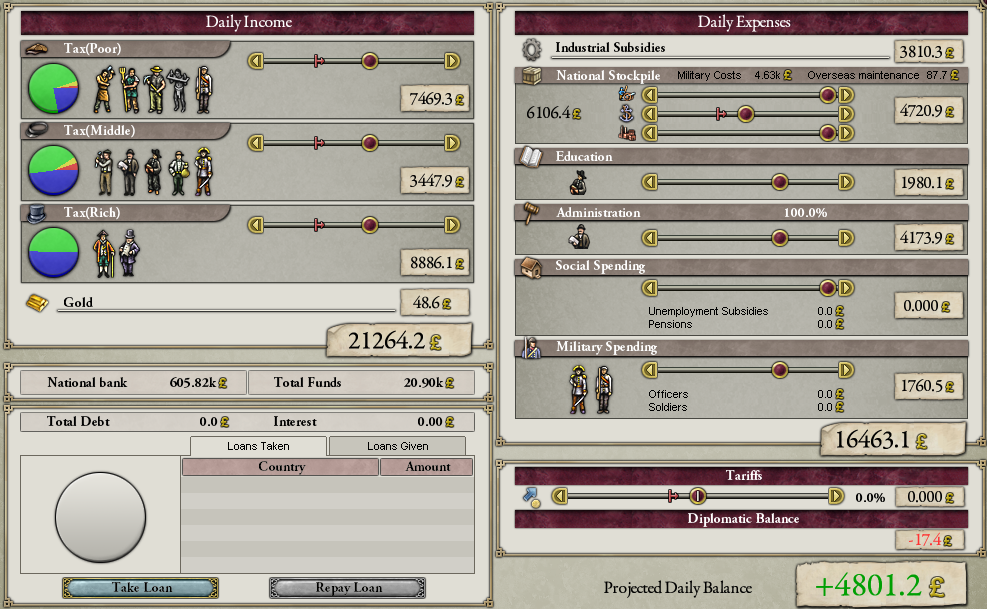
When Ethiopia declared war on Arabia to recover the breakaway lands, they asked for Our assistance. We agreed and sent them money, but did not send the Legions.
When We sent official word that We would favor unemployment subsidies, reactionaries who were already angered at the changed tax rates took to arms. As was typical with these minor revolts, they were put down with ease.
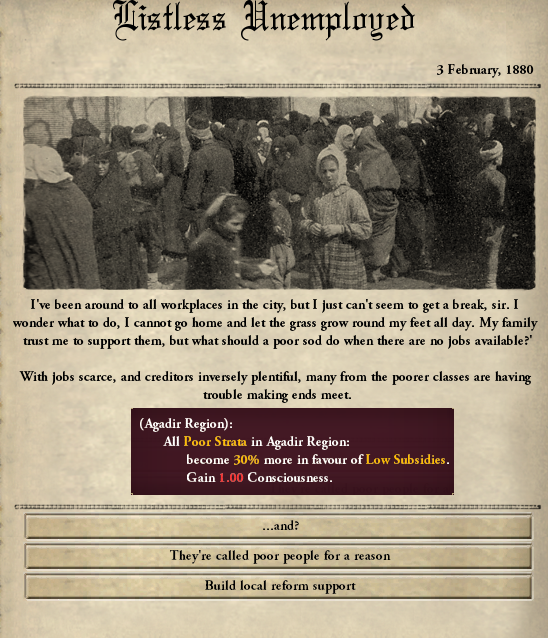
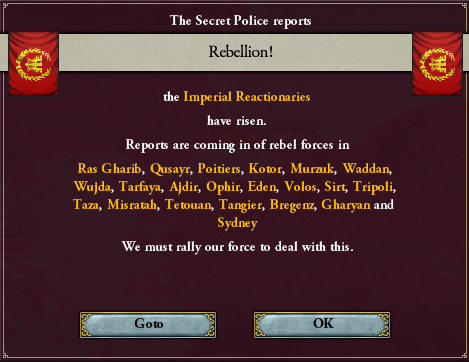
Arabia was also put down with ease, with the peace treaty between Ethiopia and Arabia signed in Blachernae Palace.
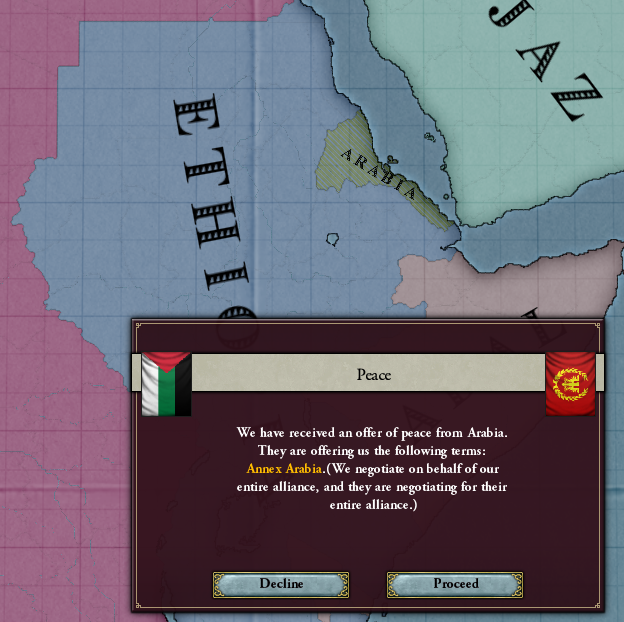
Meanwhile, while Germany’s latest war with Bavaria slowly turned against them, Bavaria did not do much better, as Silesian nationalists were able to force their independence from the war-weary nation.
Again, the philosophy department demonstrated that they had already been developing new ideas.
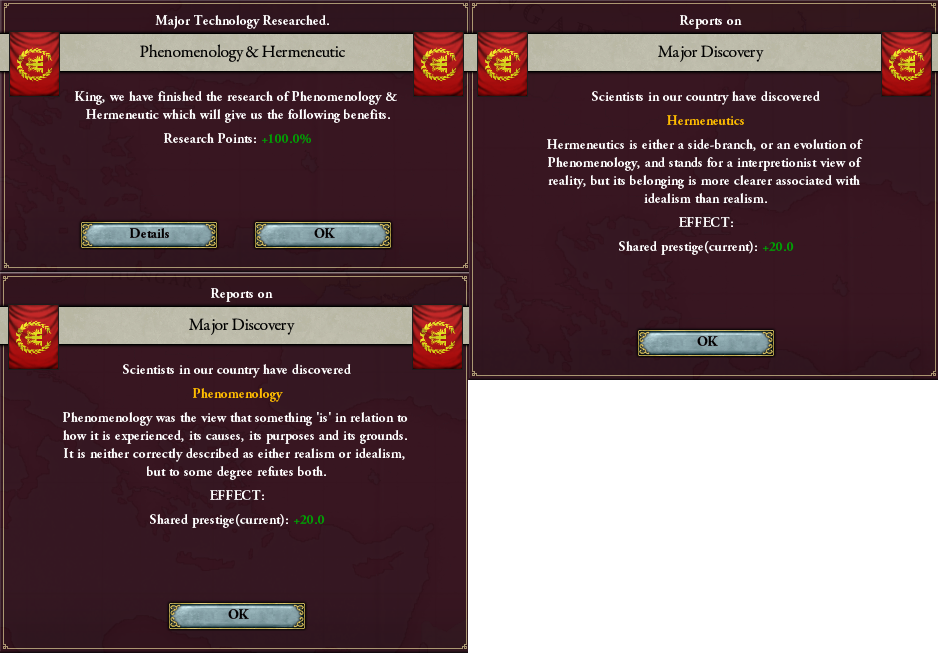
We turned to the Legions and had them develop methods of determining the risks involved in various actions so that they could choose well.
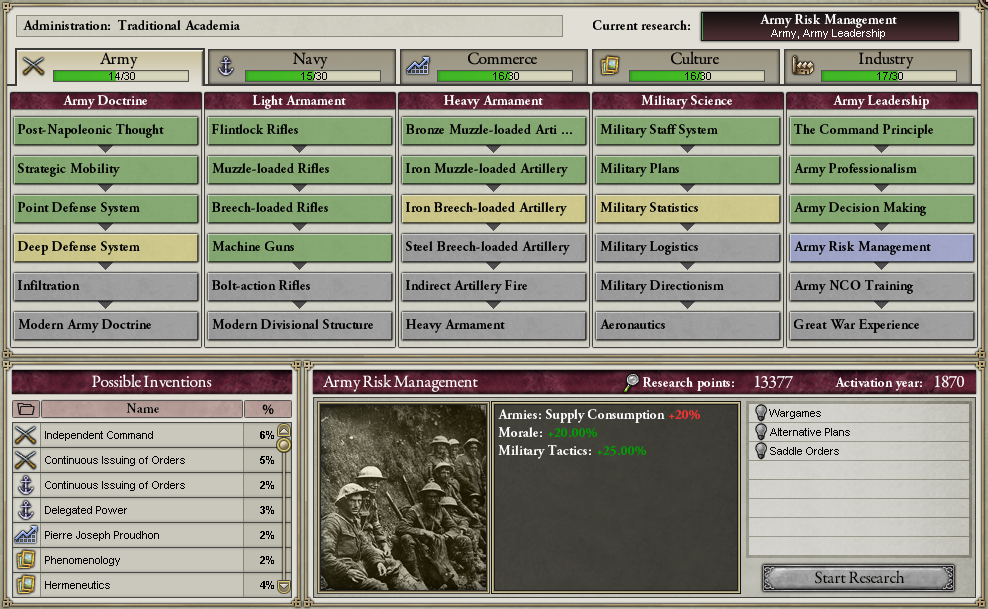
In January of 1881, Poland-Lithuania declared war on Russia in the hopes of humiliating them. It seems their goal was to direct Us at Russia. As they had not consulted Us regarding this foolish plan, We declined to aid them in their war.
Bavarian reactionaries had been displeased at Bavaria’s weakness and in turn rebelled, forcing a new government in March of 1881.
When the military had developed the basic ideas of risk assessment, We sought to alleviate the ongoing coal shortages by having engineers apply steam turbines to the various mines.
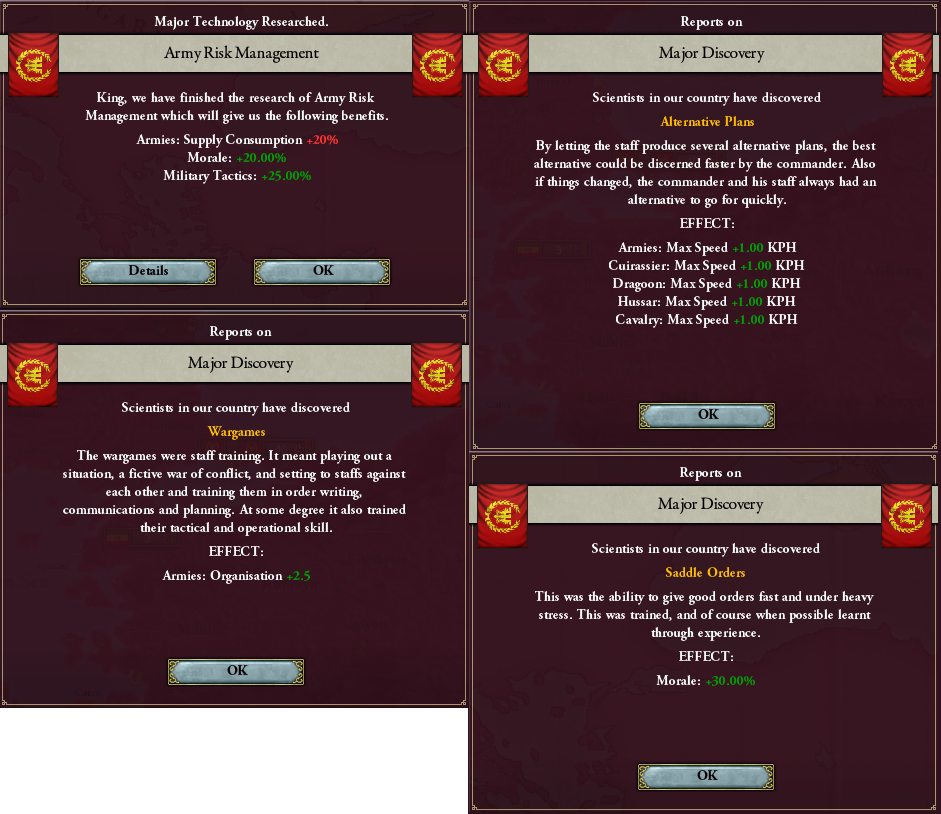
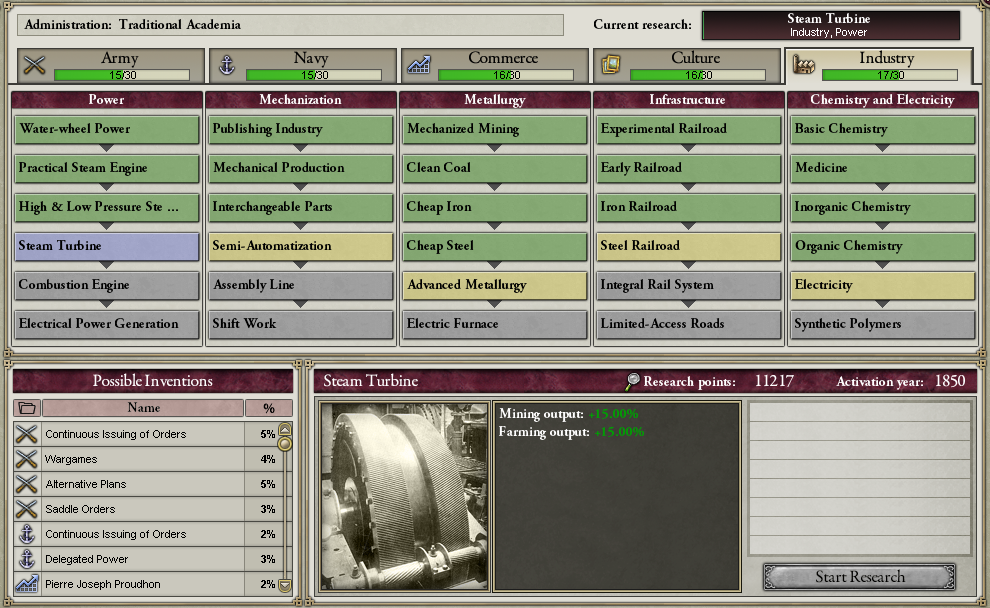
As these were deployed, We continued building industry everywhere where there were excess workers. There were never not excess workers.
The excavation in Egypt continued to bear fruit as a tomb was uncovered, and then the turbines were fully deployed.
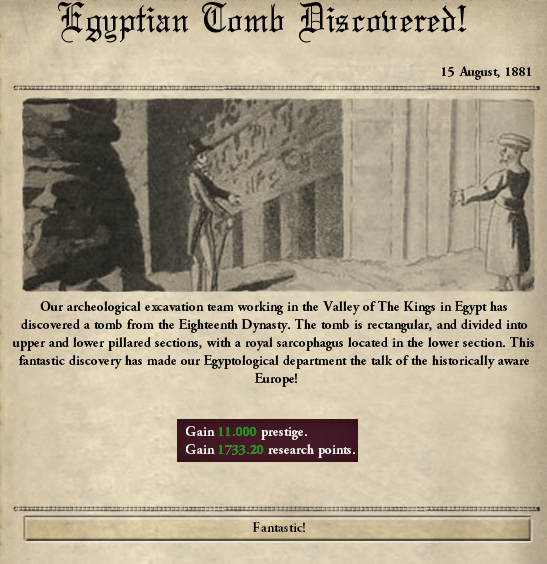
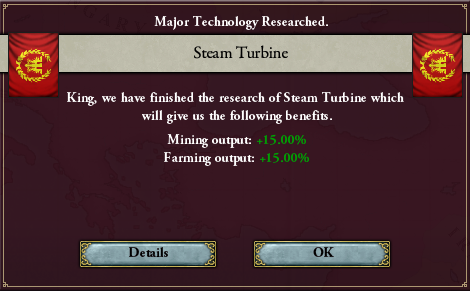
We immediately set the engineers to developing better metallurgical techniques to make more use of the coal we had so that the coal could be applied to more uses.
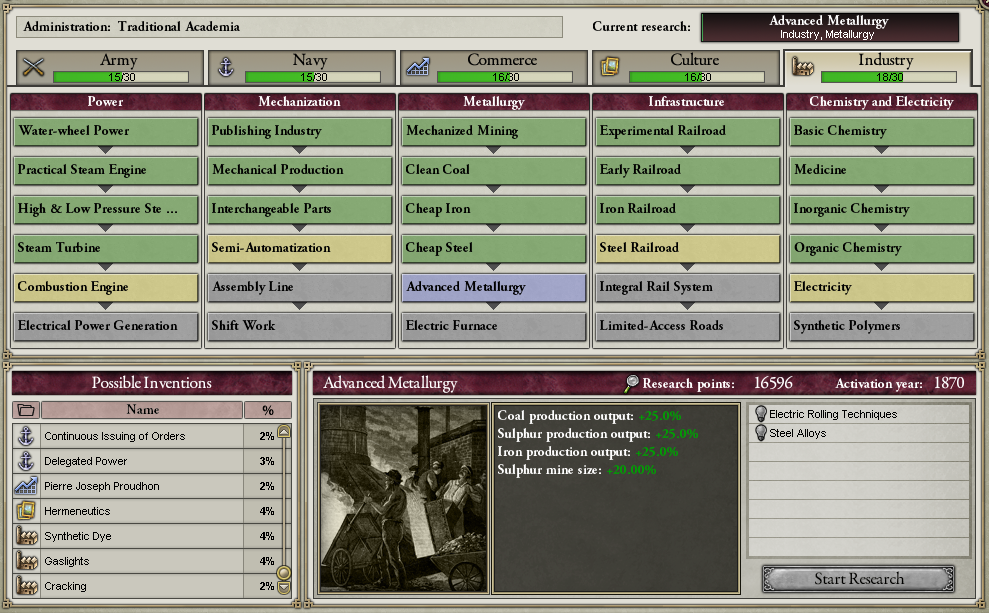
In January of 1882, Bavaria and Germany signed a peace agreement to simply cease hostilities. Ultimately, this meant that Germany won. They had absorbed territory first in Thuringia and then in Brandenburg when pan-nationalists in Werle turned all of the region over. Bavaria in turn had lost territory, first to Silesian nationalists (Silesia shortly after being conquered by Hungary), and then to Hungary directly.
In February, Poland-Lithuania was forced to see the error of their war when they gave Estonia to Russia.
The development of several techniques of creating artificial dyes was a complete transformation of the textile industries. And the improved metallurgical techniques promised to free up enough coal and coal byproducts to keep these factories working.
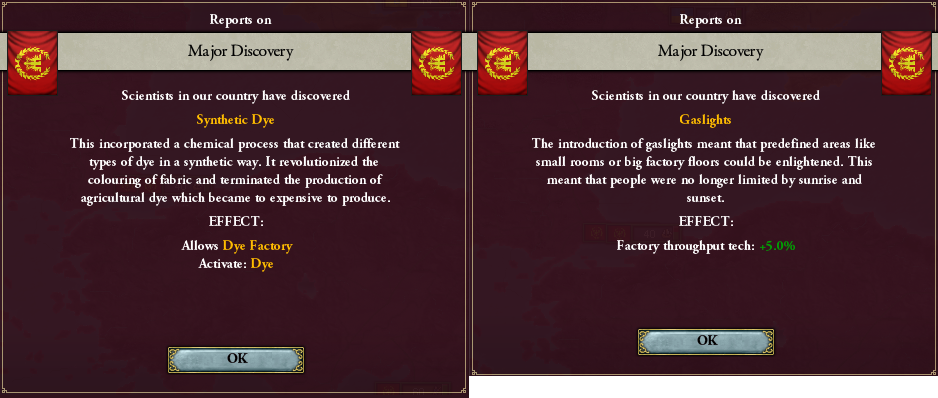
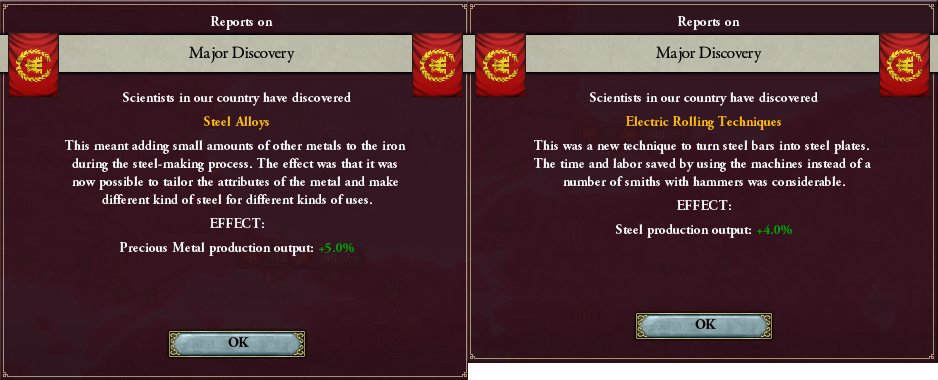
After that was completed, We followed Senator Theodosio’s advice and began laying the legal foundation for a central bank.
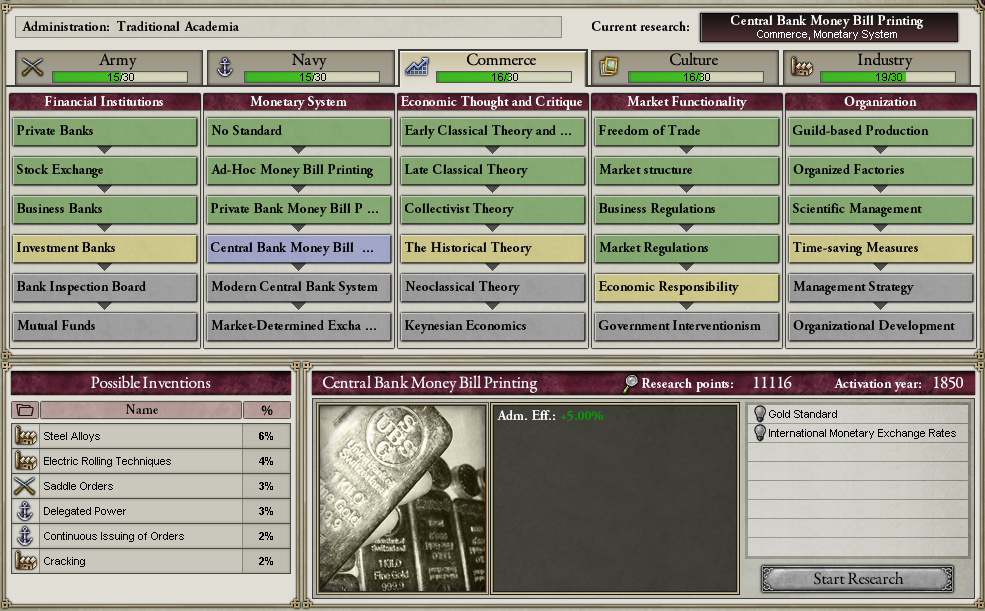
In addition to the advances in coal, other engineers developed means of producing useful products from petroleum oil. The peoples of Baku immediately went to work extracting and selling it, and in the following years other sources were found, greatly enriching the workers of any lands lucky enough to have a supply.
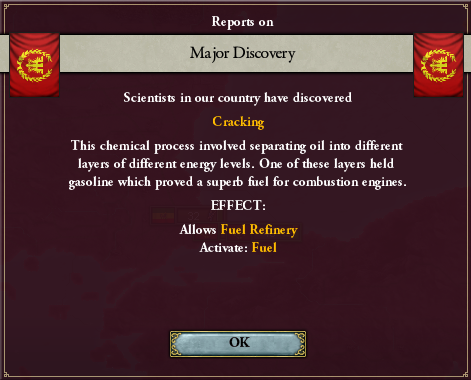
In November of 1882, Bavaria’s government was overthrown again, this time by Jacobins.
In December, the long-feared communist revolt swept over the Empire. There were several larger groups in Gallia and Iberia, but they were swept away with ease. The numerous smaller groups in Africa were harder, if only because of the vast distances between them. It was clear a new legion would be needed for West Africa, so one was recruited.
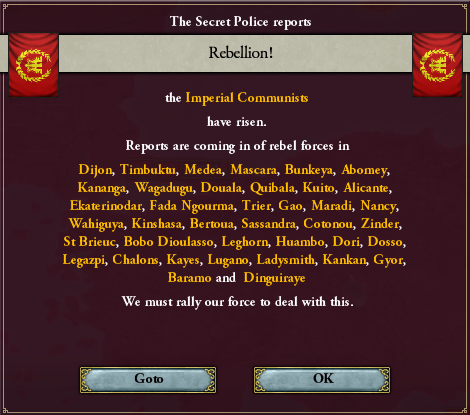
Meanwhile, an island between Java and Sumatra exploded, causing great loss of life in Java.
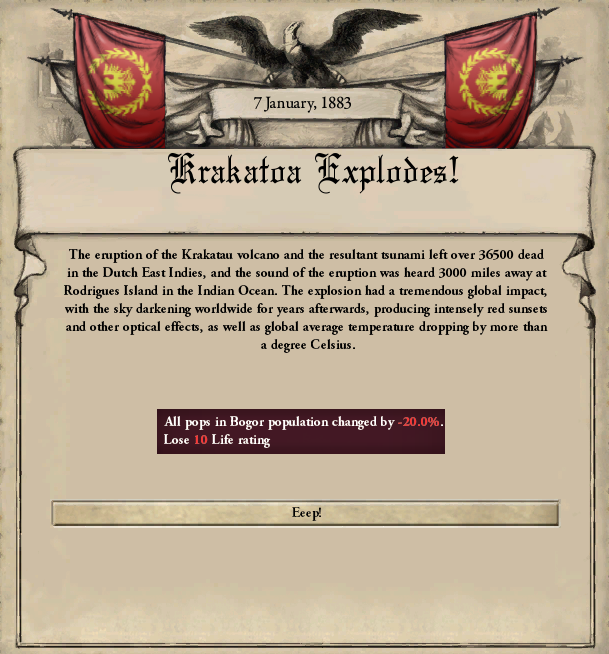
When the legal framework for the central bank had been created, We asked the legions to finally apply statistics to all their work.
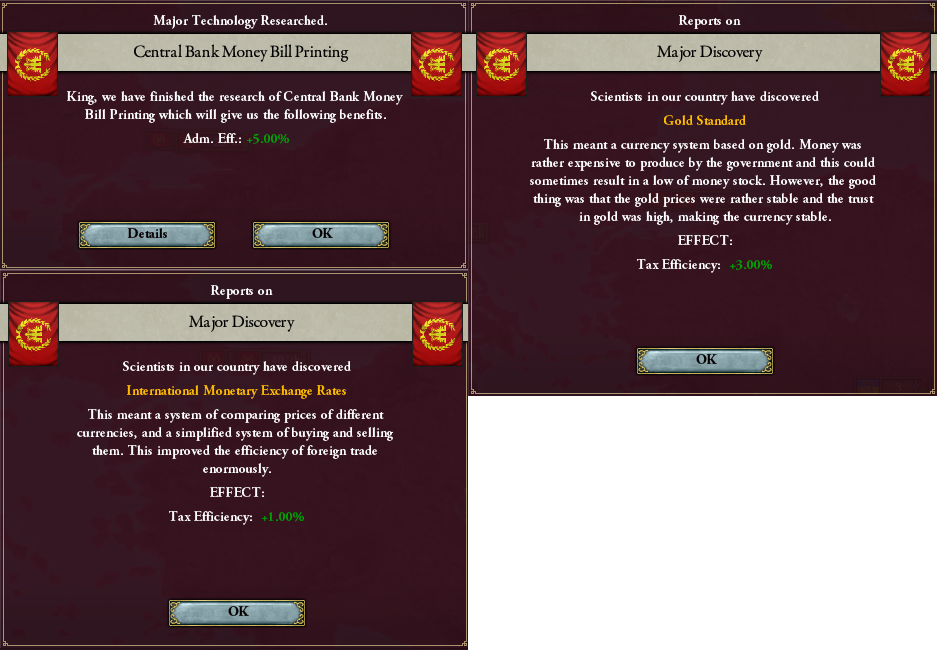
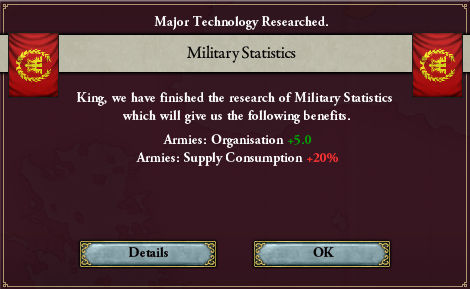
When they had completed that work, We insisted they develop an organized system of logistics, so that they could better be supplied in places such as Africa.
Just before the end of the year in 1883, the communist rebels were completely cleared out. Not much happened through the beginning of 1884. In July, Jacobins grew frustrated with the lack of further political reforms and revolted.
This revolt, as with the Communist one, demonstrated the sheer power of artillery. So when the legions had figured out the basics of a modern logistics system, We set to work having weapons manufacturers provide them with artillery that could be loaded from the breech instead of from the muzzle.
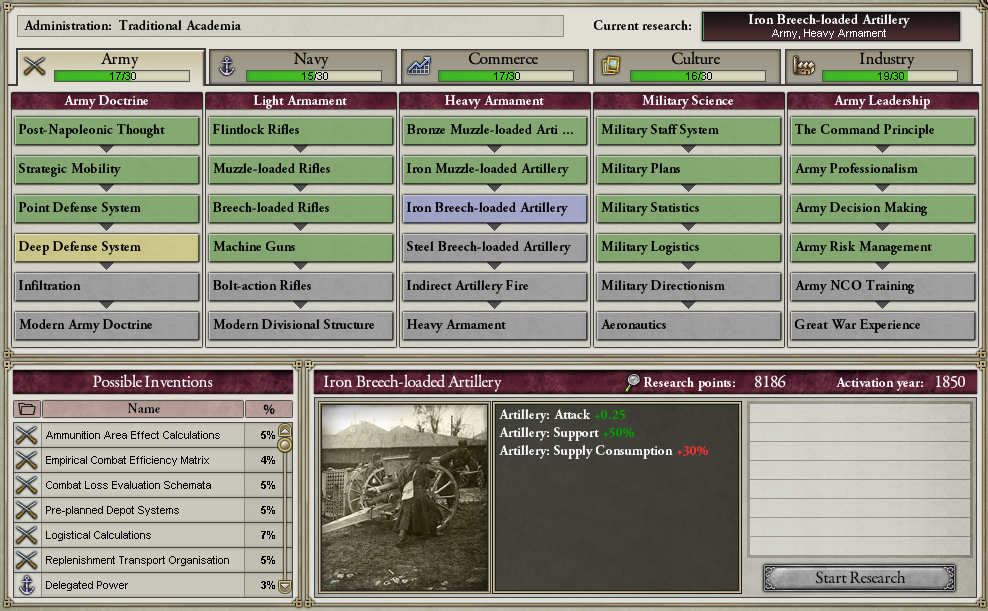
In October, Germany finally overcame Bavaria and completely annexed it. Finally central Europe was becoming organized.
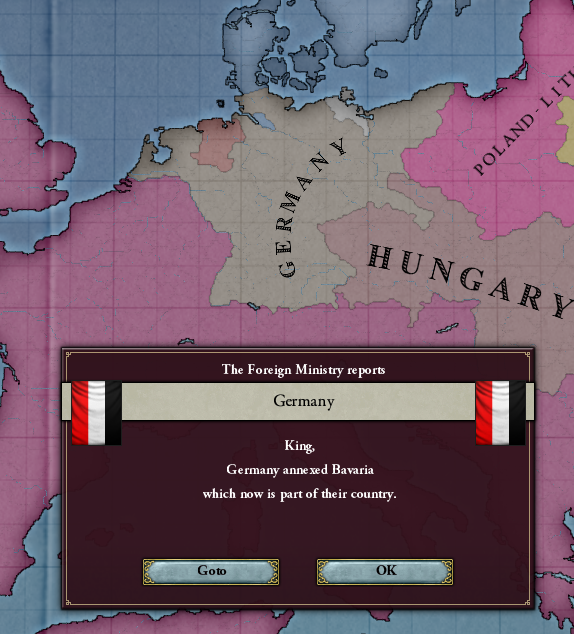
And so we come to 1885. Despite the growth of jobs in the city, a third again as many as there were in 1880, the number of unemployed in the cities of the Empire as tripled, now nearly one hundred thousand souls. Sixty three thousand of those are in Constantinople. While they find day jobs often enough to eat, theirs is a hard and meager existence, and We hope to provide for them in the future. Jobs, primarily, but also subsidies for when there are no jobs.
But sadly, this is the political leanings of the various administrators and town councils. As you can see, no reforms would succeed at this time.
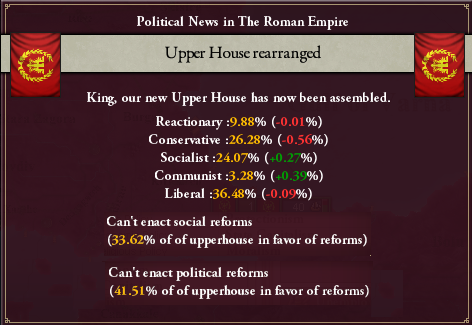
As well, the artillery will soon be supplied. Do the Senators have recommendations for what to research next?
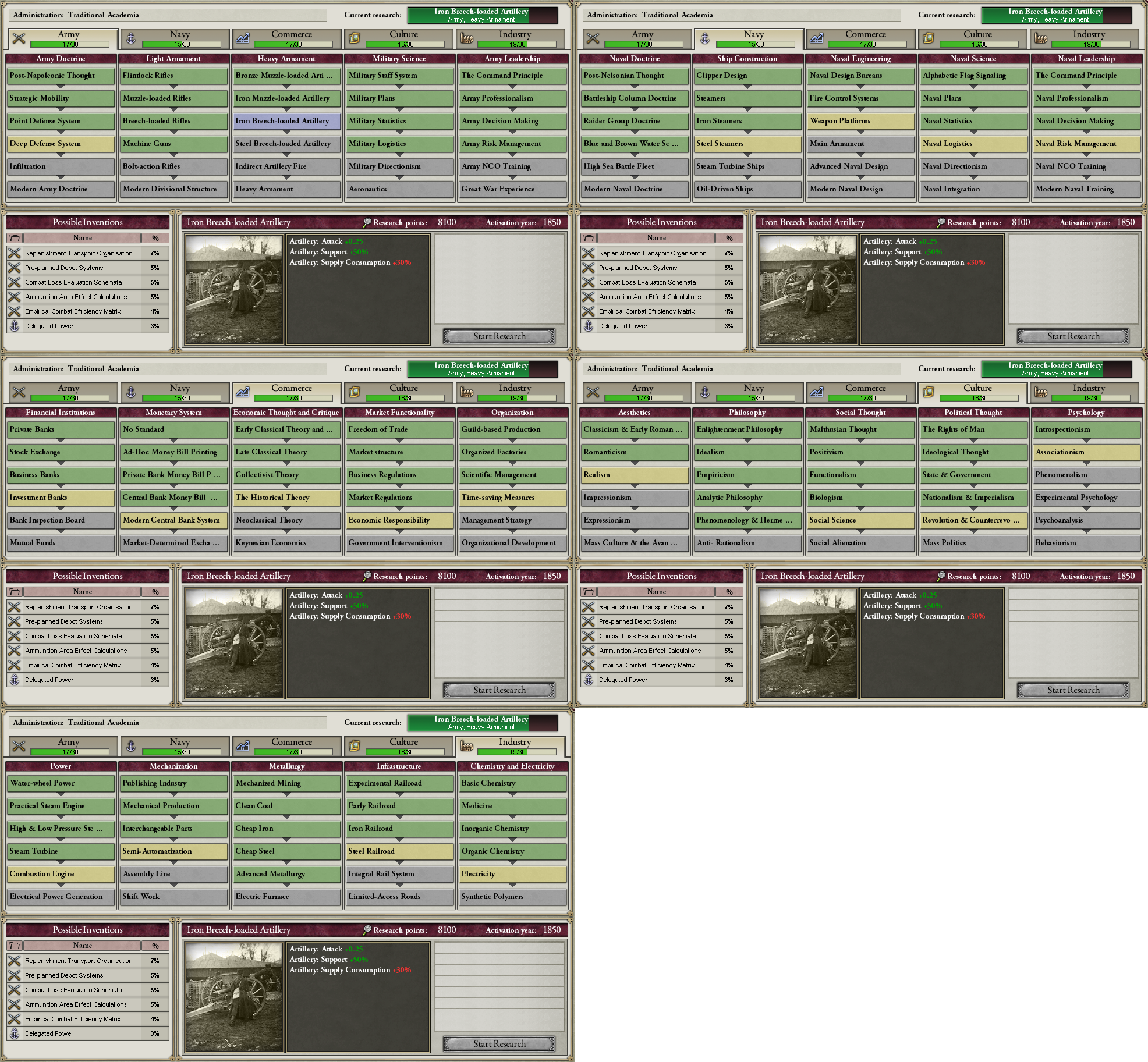
My Empress, my failure to prevent violence by the Communists of the Empire will forever weigh heavy on me. I only hope that you can understand that the rage that boiled over was due to the material conditions most citizens of the Empire live in. Seeing both soldiers and citizens fall has hurt me greatly.
I am hosting an International Congress of Socialists and Communists in the hope that agreements can be reached, and further violence avoided. Not having any standardized line of thought for how The Roman Empire is to achieve Communism was paramount in causing this rebellion. The more violent trends of communism from other nations has spread far, and must be either removed or repurposed.
To this end, I call all members of the Socialist and Communist parties together to discuss and decide on a plan of action and legislation for The Roman Empire. I also encourage all from overseas who can attend to do so, to allow a full diverse discussion. This will be known as The First Internationale. We shall meet in Constantinople in a place, yet to be determined, in one year’s time.
-Nicodemo Theodosio
Alexios was getting old now. He could no longer run like he used to, and his joints ached. His once brilliant hair was now white and gray. He could still shoot a gun really well, but the recoils always dealt extensive pain to his wrist. He could hardly write in his journals now. Yet he still went to the Senate meetings every time, discussing the state of the Empire with his fellow senators, whom he had come to regard as close friends after working with them for decades.
They were discussing something about Germany when suddenly the doors swung open, and in stormed a battalion of Imperial riflemen. At their head was his son, Konstantinos Doukas, named after the Emperor who had driven back the Seljuk Turks from Anatolia over eight hundred years ago. The soldiers stood still at the entrance to the Senate room, while Konstantinos stepped forward. It was then that Alexios realized that Konstantinos was wearing a toga with Imperial purple outlines. Nobody was supposed to wear Imperial purple outlines on their togas…except the Empress. Was Konstantinos…?
“Listen up!” shouted Konstantinos. “You old fools have toiled too long in here in the name of the pretender Veronica Nikephora!”
“PRETENDER?!” shouted a senator, “Who DARES declare the Sacred Empress a pretender?!”
Konstantinos simply motioned to his men and pointed at the senator. Two seconds later, the senator was on the ground, four bullet holes in his head and chest.
The senators shouted and ran for it, but all entrances had been blocked by Konstantinos’s men. The Empress was quickly surrounded with Varangians, but they were all outnumbered.
“It’s no use running from me, your true emperor,” Konstantinos said, “That wench over there in the corner has driven the Empire into the ground, and I intend to fix it. I hereby declare myself Basileus Basileon, King of Kings, Autokrator of the Empire! Under that wench, we have gone in the wrong direction! Look at us! What have we become? The Empire’s a shell of its former self! The people are protesting for more rights and freedoms! We have lost the way of the Romans! I will save our Empire. I will make it great again!”
As some senators began protesting, Konstantinos raised his hand. “I beg you, please hear my words before coming to conclusions. Join me, and I shall reward you greatly. Don’t…well, you get the idea.”
Konstantinos turned to his father, still sitting at his seat despite the gunfire.
“Father, don’t make me do this,” he said, “Please. No longer will we be the marginalized minor branch of the Doukas family that the Cult mocked in that letter many years ago. We’ll have what we always wanted–power. You, as the father of the Sacred Emperor, will be the second most powerful man in the world, not just a lowly senator or minister or soldier. I’m doing what is best for all of us.”
Alexios wasn’t tempted. “Do you really think I want more power? Your grandfather and I have served the Empire for longer than you have lived, boy. I will not abandon it now, while I live. I knew something was wrong about you ever since you came back from that rebel siege. Please, son, drop the delusions of grandeur, and I might intervene during your trial. Killing me will only deny your inheritance and give it to Michael.”
Konstantinos was also unfazed by his father’s declaration. He pulled out a gun and shot his father in the left knee. Pain exploded in Alexios’s left leg, and he went down with a shout. Konstantinos then pointed at the Empress.
“Anybody else want to join me? Please do.”((Outside))
Michael watched in shock as Konstantinos and his men stormed the Palace, the mobs not far behind. He was not found yet.
He turned around just as explosions rippled through Constantinople, causing massive devastation to infrastructure and civilians, and the Hagia Sophia was stormed by an angry mob. He knew the same thing was happening across the Empire as the legions were caught off-guard and the supporters of his brother were taking up arms…
Leonardo Favero kept calm when the pretender burst in and threatened the Empress. Ever since his father’s murder, he had been prepared for anything. Admittedly he had expected the Cult to make a move, but he supposed the Empire was filled with all kinds of whack-jobs. As the pretender, who was apparently the son of Alexios Doukas, made all kinds of wild claims, Leonardo casually inched his way towards the Empress and her Varangian guards. He slipped a small knife he always kept on him out of his sleeve and into his hand, making sure it remained out of sight. If anyone made a move on the Empress, he would intervene. He’d grown quite adept at throwing knives with deadly accuracy. He could make a shot at the ringleader, but his men might start shooting the other senators if he did. It was best to bide his time and wait for the optimum moment to strike.
Konstantinos notices Leonardo moving towards the Empress and hiding something in his hand. Without thinking or even looking more than a second, he shoots Leonardo twice in both wrists and then his knees for good measure.
“Fool! Do you really think you can defy your Emperor?! I know who you are! I knew your father, that senile old man! I won’t have any of your family pulling heroics this time! And don’t think about calling in your guards! They’re quite busy dealing with the hordes of citizens fighting for their rightful ruler! Now hurry up and swear your fealty to me or I will begin the purging! I will spare your precious wench if you do so!”
“Shall we solve this as ‘gentlemen’ would Konstantinos?”, asked Nicodemo Theodosio
He stepped forward, nothing in his hands, only his sword on hisbelt.
“You talk a lot about ‘purity’ and ‘nobility,’ yet you have just shot your own father in the knee for disagreeing with you. Are you not a Christian, Konstantinos? ‘Honour thy Father and thy Mother.’ Is this not one of the holiest of Commandments?”
He slowly drew his sword, and held it in proper dueling stance.
“You would put everything on the line in a mad grasp for power, to enforce your unpopular ideas onto the people of the Empire. You have violated the sanctity of these chambers and of this great city. You have shot your own father, my colleague. Most of all, however, you have threatened the Empress, and by that, all of us. I ask you to show the smallest shred of honour and duel me now, and let God and Fate decide the outcome of this mad coup.”
Senator Columba and his guard are riding for Blachernae along the Theodosian walls his ears ringing from the blast that had blown his horse out from under him
“Right who’s not dead?”
A young officer, an ADC to one of the more senior ones by his uniform.”Most of us your eminence are alive and well though 3 others are badly injured and it looks like Taggart bought it”
“Damn I liked him”
“How much further sir?”
“About another bloody mile and are horses are already exhausted dammit!”
“Sorry senat-“
“Don’t apologise I’m on edge that’s all, we all are. Any send riders back into the city tell whoever’s there we have reached the Gate of Adrianople we should be past it by the time they get the message but I think should is about to become a very loose concept today. I also left a reserve force outside a few miles away I didn’t want to cause a scare by brining them all in at once but now with hindsight of course…Anyway tell them to head for Blachernae we need to protect the Empress.”
“And the senate”
“We can’t be in two places at once dammit”
“What I mean sire, is that all the senators are at Blachernae as well”
“WHAT?”
“For the imperial address to the senate”
“Honestly what is the point of being a senator if nobody tells you where the meetings are happening? Right then tell the men at Constantine’s Forum to pull back to where the Constantinian walls used to be. set up a defensive line there and try to move north if the can. At least establish a large perimeter around the palace.”
“It shall be done Governor.”
“Gonnae just decide what you’re calling me please and get to it.”
“At once my lord.”
“Och jings when it comes to staff the have all enthusiasm but it would be nice if they had some sense as well.”
“Brother!” The voice was all too familiar to him, his younger brother was galloping up on them from behind.
“Gius I thought I told you to get out of the city!”
“No you told me to get my family out of the city.”
“You do realise that if the revolters don’t get you your wife will?”
“No I didn’t”
“Please tell me you at least have something to fight with.”
“Yes I do actually.”
“Finally some good news. Now get back on your horse and find me one.”
“Where is your horse?”
“That depends on what part of it you’re referring to. sigh I liked that horse. Anyway now’s not the time to mourn we need to get to Blachernae now.”
A soldier presents the senator with another horse and he jumps on ignoring the pain in his bloody hands.
“Columba I feel I should tell you something. It’s occurred to me that Kilts are not exactly great for riding in.”
“I know that Gius but it’s easier than a toga. Now COME ON WE HAVE AN EMPIRE TO SAVE”
They rode north for the palace slowing down as they neared. They dismounted and left their horses behind. The front of the palace was filled with an angry crowd demanding blood.
“What do we do know?”
“Keep it down.”
“Sorry”
“Right men up on the wall we’ll head round the back and make sure to keep low Gius you can watch the horses.”
“WHAT!?”
“You’re not getting killed I won’t allow it no keep your head down if you get into trouble improvise.”
Columba and the rest of his men kept low as they moved over to the nearest tower. The door was old and rotten it nearly fell of its rusting hinges when pushed. The went in and clambered up rather than climbed the stairs were crumbling as they moved up. They reached the top and broke out onto the wall. From here he could see the entire city. Fires were burning along the northern part of the city but in the south it seemed quiet where the Forum of Constantine was but otherwise it was impossible to tell what was going on. They moved on trying not to be seen knowing the responsibility they potentially held.
Konstantinos is not amused at the communist’s attempts at speaking. He orders his men to shoot him in the wrists and knees just as he did to Leonardo while he reloads.
“Fool! Do you really think I would listen to you?! You communist! You savages are the reason we are a failing Empire! God abandoned me to the mob of peasants years ago, so why should I listen to Him now (though I still am a Christian when in a good mood and wish to purge all heretics and heathens living in the Empire once I ascend the throne)? Especially now! And my father…he and his own father are traitors, selling out the Empire to advance their own interests! They must be punished!
I assure you, my ideas are quite popular. Otherwise how could I have the mobs looting and pillaging at my command outside?”
Leonardo Favero crumpled to the ground. The shots at his wrists had gone wide, as was apt to happen with pistols at such a range, but one of the shots at his knees had gone through the meat of his leg. The wound wasn’t fatal and most likely wouldn’t cripple him, but he wouldn’t be walking from some time. He did his best to cover the wound with fabric from his clothes and cursed silently to himself.
((Konstantinos))
Konstantinos fails to reload his gun and throws it away. “Stupid piece of metal!” He thinks to himself, “You idiot, why did you go for the wrists of all places?!”
He looks over to where his father lay but instead sees nothing. A trail of blood leads to an open window nearby.
“GUARDS!” he shouts, “Find my father and brother and bring their bodies to me!”((Alexios))
Alexios limped as far as he could from the carnage, blood trailing behind him. He had to stop the bleeding or else Konstantinos’s men would find him quickly.
He found a fountain which had been partially wrecked by the explosion of a bomb nearby and plunged into it, trying to wash away as much of the blood as possible. That done, he wrapped his chest with thick cloth torn from his robe to stop the bleeding. It wasn’t much, but at least he was less likely to get an infection. He imagined what his father had gone through during the 1854 Cult attack before he and the Lancers intervened. Who would intervene for him now in his own situation?((Michael))
Michael hid behind a corner as one of Konstantinos’s men approached to investigate a thrown rock. As the large Spartan man rounded the corner, Michael sank a dagger into his chest and covered his mouth before breaking his neck quickly and silently. Michael put on the guard’s clothes and took his weapons, a rifle, pistol, and sword.
Now he had to find Konstantinos and stop him.
((Nicodemo))
After my small speech, Konstantinos signals his men, and I was shot twice, once in the right arm, once in the right leg. I collapse to the ground, sword clattering as it hits the elaborate marble of the floor. I inch myself back against the desks for the Socialists and Communists, supporting myself with my unhurt arm, and force myself onto my feet.“All you have convinced me of, Konstantinos, is something I thought of once, long ago. Political power comes out of the barrel of a gun. History is nothing but stories of violence used to obtain power. I rejected this, in hope we of the Empire could do better. That we could learn from our mistakes. Have we not learned of the fallacy of things like The Year of Four Emperors? These squabbles for power do nothing but harm the Empire.
You dismiss me, because I am a Communist. You accuse me of being a savage, I would remind you of the true definition of that word: ‘fierce, violent, and uncontrolled.’ Who among us here most matches that description? I would not say myself.
You could kill me now, this is true, it will gain you nothing however, but one less bullet. The cause I have fought for, and indeed that millions of others’ do, will not be interrupted by my death.
I know you will try to kill me. Shoot, coward, you will only kill a man!”
Columba let go of the rope as he landed in the shadow of the walls behind Blachernae he was covered in his own bloodwhich had seeped through the makeshift bandages he was wearing. There were bigger things to worry about now however he could hear gunfire from the other side of the palace and it was getting louder.
“Are you alright Senator?” Columba looked round to see one of his guards looking at him worriedly.
“Yes I’m fine.” though he did not feel it but he couldn’t worry about that now he had to change the subject
“When we were climbing down I thought I saw to men slip out of the throne room”
“I saw them to your eminence I think they were senators”
“We need to find them friend or foe they could tell us what’s been happening in here. Right lets go. Keep your revolvers and rifles aside for now silent weapons only. If you need to shoot then shoot but only if you have to get it”
“Got it”
“Got it”
“Get it”
“Good. Right lets go” 60 men in kilts with guns, Claymores, shields and other weapons snuck into the palace wile up on the wall 10 watched the city both within and without them praying for reinforcements.In the forum of Constantine Donal MacDonald rode forward to confront the seething crowd they were surrounded he knew men were stationed at every entrance and on the collonade reinforced now by some form the city guard who had come along with Varangains who were not to drunk to stand rifles and Gatling guns pointed at the crowd who he knew would be killed in their hundreds if they tried to stand. A silence fell over the crowed as they realised their situation.
“Listen to me all of you. I don’t know why you are gathered here and in such a fashion but as I’m sure you can see you are surrounded, outgunned and I’m sure you’ll all agree with me that it would not be in the best interests of any involved for hundreds of us to get killed for no reason.” Officers around the forum repeated his words for those who could not hear.
A man on a horse who appeared to be the leader of the crowed rode forwards his mouth twisted in a sneer that managed to show hate and contempt at the same time.
“We are here for a reason. To save the Empire!” the crowed behind roared in agreement.
“By getting yourselves killed?”
“By giving the Empire to those who know how to run it. By giving it to those who care about it we are the people of the Empire and we have made our voice heard!”
“Your choice? Since when did you choose who managed the Empire? Who gave you the right to do what God alone can do? To ordain who is to guard over our lands and ourselves.”
The crowd was conspicuously silent but here were no jeers or whistles. They were listening at least. When another man emerged from the crowds
“Yes and what has God’s choice done to defend us. Even as the English struggle through the swamps of the Amazon; even as the Africans scratch a meager living from the grit they call soil; even as the Germanic Barbarians brood in their forests; even as the Caledonians ponder life on their mountain tops; as the slaves freeze and then burn on the steppes of Ukraine and Siberia, as the Oriental wallow in their rice paddies, as the Arabs ride their camels through the desert and the Indians their elephants through the monsoons they are all plotting our destruction!”
The cheer from the crowd was loud but not as loud as it had been before.
“And this is how you would defend your Empire. By overthrowing the senate which has defended our rights since ancient times? By deposing the Empress who has for nearly 50 years now brought us peace and prosperity? Your method of defense would split our Empire in two and as we killed each other the world would watch, wait and when it was done they would turn on us like vultures and pick us clean! You would save the Empire by destroying it from within. After which it would be destroyed from without. If you want to defend the Empire then follow the Empress as we have all done. For many of us all our lives! Some of you may remember the dark days of old when the palace went silent and our Empire was leaderless. We were without guidance; without unity; without hope; and what happened? Our Empire drifted to the edge of collapse not though the conspiracies of foreign spies or kings. But because we ourselves were without a leader and without strength not in our bodies but in our souls! Do you want to return the Empire to those days? Because of you are you are certainly going the right way about it! Only this time it would be even worse as we would be not standing in the streets watching the palace for any sign of life or light within. But we would be burning that palace and killing each other as our enemies from outside descended upon our walls! Yu want to defend our Empire? Our nation? Our home? then stand with me; against the true traitors within this realm; Stand with the Senate who defend your rights to day as the Senate of old did so in the old city; stand with the Church which has brought us grace and salvation now for near 2 millennia; and most of all stand with the Empress; who is sworn to serve you; guide you and die if need be to protect you!”
A cheer rose from the crowd quiet and scattered at first but grew in size and confidence like wildfire until the square was full of it.
The traitor on his horse was visibly furious as were those who had gathered round him clearly the most loyal of the mad fire brands who had started this. They were armed to the teeth as well.
“You are a fool.” he spat at Donal. “You’re all fools!” he shouted to the crowds “It is too late we have already won. We would not be here if it were not so.”
“You may have won I do not know but I have a duty. A duty to the Empire; a duty to the Empress and a duty to my commander and friend and so I shall stand against you. No matter what.”
“Even if it means your death it seems”
The traitor had a gun in his hand before Donal could blink all he could do was calmly draw his basket hilted claymore, a gift from his Irish mother and hold his foe’s gaze.
“To paraphrase a song my mother once sang to me: Tonight I man the bhearna bhaoil in the Empire’s cause come woe or weal, through cannons roar and rifles peal seo libh canaig amhrán na bhfiann!”
Without thinking Donal put his heels to his horse and charged the traitors who did the same. It was one man against at least twenty but he did not care he had a duty to fulfill and by God he would do it. Before he had gone a yard though a series of deafening cracks thundered around the forum and his would be opponents fell to the ground dead or soon to be dead. Donal looked arounf and behind him smoke surrounded several of the soldiers behind him and closest to him on the colonnade who were slipning another cartridge into their rifles and closing over the breaches even as he recovered form the shock.
“He looked over the crowd now standing silently watching him or the bodies on the ground between himself and the crowd.
“That’s enough blood for all of us for today. Now go home and let us forget this happened.”
Slowly the crowed shuffled and then in first ones and twos then larger groups began to cautiously apporach the solders blocking the exists.
“Let them through!” Donal shouted
Soon a trickle became a flood and the crowd was rapidly disappearing.
“Good show there sir. I speak for everyone when I say I enjoyed the speech.”
It was the voice of Constantine MacAlpine; his ADC and long time friend.
“I did what I had to do and it wasn’t that great somebody had to do something or it would have been an absolute blood bath.”
“So what now?”
Donal thought for a moment. The south of the city seemed secure but what about the north Columba would probably have not yet reached the palace but what about the patriarch and Hagia Sophia?
“Everyone on the West and North sides of the forum will follow me to the Blachernae. You take everyone else and head for Hagia Sophia.”
“At once” Constantine galloped off to make it so.
Donal surveyed the scene around him his eyes drawn to the corpses in front of him. Looked like the senator had been right. Sometimes you can’t avoid blood being spilled. Though, Donal thought, the senator would probably be relieved that it was not as bad as it could have been. He tuned his back on the grizzly scene and rode north for the palace. Both hoping and dreading about what he would find there.
((Konstantinos))
Theodosio,
I know that you, and not me, are the savage for two reasons. First, as a communist you wish to overthrow the aristocracy and our ancestral privileges. Second, as a Spaniard you are not a true Roman and as such are not entitled to citizenship. Remember the last time we tried extending Romanitas to non-Romans? Constitutio Antoniniana, issued by Emperor Caracalla in the year of our Lord 212 during the later days of the Old Empire, extended citizenship to all free men and women of the Old Empire. Before that, one of the main ways of becoming an Imperial citizen was to enlist in the Imperial legions. With this edict in place, the army became less attractive to young men, and recruitment dropped, allowing barbarians to rampage across the Rhine and Danube and end the Old Empire for good. The same is happening today. Citizenship is extended to most in the New Empire by birth ((what’s our citizenship policy?)), and our legions are being overwhelmed by the constant rebellions we are facing. It is time we ended birthright citizenship and made service in the army the primary route to citizenship–at least for pure Roman men, the only people who count.
Savage…what an interesting word. I am not a savage, as I am a Roman and therefore by definition am a civilized man. The same cannot be said about you, Spaniard. May I remind you of the original definition of the word ‘barbarian’ in response? Barbarian: “that which does not speak Greek.” “One not a Greek.” “One living outside the pale of the Empire and its civilization, applied especially to the northern nations that overthrew the Old Empire (and may I remind you that one of the barbarian groups, the Visigoths, which sacked Rome eventually settled in Spain?).” “One outside the pale of Christian civilization.” Note that I am quoting from the most recent edition of the dictionary issued by the Imperial University of Constantinople.
No, I will not kill you, not now. It is true that your death would not mean much to me. However, I can give you a fate worse than death for calling me a ‘coward’ as an example to the rest of what happens should you not join me…Konstantinos shoots Theodosio in the neck with his second revolver, severing his spinal cord but leaving him alive.
((Alexios))
Alexios stumbled through the hallways of Blachernae, past the bodies of mutilated and violated servants and the desecrated paintings on the walls. He needed a weapon, something to defend himself with…
There was a shout from behind him, and he turned to see one of Konstantinos’s men pointing a pistol at his head.
Alexios dived behind a table as the gun went off, the shot going wide and tearing through the wall behind Alexios. The senator remembered his time in the Lancers. He put all of his weight behind the table and charged, ramming the table straight into the traitor’s chest. One punch and kick and the man was down. Alexios took the revolver and dagger on the soldier and limped away.
Now to find a telephone or telegram to call for help…He found the Imperial Communications office strangely untouched but abandoned. He made his way to the nearest working telegraph (as he did not know how to use the telephone) and typed out a message to any Imperial military bases he knew.
“CONSTANTINOPLE STORMED BY A REACTIONARY PRETENDER STOP BLACHERNAE COMPRIMISED STOP SENATE AND PATRIARCH AND EMPRESS AND ROYAL FAMILY HELD HOSTAGE BY PRETENDER STOP ALL GARRISONS OVERWHELMED STOP SEND BACKUP AS SOON AS POSSIBLE STOP.”
He waited for five long minutes. Then a response came:
“ALL LEGIONS BUSY PUTTING DOWN REGIONAL REBELLIONS STOP MASS REBELLIONS BREAKING OUT IN MAJOR CITIES STOP COMMUNISTS AND SOCIALISTS AND NON-GREEKS BEING PURGED BY MOBS STOP IMPERIAL AIRSHIP LA FRANCE IS EN ROUTE TO CONSTANTINOPLE FROM ROME STOP ETA SIX HOURS STOP.”
Now he had to hold out until the airship arrived.((Michael))
Michael continued to sneak around the palace. He found two guards standing sentry in front of a doorway and decided to investigate.
He walked up to them and said, “Excuse me, what are you doing? Konstantinos will not appreciate you idleness.”
“Comrade, inside are the hostages,” replied a guard.
“What hostages?”
“You don’t know? The Patriarch and the Empress’s husband and children and relatives are all in there. We intend to execute them all once this is all over.”
“Oh, right, all of this killing was getting to my head.” Michael laughed, somewhat nervously. “Well, good luck holding them!”
He left the guards and walked away, thinking about how he would break out the hostages.((From the journal of General Ioannes of the Athenian Lancers))
I must have been asleep, for certainly if I had been fully awake I must have noticed the approach of such a remarkable place. In the gloom the courtyard looked of considerable size, and as several dark ways led from it under great round arches, it perhaps seemed bigger than it really is. I have not yet been able to see it by daylight. And I was completely alone; my men were nowhere to be seen. The driver assured me that the Lancers were off investigating a peculiar occurrence in a nearby village.
When the caleche stopped, the driver jumped down and held out his hand to assist me to alight. Again I could not but notice his prodigious strength. His hand actually seemed like a steel vice that could have crushed mine if he had chosen. Then he took my traps, and placed them on the ground beside me as I stood close to a great door, old and studded with large iron nails, and set in a projecting doorway of massive stone. I could see even in the dim light that the stone was massively carved, but that the carving had been much worn by time and weather. As I stood, the driver jumped again into his seat and shook the reins. The horses started forward, and trap and all disappeared down one of the dark openings.
I stood in silence where I was, for I did not know what to do. Of bell or knocker there was no sign. Through these frowning walls and dark window openings it was not likely that my voice could penetrate. The time I waited seemed endless, and I felt doubts and fears crowding upon me. What sort of place had I come to, and among what kind of people? What sort of grim adventure was it on which I had embarked? Was this a customary incident in the life of an Imperial soldier? Mara would not like that. Soldier, for just before leaving Constantinople I got word that my promotion was successful, and I am now a full-blown member of the General Staff (of course, I would be promoted after I returned from this mission)! I began to rub my eyes and pinch myself to see if I were awake. It all seemed like a horrible nightmare to me, and I expected that I should suddenly awake, and find myself at home, with the dawn struggling in through the windows, as I had now and again felt in the morning after a day of overwork. But my flesh answered the pinching test, and my eyes were not to be deceived. I was indeed awake and among the Carpathians. All I could do now was to be patient, and to wait the coming of morning.
Just as I had come to this conclusion I heard a heavy step approaching behind the great door, and saw through the chinks the gleam of a coming light. Then there was the sound of rattling chains and the clanking of massive bolts drawn back. A key was turned with the loud grating noise of long disuse, and the great door swung back.
Within, stood a tall old man, clean shaven save for a long white moustache, and clad in black from head to foot, without a single speck of colour about him anywhere. He held in his hand an antique silver lamp, in which the flame burned without a chimney or globe of any kind, throwing long quivering shadows as it flickered in the draught of the open door. The old man motioned me in with his right hand with a courtly gesture, saying in excellent Greek, but with a strange intonation.
“Welcome to my house! Enter freely and of your own free will!” He made no motion of stepping to meet me, but stood like a statue, as though his gesture of welcome had fixed him into stone. The instant, however, that I had stepped over the threshold, he moved impulsively forward, and holding out his hand grasped mine with a strength which made me wince, an effect which was not lessened by the fact that it seemed cold as ice, more like the hand of a dead than a living man. Again he said.
“Welcome to my house! Enter freely. Go safely, and leave something of the happiness you bring!” The strength of the handshake was so much akin to that which I had noticed in the driver, whose face I had not seen, that for a moment I doubted if it were not the same person to whom I was speaking. So to make sure, I said interrogatively, “Count Dracula?”
He bowed in a courtly was as he replied, “I am Dracula, and I bid you welcome, Mr. Dalassenos, to my house. Come in, the night air is chill, and you must need to eat and rest.”As he was speaking, he put the lamp on a bracket on the wall, and stepping out, took my luggage. He had carried it in before I could forestall him. I protested, but he insisted.
“Nay, sir, you are my guest. It is late, and my people are not available. Let me see to your comfort myself.”He insisted on carrying my traps along the passage, and then up a great winding stair, and along another great passage, on whose stone floor our steps rang heavily. At the end of this he threw open a heavy door, and I rejoiced to see within a well-lit room in which a table was spread for supper, and on whose mighty hearth a great fire of logs, freshly replenished, flamed and flared.
The Count halted, putting down my bags, closed the door, and crossing the room, opened another door, which led into a small octagonal room lit by a single lamp, and seemingly without a window of any sort. Passing through this, he opened another door, and motioned me to enter. It was a welcome sight. For here was a great bedroom well lighted and warmed with another log fire, also added to but lately, for the top logs were fresh, which sent a hollow roar up the wide chimney. The Count himself left my luggage inside and withdrew, saying, before he closed the door.
“You will need, after your journey, to refresh yourself by making your toilet. I trust you will find all you wish. When you are ready, come into the other room, where you will find your supper prepared.”
The light and warmth and the Count’s courteous welcome seemed to have dissipated all my doubts and fears. Having then reached my normal state, I discovered that I was half famished with hunger. So making a hasty toilet, I went into the other room.
I found supper already laid out. My host, who stood on one side of the great fireplace, leaning against the stonework, made a graceful wave of his hand to the table, and said,
“I pray you, be seated and sup how you please. You will I trust, excuse me that I do not join you, but I have dined already, and I do not sup.”
I handed to him the sealed letter which the General Staff. He opened it and read it gravely. Then, with a charming smile, he handed it to me to read. One passage of it, at least, gave me a thrill of pleasure.
“I must regret that an attack of gout, from which malady I am a constant sufferer, forbids absolutely any travelling on my part for some time to come. But I am happy to say I can send a sufficient substitute, one in whom I have every possible confidence. He is an experienced man, full of energy and talent in his own way, and of a very faithful disposition. He is discreet and silent, and has grown into manhood in my service. He shall be ready to attend on you when you will during his stay, and shall take your instructions in all matters. He shall be able to sort out the business involving the Cult of Chernobog.”
The count himself came forward and took off the cover of a dish, and I fell to at once on an excellent roast chicken. This, with some cheese and a salad and a bottle of old tokay, of which I had two glasses, was my supper. During the time I was eating it the Count asked me many question as to my journey, and I told him by degrees all I had experienced.
By this time I had finished my supper, and by my host’s desire had drawn up a chair by the fire and begun to smoke a cigar which he offered me, at the same time excusing himself that he did not smoke. I had now an opportunity of observing him, and found him of a very marked physiognomy.
His face was a strong, a very strong, aquiline, with high bridge of the thin nose and peculiarly arched nostrils, with lofty domed forehead, and hair growing scantily round the temples but profusely elsewhere. His eyebrows were very massive, almost meeting over the nose, and with bushy hair that seemed to curl in its own profusion. The mouth, so far as I could see it under the heavy moustache, was fixed and rather cruel-looking, with peculiarly sharp white teeth. These protruded over the lips, whose remarkable ruddiness showed astonishing vitality in a man of his years. For the rest, his ears were pale, and at the tops extremely pointed. The chin was broad and strong, and the cheeks firm though thin. The general effect was one of extraordinary pallor.
Hitherto I had noticed the backs of his hands as they lay on his knees in the firelight, and they had seemed rather white and fine. But seeing them now close to me, I could not but notice that they were rather coarse, broad, with squat fingers. Strange to say, there were hairs in the centre of the palm. The nails were long and fine, and cut to a sharp point. As the Count leaned over me and his hands touched me, I could not repress a shudder. It may have been that his breath was rank, but a horrible feeling of nausea came over me, which, do what I would, I could not conceal.
The Count, evidently noticing it, drew back. And with a grim sort of smile, which showed more than he had yet done his protruberant teeth, sat himself down again on his own side of the fireplace. We were both silent for a while, and as I looked towards the window I saw the first dim streak of the coming dawn. There seemed a strange stillness over everything. But as I listened, I heard as if from down below in the valley the howling of many wolves. The Count’s eyes gleamed, and he said.
“Listen to them, the children of the night. What music they make!” Seeing, I suppose, some expression in my face strange to him, he added,”Ah, sir, you dwellers in the city cannot enter into the feelings of the hunter.” Then he rose and said.
“But you must be tired. Your bedroom is all ready, and tomorrow you shall sleep as late as you will. I have to be away till the afternoon, so sleep well and dream well!” With a courteous bow, he opened for me himself the door to the octagonal room, and I entered my bedroom.
I am all in a sea of wonders. I doubt. I fear. I think strange things, which I dare not confess to my own soul. God keep me, if only for the sake of those dear to me!The next day…
It is again early morning, but I have rested and enjoyed the last twenty-four hours. I slept till late in the day, and awoke of my own accord. When I had dressed myself I went into the room where we had supped, and found a cold breakfast laid out, with coffee kept hot by the pot being placed on the hearth. There was a card on the table, on which was written–I have to be absent for a while. Do not wait for me.
D.I set to and enjoyed a hearty meal. When I had done, I looked for a bell, so that I might let the servants know I had finished, but I could not find one. There are certainly odd deficiencies in the house, considering the extraordinary evidences of wealth which are round me. The table service is of gold, and so beautifully wrought that it must be of immense value. The curtains and upholstery of the chairs and sofas and the hangings of my bed are of the costliest and most beautiful fabrics, and must have been of fabulous value when they were made, for they are centuries old, though in excellent order. I saw something like them in Vienna, but they were worn and frayed and moth-eaten. But still in none of the rooms is there a mirror. There is not even a toilet glass on my table, and I had to get the little shaving glass from my bag before I could either shave or brush my hair. I have not yet seen a servant anywhere, or heard a sound near the castle except the howling of wolves. Some time after I had finished my meal, I do not know whether to call it breakfast of dinner, for it was between five and six o’clock when I had it, I looked about for something to read, for I did not like to go about the castle until I had asked the Count’s permission. There was absolutely nothing in the room, book, newspaper, or even writing materials, so I opened another door in the room and found a sort of library. The door opposite mine I tried, but found locked.
In the library I found, to my great delight, a vast number of Greek books, whole shelves full of them, and bound volumes of magazines and newspapers. A table in the center was littered with Greek magazines and newspapers, though none of them were of very recent date. The books were of the most varied kind, history, geography, politics, political economy, botany, geology, law, all relating to the Empire and Imperial life and customs and manners. There were even such books of reference as the Constaninople Directory, the “Green” and “Blue” books, Phokas’s Almanac, the Army and Navy Lists, and it somehow gladdened my heart to see it, the Law List.
Whilst I was looking at the books, the door opened, and the Count entered. He saluted me in a hearty way, and hoped that I had had a good night’s rest. Then he went on.
“I am glad you found your way in here, for I am sure there is much that will interest you. These companions,” and he laid his hand on some of the books, “have been good friends to me, and for some years past, ever since I had the idea of going to Constantinople, have given me many, many hours of pleasure. Through them I have come to know your great Empire, and to know her is to love her. I long to go through the crowded streets of your mighty Constantinople, to be in the midst of the whirl and rush of humanity, to share its life, its change, its death, and all that makes it what it is. But alas! As yet I only know your tongue through books. To you, my friend, I look that I know it to speak.”
“But, Count,” I said, “You know and speak Greek thoroughly!” He bowed gravely.
“I thank you, my friend, for your all too-flattering estimate, but yet I fear that I am but a little way on the road I would travel. True, I know the grammar and the words, but yet I know not how to speak them.
“Indeed,” I said, “You speak excellently.”
“Not so,” he answered. “Well, I know that, did I move and speak in your Constantinople, none there are who would not know me for a stranger. That is not enough for me. Here I am noble. I am a Boyar. The common people know me, and I am master. But a stranger in a strange land, he is no one. Men know him not, and to know not is to care not for. I am content if I am like the rest, so that no man stops if he sees me, or pauses in his speaking if he hears my words, ‘Ha, ha! A stranger!’ I have been so long master that I would be master still, or at least that none other should be master of me. You shall, I trust, rest here with me a while, so that by our talking I may learn the Imperial intonation. And I would that you tell me when I make error, even of the smallest, in my speaking. I am sorry that I had to be away so long today, but you will, I know forgive one who has so many important affairs in hand.” Of course I said all I could about being willing, and asked if I might come into that room when I chose. He answered, “Yes, certainly,” and added.
“You may go anywhere you wish in the castle, except where the doors are locked, where of course you will not wish to go. There is reason that all things are as they are, and did you see with my eyes and know with my knowledge, you would perhaps better understand.” I said I was sure of this, and then he went on.
“We are in Transylvania, and Transylvania is not the Empire. Our ways are not your ways, and there shall be to you many strange things. Nay, from what you have told me of your experiences already, you know something of what strange things there may be.”
This led to much conversation, and as it was evident that he wanted to talk, if only for talking’s sake, I asked him many questions regarding things that had already happened to me or come within my notice. Sometimes he sheered off the subject, or turned the conversation by pretending not to understand, but generally he answered all I asked most frankly. Then as time went on, and I had got somewhat bolder, I asked him of some of the strange things of the preceding night, as for instance, why the coachman went to the places where he had seen the blue flames. He then explained to me that it was commonly believed that on a certain night of the year, last night, in fact, when all evil spirits are supposed to have unchecked sway, a blue flame is seen over any place where treasure has been concealed.
“That treasure has been hidden,” he went on, “in the region through which you came last night, there can be but little doubt. For it was the ground fought over for centuries by the Wallachian, the Saxon, and the Imperial. Why, there is hardly a foot of soil in all this region that has not been enriched by the blood of men, patriots or invaders. In the old days there were stirring times, when the Austrian and the Hungarian came up in hordes, and the patriots went out to meet them, men and women, the aged and the children too, and waited their coming on the rocks above the passes, that they might sweep destruction on them with their artificial avalanches. When the invader was triumphant he found but little, for whatever there was had been sheltered in the friendly soil.”
“But how,” said I, “can it have remained so long undiscovered, when there is a sure index to it if men will but take the trouble to look? “The Count smiled, and as his lips ran back over his gums, the long, sharp, canine teeth showed out strangely. He answered.
“Because your peasant is at heart a coward and a fool! Those flames only appear on one night, and on that night no man of this land will, if he can help it, stir without his doors. And, dear sir, even if he did he would not know what to do. Why, even the peasant that you tell me of who marked the place of the flame would not know where to look in daylight even for his own work. Even you would not, I dare be sworn, be able to find these places again?”
“There you are right,” I said. “I know no more than the dead where even to look for them.” Then we drifted into other matters.
“Come,” he said at last, “tell me of London and of the house which you have procured for me.” With an apology for my remissness, I went into my own room to get the papers from my bag. Whilst I was placing them in order I heard a rattling of china and silver in the next room, and as I passed through, noticed that the table had been cleared and the lamp lit, for it was by this time deep into the dark. The lamps were also lit in the study or library, and I found the Count lying on the sofa, reading, of all things in the world, a Greek Kyrillos’s Guide. When I came in he cleared the books and papers from the table, and with him I went into plans and deeds and figures of all sorts. He was interested in everything, and asked me a myriad questions about the place and its surroundings. He clearly had studied beforehand all he could get on the subject of the neighborhood, for he evidently at the end knew very much more than I did. When I remarked this, he answered.
We went thoroughly into the business of the Cult. I asked him questions regarding pagan Slavs who performed human sacrifice. He informed me that he was a true Christian and would never work with such barbarians. After all, he said, he was a boyar, and he did not work with such savages. However, through all of this interrogating I felt as if he was hiding something…
Presently, with an excuse, he left me, asking me to pull my papers together. He was some little time away, and I began to look at some of the books around me. One was an atlas, which I found opened naturally to the Empire, as if that map had been much used. On looking at it I found in certain places little rings marked, and on examining these I noticed that one was near Constantinople near Blachernae. The other two were the Hagia Sophia and the Senate building.
It was the better part of an hour when the Count returned. “Aha!” he said. “Still at your books? Good! But you must not work always. Come! I am informed that your supper is ready.” He took my arm, and we went into the next room, where I found an excellent supper ready on the table. The Count again excused himself, as he had dined out on his being away from home. But he sat as on the previous night, and chatted whilst I ate. After supper I smoked, as on the last evening, and the Count stayed with me, chatting and asking questions on every conceivable subject, hour after hour. I felt that it was getting very late indeed, but I did not say anything, for I felt under obligation to meet my host’s wishes in every way. I was not sleepy, as the long sleep yesterday had fortified me, but I could not help experiencing that chill which comes over one at the coming of the dawn, which is like, in its way, the turn of the tide. They say that people who are near death die generally at the change to dawn or at the turn of the tide. Anyone who has when tired, and tied as it were to his post, experienced this change in the atmosphere can well believe it. All at once we heard the crow of the cock coming up with preternatural shrillness through the clear morning air.
Count Dracula, jumping to his feet, said, “Why there is the morning again! How remiss I am to let you stay up so long. I may not forget how time flies by us,” and with a courtly bow, he quickly left me.
I went into my room and drew the curtains, but there was little to notice. My window opened into the courtyard, all I could see was the warm grey of quickening sky. So I pulled the curtains again, and have written of this day.The next day.
–I began to fear as I wrote in this book that I was getting too diffuse. But now I am glad that I went into detail from the first, for there is something so strange about this place and all in it that I cannot but feel uneasy. I wish I were safe out of it, or that I had never come. It may be that this strange night existence is telling on me, but would that that were all! If there were any one to talk to I could bear it, but there is no one. I have only the Count to speak with, and he– I fear I am myself the only living soul within the place. Let me be prosaiac so far as facts can be. It will help me to bear up, and imagination must not run riot with me. If it does I am lost. Let me say at once how I stand, or seem to.
I only slept a few hours when I went to bed, and feeling that I could not sleep any more, got up. I had hung my shaving glass by the window, and was just beginning to shave. Suddenly I felt a hand on my shoulder, and heard the Count’s voice saying to me, “Good morning.” I started, for it amazed me that I had not seen him, since the reflection of the glass covered the whole room behind me. In starting I had cut myself slightly, but did not notice it at the moment. Having answered the Count’s salutation, I turned to the glass again to see how I had been mistaken. This time there could be no error, for the man was close to me, and I could see him over my shoulder. But there was no reflection of him in the mirror! The whole room behind me was displayed, but there was no sign of a man in it, except myself.
This was startling, and coming on the top of so many strange things, was beginning to increase that vague feeling of uneasiness which I always have when the Count is near. But at the instant I saw that the cut had bled a little, and the blood was trickling over my chin. I laid down the razor, turning as I did so half round to look for some sticking plaster. When the Count saw my face, his eyes blazed with a sort of demoniac fury, and he suddenly made a grab at my throat. I drew away and his hand touched the string of beads which held the crucifix. It made an instant change in him, for the fury passed so quickly that I could hardly believe that it was ever there.
“Take care,” he said, “take care how you cut yourself. It is more dangerous that you think in this country.” Then seizing the shaving glass, he went on, “And this is the wretched thing that has done the mischief. It is a foul bauble of man’s vanity. Away with it!” And opening the window with one wrench of his terrible hand, he flung out the glass, which was shattered into a thousand pieces on the stones of the courtyard far below. Then he withdrew without a word. It is very annoying, for I do not see how I am to shave, unless in my watch-case or the bottom of the shaving pot, which is fortunately of metal.
When I went into the dining room, breakfast was prepared, but I could not find the Count anywhere. So I breakfasted alone. It is strange that as yet I have not seen the Count eat or drink. He must be a very peculiar man! After breakfast I did a little exploring in the castle. I went out on the stairs, and found a room looking towards the South.
The view was magnificent, and from where I stood there was every opportunity of seeing it. The castle is on the very edge of a terrific precipice. A stone falling from the window would fall a thousand feet without touching anything! As far as the eye can reach is a sea of green tree tops, with occasionally a deep rift where there is a chasm. Here and there are silver threads where the rivers wind in deep gorges through the forests.
But I am not in heart to describe beauty, for when I had seen the view I explored further. Doors, doors, doors everywhere, and all locked and bolted. In no place save from the windows in the castle walls is there an available exit. The castle is a veritable prison, and I am a prisoner!
I can only hope my fellow Lancers can find me before something happens to me.
Ambrosio stared in shock at the corpse of his dead father and the body of the paralyzed socialist. He had came unarmed, not expecting a revolution. He heard bursts of gunfire happening outside Blachernae, he knew that the troops he had brought along were in deep trouble. He did not dare to speak as the lunatic reactionary pretender had already killed his father when his father shouted at the pretender for being a false emperor. Diederick looked very wary and had his hand in his pocket. Could it be that his younger brother had brought a weapon to the Senate meeting?
Senator Columba and his guard were slowly working their way through the labyrinthine servants passages of the palace covered with dirt, sweat, tears and blood that may or may not have been theirs. So far those they had come across they had been able to silence with sword or knife but as they moved onward the same question was on everyone’s mind: How long before they had to shoot? With their rifles it would be hard to miss in the halls of the palace and their revolvers were quicker though less accurate but ammunition for both was low the hadn’t planned on a fight when they had first left Retia for the city and after that everything had happened so quickly nobody had remembered to bring extra cartridges though they had been able to pick up odiments of armour fromm old wall displays that though were undoubtedly antique were better than the long kilts and bunnets (bonnets) they were wearing. They moved through a doorway and into a hallway they had left the servants passages but where exactly were they?
“Looks clear sir there’s an arch with steps just across the hall to the left.”
“Alright quickly men on 3; 1…2…3!”
They ran across the hall and through the arch.
“Everyone here?”
“Yes sir.”
“Right lets go and keep low”
They climbed the stairs moving closer to the ground as the reached the top till they were sliding across the ground. They reached the top where the arch opened onto a courtyard surrounded by a cloister which protruded from the larger buildings around it and was filled with dust from and rubble from what he had to assume was a bomb. It must have been how the man in the courtyard had managed to safely climb down from an open window above them. Henry-Martini rifles in had the guards slowly moved up until they lined the top of the stairs; slowly they moved forward eyes scanning the surrounding walls for any hint of movement. Taking a chance Columba dropped his rifle and darted over to the fountain only to find old Alexios Doukas lying by the fountain. He seemed to recall the senator had been in a similiar situation just over 30 years ago now. Columba hadn’t event been born then but he had always held Alexios in high regard for his actions back then. Now it seemed the burden lay with him this time round.
“Alexios”
“Who…?”
Neither daring to raise their voice above a whisper
“It’s me Columba what’s happening? Where is everyone? Where are we?” by this time his men had gathered in the courtyard and were checking windows and doors trying to look for a quiet way out
“Slow down man and let me speak”
“Sorry”
“That open window is the great hall where my son and his followers are holding the Empress and Senate hostage.”
“How many men did they have?”
“You can see from the Windows.”
“Right we’ll get you patched up best we can and then get moving”
“O’Donnell get over hear.”
“Governor”
“What can you do for him?”
“I managed to grab a first aid kit somewhere along the line. It’s basic but better than nothing.”
“Get to it we won’t be here long”
“McKechnie, MacKenzie get up on the cloister see those window take a peak but make sure your not seen”
“Right you are sir.”
“On it”
“Wilson find a door that isn’t locked that might lead to the hall quickly”
“Right you are sir. Uhm if you don’t mind sir, I was rather wondering if I could take Fairfax and Carstairs along with me you haven’t happened to have seen them have you?”
“No I haven’t. where are the?”
“HELLO!”
“Shhh keep it down you two!”
Fairfax and Carstairs were two of the few English people in the group and where decent chaps as they would say with rather magnificent moustaches but their posh Fighter-command style accents were unbearable
“Ohh terribly sorry old chap.”
“Didn’t mean anything by it old bean.”
“Aye,aye well Wilson wants you two so get to it.”
“Right you are!”
“Abslolutely spiffing idea”
“Keep it down(!)”
“Sorry.”
Wilson and the trouser clad tits walked off to find a suitable means of egress.
“O’Donnell how are you doing?”
“Just a while longer”
“We don’t have a while. When we move off I’ll get MacIntosh, MacGuffin and Dingwall to stay behind.”
He handed a revolver to Alexios”
“Here you go I hope you don’t have to use it but you might have to.”
“Thank you and be careful”
“You’ll pull through you did last time.”
“It was not my son I was fighting last time”
“No it wasn’t.”
“Uhm excuse me sir but I believe I may have found a suitable exit.”
“Excellent Wilson let’s get going. McKechnie, MacKenzie you two, MacDuff, and O’Neil stay behind and watch the windows but keep your heads down if we come though the doors feel free to shoot but watch who your shooting.”
“Aye sir.”
“Right let’s go.”The senator and his remaining guardsmen set off back into the palace leaving 8 of their comrades and an injured Senator behind.
((Konstantinos))
“Bring the hostages before me!” Konstantinos ordered.
Some soldiers entered the room, dragging the various members of the royal family as well as the Ecumenical Patriarch into the room. Some gasps and murmurs from the senators were heard.
“You see, false Empress, I will decide the fates of your husband, children, and religious head. I shall show mercy and spare them should you give up the throne to me,” said Konstantinos, “Otherwise…well, you all know by this point what I’m going to do. Senators, I will also be giving you one last chance; join me, or die.”
When no senator stepped forward to defect, the Empress said, “You underestimate the power of the Senate. They are utterly loyal to Us. We shall never give up the throne, especially to madmen like you. May you rot in Hell or any afterlife you believe in for eternity, traitor of the Empire.”
Konstantinos pretended not to hear the Empress’s words. “Very well, then. Guards…”
He motioned to his guards. The soldiers raised their rifles and aimed at the hostages’ heads…All of a sudden, there was the sound of whirling blades in the air. Throwing knives materialized out of nowhere and embedded themselves in the chests of the soldiers, who all went down quickly. Black-clad assassins emerged from the windows, ceiling, and basically every unexpected location for someone to enter by and descended on the soldiers silently and swiftly.
“Nobody kills the Patriarch or Empress but the Cult!” shouted a Slavic-looking man with an eyepatch as he kicked open the main doors and drew a long sword of Russian size.
Konstantinos’s eyes widened. “YOU?! THE CULT?!” he screamed.
Then he regained his calmness. “Excellent, my mortal enemy has arrived. Time to die, Iosef Ignatieff, heathen scum!”
Konstantinos drew his own sword and lunged at the Cult leader.
((Michael))
Michael hid behind a corner as he heard footsteps approach. As the enemies rounded the corner, he lunged with his dagger at…Alexios?
He barely stopped himself from slashing open his father’s throat. Alexios and the men accompanying him were equally shocked.
“Father?”
“Son?”
They embraced each other. “Thank heavens you’re alive!” both of them said.
Alexios explained to Michael how backup was arriving soon in the form of the airship La France, while Michael explained how Konstantinos was holding the royal family and the Patriarch hostage.
Together they worked out a plan to take down Konstantinos…
Columba and his men were sneaking through the palace trying to be quiet but their footsteps seemed to echo unbearably loud around the wide halls.
“Your eminence I think I saw movement.”
“Where”
“In the corridor parallel to us. Off to the left.”
“Right then. Everyone ready. We’ll jump them at the next junction we need to be quick here so on my mark: GO!”
They ran along the hall around the next corner to find themselves face to face with.
“Don’t shoot! Lefebvre you’re a sight for sore eyes how did you get in here”
Marcel Lefebvre was the commander of the Senator’s Swiss Guard company and a die-hard traditionalist and loyalist to the Empire
“We heard your summons and ran like the wind we reached the city walls at the north end. Believe it or not not one person was watching the gates or that side of the palace they were, and last I heard still are, on the other side and things are starting to get bloody out there.”
“You think so?”
“We heard gunfire just as we came into the palace so I think it’s safe to say things are getting bloody.”
“Did you bring anyone else?”
“Just my own company the others are outside keeping out of sight for now.”
“Good, they might be needed. The uniform’s a bit conspicuous”
“We didn’t have time to change. We came here expecting a birthday parade not a civil war. When we heard we dropped everything and ran but this is worse than we imagined.”
“You and me both pal.”
“SENATOR DOWN”
Marcel tried to grab the senator and throw him aside but before he could Columba had done the same to him. He turned round face to face with one of Konstantinos’ traitors mere yards away but before anyone could blink he went down only to be replaced my two men in black who turned their guns on the senator. Both men went down in a hail of lead but not before they had managed to get a shot of each one of which hit Columba in his left had. It went straight through his wrist and the center boss on his shield before clattering off the ceremonial helmet of one of the Swiss Guards. It was all over in the blink of and eye.
Everyone was staring at the corpses in disbelief.
“The cult here?” said one of the guards
“Either something bigger than we imagined is going on. Or Konstantinos and these savages who bring insult to the word “barbarian” just so happened to revolt on the same day. Let us pray it is the latter and they ave been doing us the favor of killing each other.”
“Look Out!”
One of the cultists was not dead yet. He raised his gun but all he got for his trouble was another overdose of .303 lead cure-alls. His gun fired though and the bullet ricochet off the ceiling and into Columba’s foot this time.
“AAACH Jings, criven, help me bob!” The senator hopping up and down on one leg in a manner most unbecoming of a senator
“Pardon me for asking senator” It was Marcel picking himself up off the floor and dusting himself down “but which of us exactly is meant to be the bodyguard here?”
“You’re quite right Marcel. Stupid of me but if anyone has any bandages I need them now.”
“It doesn’t look to serious those were small caliber rounds and the missed the main blood vessels.”
The guard spent the next several minutes wrapping bandages and other not so bandagey looking materials around Columba’s wrist and foot
“Right that ought to do for now. Can you walk senator.”
“I can limp”
Marcel stepped forward “Best to be hoped for given the circumstances. Now if you don’t mind we need to move”
“Quite right commander let’s go men.”
Columba moved forward as dignified and upright as it was possible for a man in his position to be.
Only to slip in the blood of the traitors and land face first in it.
“I’m alright!” he said now covered completely in blood. “But somebody do something about those bodies they’re a serious trip hazard”
A few minuets later the motley group set off again. keeping clear of the patch of floor that was stained red and had a “Danger wet floor” sign in the middle of it swords, armour and guns resplendent in the light coming through the high windows. Led by a limping blood drenched man using a Swiss halberd for a walking stick. The moved quickly now making no attempt at stealth. The entire palace would have heard those gun shots, the throne room was only a few more turns away and with more than 150 men it would be hard for anyone to overpower them now.
“It looks as though the traitors have indeed been killing each other.” Marcel announced to no one in particular.
“That means less for us to kill” was the senators reply “but we get the glory all the same!” he shouted to these behind him and was met by a loud cheer no one hard the conclusion he muttered to himself. “or shame, depending on how this turns out.”
The fabric Leonardo had used to cover his wound was soaked red and continued to bleed. He tried to keep pressure on it, but his hands were starting to feel cold and numb. Just looking at all the blood made him dizzy. He usually didn’t faint at such a sight, and perhaps it wasn’t the sight at all. He could be lightheaded from the loss of blood. And was the room moving too? How strange.
The chaos going on in the room was a hazy blur. People screaming about coups, cults, and communism just gave Leonardo a booming headache. Why was this happening? Why was any of this happening? Rome was the greatest empire on Earth and had proven such from its domination of the world for centuries. Yet despite that, people kept trying to tear it down from within. Why could no one be content with all that the Empire and Empress had given them? The Empress could spoonfeed them with a silver spoon and they’d still demand more.
Sudden clarity hit Leonardo like the headache plaguing his brain. There would never be an end to this madness, not while the Empire continued on its current path. No matter how much wealth and prosperity the Empire provided its people, they would always demand more. More rights, more freedom, and ultimately as a result, more bloodshed. The people of this world were greedy. They all wanted to be emperors and empresses, to live in splendour and decide the fate of the world. An empire ruled by self-indulged peasants who envisioned themselves as professional statesmen was doomed to fall. If their desires were indulged, even in the slightest, they would push for more until their greed drove the Empire to its knees. They could never be trusted to put the needs of the Empire first. Only the Empress and her predecessors had proven their ability to rule. Only under the Empress’s guidance could the Empire truly flourish. If the people succeeded in siphoning away her power to fulfill their near-sighted wants and needs, the Empire would be doomed. The only solution was to keep them from ever doing that. The people had to be kept down for their own good so that those most qualified to govern could provide everything for them. The people would not like it, but if they wanted food to eat and a place to sleep at night, they’d have to accept it. The Empire, no the entire world, would be better off this way. Leonardo was sure of it.
What Leonardo was also sure of was that he was losing a lot of blood. He took one last look at his wounded leg and passed out.
((Morning of the Imperial Coup))
Magnus and Jensen await quietly in a office overlooking the Bosporus, Magnus sipping from a glass of orange juice and Jensen reading his book.
Jensen glanced over to Magnus, who was fixated on some random object, something he did often when he was nervous.
Jensen sighs and says:
“Sir, you must stop worrying, we’ve done everything you needed.”
“I always worry, if its not fool-proof, it can go wrong. Its was the one aspect I got from father.”
“Sir, you have the control of Oceania, you can’t ask for more and you certainly full-filled your part of the plan.”
“I suppose your right.”
They continued to sit in silence while Magnus shifted his focus to his yacht being prepared by some sailors.
His view was suddenly blocked by a man holding a thick package firmly in his grasp.
He uttered: “Magnus.”
Magnus’ face lit up with joy, while jumping out of his chair he exclaimed: “Kol!”
Jensen quietly closed his book while Kol and Magnus shook hands and casually walked up to them.
They noticed Jensen and calmed down instantly.
“Right then, Kol, these are from Paris?”
“I always finish my contracts.”
“Then we’re set.”
Magnus pats Kol on the shoulder and all three of them leave the office and start to approach the yacht.
One sailor notices the group approaching and whistles loudly, getting the attention of all the other sailors who also stopped working as they all met up at the dock.
The sailors formed a solid wall of people preventing the group from going on the yacht.
“Gentlemen?”
“We ain’t no gentleman, we are Romans, unlike you all.”
“Excuse me?”
“You aren’t going any where ‘Senator’, you barbarians can’t tell real Romans, like us. You foreigners are the reason all of me family is out of a job, given power by a weak Empress that probably gets off to you Germans”
“Oh my” said Jensen under his breath.
“Konstantinos is a real Roman and he’ll bring us a great purge and make Rome great again!
Murmurs of agreement come from his sailor followers.
Magnus slowly backed away from the sailors as their leader turned around to inspire his sailors further.
As the leader of the sailors turned back he noticed that Magnus and his entourage had grown from 3 to 30 and about 27 had revolvers aimed at the soldiers.
“YOU CAN’T KILL ME, EVEN THE LOWEST ROMAN IS SUPERIOR TO THE HIGHEST GERMAN!”
“I tire of this Anders.”
Suddenly the raging sailor’s head explodes and is distributed over the faces of the sailors behind him as Anders quickly rotates the chamber to a new round.
“I GREATLY tire of this Anders.”
Suddenly the sailors start to be riddled with bullets from the 27 men, falling each and every way into the water and on the deck, until each sailor laid dead.
“Satisfied sir?”
“Very much, now come along”
Magnus turns and gazes Blachernae and then the Senate Bulding and noticed smoke approaching both.
“Here comes the winds of change, may you all survive the storm.”
“Come sir, everything is set for Alexandria.”
“Good, good” said Magnus
((Throne Room))
“HAHAHAHAHAHA!” laughed Markos Angelos, Konstantinos’s right-hand-man, as he lounged on the the throne, “For too long have my family been cast aside as failures by the other Angeloi! Now we are masters of the Empire, and the Angeloi–the true Angeloi–will save the Empire after the purging is finished! The Angeloi protect! Yeah, that’s going to be my motto. And people will recognize my saintly actions soon, and refer to me as Saint Markos! Yeah, Saint Markos! That sounds like an awesome name!”
((Konstantinos))
Konstantinos was so focused on killing Ignatieff that he didn’t notice he had left the Senate room and was now fighting in the hallways, slowly pushing the Slav towards an open balcony.
“Die, filthy Slav!” he shouted, his blade repeatedly jabbing and slashing.
“Never!” replied Ignatieff.
One more lunge and Ignatieff’s sword went flying. The Cult leader stumbled backward as Konstantinos advanced and…sheathed his sword? Konstantinos picked up a pistol from a dead Varangian.
“What?!” shouted Ignatieff.
“I prefer to do things…dramatically,” said Konstantinos. “THIS…IS…ROME!”
He kicked Ignatieff off the balcony.
Konstantinos looked over the balcony to see where the body landed, but Ignatieff–or his body–had vanished.((Senate Room))
The battle between the reactionaries and the Cult was over. Konstantinos’s guards lay dead on the floor as the Cultists turned to look at the Senators.
“You all live…for now,” said their leader, “We will meet again another day.”
And the Cultists vanished as quicklky as they had arrived.((Harbor))
As some ships tried to escape the city, Konstantinos’s supporters raised a large chain across the Bosphorus, preventing any ships from leaving.
((The La France))
“Colonel, we are approaching Constantinople,” said an officer, “The situation looks rather bad down there.”
“Nothing a few bombs can’t fix,” said Colonel John Melissenos, “Steer a course for Blachernae and drop our payload on any hostiles below.”
Several explosives dropped from the bottom of the La France, dispersing some of the mobs.((Alexios)
The two walked through the deserted halls of the palace.
“Where did Konstantinos go?” muttered Michael, “He’s not in the Senate.”
“Strange, yes,” said Alexios, “I’ll look around for him.”
They separated.
Alexios emerged onto a balcony, where he found Konstantinos standing alone, staring off into the distance and overlooking the city.
“Such…pureness…and I had to ruin it…” Konstantinos said. “But it was necessary to purge the disloyal elements to restore the Empire’s greatness.”
In the distance, they saw the La France approaching Blachernae, dropping bombs on the mobs and rebels.
Alexios was unarmed–that last scuffle with a rebel soldier caused him to drop his weapons in a hurry.
But he could still take down Konstantinos…at a price…
((Ioannes Dalassenos))
When I found that I was a prisoner a sort of wild feeling came over me. I rushed up and down the stairs, trying every door and peering out of every window I could find, but after a little the conviction of my helplessness overpowered all other feelings. When I look back after a few hours I think I must have been mad for the time, for I behaved much as a rat does in a trap. When, however, the conviction had come to me that I was helpless I sat down quietly, as quietly as I have ever done anything in my life, and began to think over what was best to be done. I am thinking still, and as yet have come to no definite conclusion. Of one thing only am I certain. That it is no use making my ideas known to the Count. He knows well that I am imprisoned, and as he has done it himself, and has doubtless his own motives for it, he would only deceive me if I trusted him fully with the facts. So far as I can see, my only plan will be to keep my knowledge and my fears to myself, and my eyes open. I am, I know, either being deceived, like a baby, by my own fears, or else I am in desperate straits, and if the latter be so, I need, and shall need, all my brains to get through.
I had hardly come to this conclusion when I heard the great door below shut, and knew that the Count had returned. He did not come at once into the library, so I went cautiously to my own room and found him making the bed. This was odd, but only confirmed what I had all along thought, that there are no servants in the house. When later I saw him through the chink of the hinges of the door laying the table in the dining room, I was assured of it. For if he does himself all these menial offices, surely it is proof that there is no one else in the castle, it must have been the Count himself who was the driver of the coach that brought me here. This is a terrible thought, for if so, what does it mean that he could control the wolves, as he did, by only holding up his hand for silence? How was it that all the people at Bistritz and on the coach had some terrible fear for me? What meant the giving of the crucifix, of the garlic, of the wild rose, of the mountain ash?
Bless that good, good woman who hung the crucifix round my neck! For it is a comfort and a strength to me whenever I touch it. It is odd that a thing which I have been taught to regard with disfavour and as idolatrous should in a time of loneliness and trouble be of help. Is it that there is something in the essence of the thing itself, or that it is a medium, a tangible help, in conveying memories of sympathy and comfort? Some time, if it may be, I must examine this matter and try to make up my mind about it. In the meantime I must find out all I can about Count Dracula, as it may help me to understand. Tonight he may talk of himself, if I turn the conversation that way. I must be very careful, however, not to awake his suspicion.
Midnight.
–I have had a long talk with the Count. I asked him a few questions on Transylvania’s history, which I was unfamiliar to, and he warmed up to the subject wonderfully. In his speaking of things and people, and especially of battles, he spoke as if he had been present at them all. This he afterwards explained by saying that to a Boyar the pride of his house and name is his own pride, that their glory is his glory, that their fate is his fate. Whenever he spoke of his house he always said “we”, and spoke almost in the plural, like a king speaking. I wish I could put down all he said exactly as he said it, for to me it was most fascinating. It seemed to have in it a whole history of the country. He grew excited as he spoke, and walked about the room pulling his great white moustache and grasping anything on which he laid his hands as though he would crush it by main strength. One thing he said which I shall put down as nearly as I can, for it tells in its way the story of his race.
“We Szekelys have a right to be proud, for in our veins flows the blood of many brave races who fought as the lion fights, for lordship. Here, in the whirlpool of European races, the Ugric tribe bore down from Iceland the fighting spirit which Thor and Wodin game them, which their Berserkers displayed to such fell intent on the seaboards of Europe, aye, and of Asia and Africa too, till the peoples thought that the werewolves themselves had come; and to hear that your Empire had harnessed their power in the Varangians! Here, too, when they came, they found the Huns, whose warlike fury had swept the earth like a living flame, till the dying peoples held that in their veins ran the blood of those old witches, who, expelled from Scythia had mated with the devils in the desert. Fools, fools! What devil or what witch was ever so great as Attila, whose blood is in these veins?” He held up his arms. “Is it a wonder that we were a conquering race, that we were proud, that when the Magyar, the Lombard, the Avar, the Bulgar, or the Imperial poured his thousands on our frontiers, we drove them back? Is it strange that when Arpad and his legions swept through the Hungarian fatherland he found us here when he reached the frontier, that the Honfoglalas was completed there?And when the Hungarian flood swept eastward, the Szekelys were claimed as kindred by the victorious Magyars, and to us for centuries was trusted the guarding of the frontier of the Empire. Aye, and more than that, endless duty of the frontier guard, for as the Imperials say, ‘water sleeps, and the enemy is sleepless.’ Who more gladly than we throughout the Four Nations received the `bloody sword,’ or at its warlike call flocked quicker to the standard of the King? Who was it but one of my own race who as Voivode crossed the Danube and beat our enemies on his own ground? This was a Dracula indeed! Bah! What good are peasants without a leader? Where ends the war without a brain and heart to conduct it? Ah, young sir, the Szekelys, and the Dracula as their heart’s blood, their brains, and their swords, can boast a record that mushroom growths like the Hapsburgs and the Rurikids and the Doukoi can never reach (may your Empress reign for many long years, I assure you I have nothing against her). The warlike days are over. Blood is too precious a thing in these days of dishonourable peace, and the glories of the great races are as a tale that is told.”
It was by this time close on morning, and we went to bed. (Mem., this diary seems horribly like the beginning of the “Arabian Nights,” for everything has to break off at cockcrow, or like the ghost of Hamlet’s father.)The next day.
–Let me begin with facts, bare, meager facts, verified by books and figures, and of which there can be no doubt. I must not confuse them with experiences which will have to rest on my own observation, or my memory of them. Last evening when the Count came from his room he began by asking me questions on legal matters and on the doing of certain kinds of business, which was quite different from the interrogations I had been conducting. I had spent the day wearily over books, and, simply to keep my mind occupied, went over some of the matters I had been examined in at Loukas’s Inn. There was a certain method in the Count’s inquiries, so I shall try to put them down in sequence. The knowledge may somehow or some time be useful to me.
[REDACTED]
“I trust you will forgive me, but I have much work to do in private this evening. You will, I hope, find all things as you wish.” At the door he turned, and after a moment’s pause said, “Let me advise you, my dear young friend. Nay, let me warn you with all seriousness, that should you leave these rooms you will not by any chance go to sleep in any other part of the castle. It is old, and has many memories, and there are bad dreams for those who sleep unwisely. Be warned! Should sleep now or ever overcome you, or be like to do, then haste to your own chamber or to these rooms, for your rest will then be safe. But if you be not careful in this respect, then,” He finished his speech in a gruesome way, for he motioned with his hands as if he were washing them. I quite understood. My only doubt was as to whether any dream could be more terrible than the unnatural, horrible net of gloom and mystery which seemed closing around me.Later.
–I endorse the last words written, but this time there is no doubt in question. I shall not fear to sleep in any place where he is not. I have placed the crucifix over the head of my bed, I imagine that my rest is thus freer from dreams, and there it shall remain.
When he left me I went to my room. After a little while, not hearing any sound, I came out and went up the stone stair to where I could look out towards the South. There was some sense of freedom in the vast expanse, inaccessible though it was to me, as compared with the narrow darkness of the courtyard. Looking out on this, I felt that I was indeed in prison, and I seemed to want a breath of fresh air, though it were of the night. I am beginning to feel this nocturnal existence tell on me. It is destroying my nerve. I start at my own shadow, and am full of all sorts of horrible imaginings. God knows that there is ground for my terrible fear in this accursed place!I looked out over the beautiful expanse, bathed in soft yellow moonlight till it was almost as light as day. In the soft light the distant hills became melted, and the shadows in the valleys and gorges of velvety blackness. The mere beauty seemed to cheer me. There was peace and comfort in every breath I drew. As I leaned from the window my eye was caught by something moving a storey below me, and somewhat to my left, where I imagined, from the order of the rooms, that the windows of the Count’s own room would look out. The window at which I stood was tall and deep, stone-mullioned, and though weatherworn, was still complete. But it was evidently many a day since the case had been there. I drew back behind the stonework, and looked carefully out.
What I saw was the Count’s head coming out from the window. I did not see the face, but I knew the man by the neck and the movement of his back and arms. In any case I could not mistake the hands which I had had some many opportunities of studying. I was at first interested and somewhat amused, for it is wonderful how small a matter will interest and amuse a man when he is a prisoner. But my very feelings changed to repulsion and terror when I saw the whole man slowly emerge from the window and begin to crawl down the castle wall over the dreadful abyss, face down with his cloak spreading out around him like great wings. At first I could not believe my eyes. I thought it was some trick of the moonlight, some weird effect of shadow, but I kept looking, and it could be no delusion. I saw the fingers and toes grasp the corners of the stones, worn clear of the mortar by the stress of years, and by thus using every projection and inequality move downwards with considerable speed, just as a lizard moves along a wall.
What manner of man is this, or what manner of creature, is it in the semblance of man? I feel the dread of this horrible place overpowering me. I am in fear, in awful fear, and there is no escape for me. I am encompassed about with terrors that I dare not think of. He is empowered by the Cult, I am sure of it!Three days later…
–Once more I have seen the count go out in his lizard fashion. He moved downwards in a sidelong way, some hundred feet down, and a good deal to the left. He vanished into some hole or window. When his head had disappeared, I leaned out to try and see more, but without avail. The distance was too great to allow a proper angle of sight. I knew he had left the castle now, and thought to use the opportunity to explore more than I had dared to do as yet. I went back to the room, and taking a lamp, tried all the doors. They were all locked, as I had expected, and the locks were comparatively new. But I went down the stone stairs to the hall where I had entered originally. I found I could pull back the bolts easily enough and unhook the great chains. But the door was locked, and the key was gone! That key must be in the Count’s room. I must watch should his door be unlocked, so that I may get it and escape. I went on to make a thorough examination of the various stairs and passages, and to try the doors that opened from them. One or two small rooms near the hall were open, but there was nothing to see in them except old furniture, dusty with age and moth-eaten. At last, however, I found one door at the top of the stairway which, though it seemed locked, gave a little under pressure. I tried it harder, and found that it was not really locked, but that the resistance came from the fact that the hinges had fallen somewhat, and the heavy door rested on the floor. Here was an opportunity which I might not have again, so I exerted myself, and with many efforts forced it back so that I could enter. I was now in a wing of the castle further to the right than the rooms I knew and a storey lower down. From the windows I could see that the suite of rooms lay along to the south of the castle, the windows of the end room looking out both west and south. On the latter side, as well as to the former, there was a great precipice. The castle was built on the corner of a great rock, so that on three sides it was quite impregnable, and great windows were placed here where sling, or bow, or culverin could not reach, and consequently light and comfort, impossible to a position which had to be guarded, were secured. To the west was a great valley, and then, rising far away, great jagged mountain fastnesses, rising peak on peak, the sheer rock studded with mountain ash and thorn, whose roots clung in cracks and crevices and crannies of the stone. This was evidently the portion of the castle occupied by the ladies in bygone days, for the furniture had more an air of comfort than any I had seen.
The windows were curtainless, and the yellow moonlight, flooding in through the diamond panes, enabled one to see even colours, whilst it softened the wealth of dust which lay over all and disguised in some measure the ravages of time and moth. My lamp seemed to be of little effect in the brilliant moonlight, but I was glad to have it with me, for there was a dread loneliness in the place which chilled my heart and made my nerves tremble. Still, it was better than living alone in the rooms which I had come to hate from the presence of the Count, and after trying a little to school my nerves, I found a soft quietude come over me. Here I am, sitting at a little oak table where in old times possibly some fair lady sat to pen, with much thought and many blushes, her ill-spelt love letter, and writing in my diary in shorthand all that has happened since I closed it last. It is the nineteenth century up-to-date with a vengeance. And yet, unless my senses deceive me, the old centuries had, and have, powers of their own which mere “modernity” cannot kill.Later: The morning of the next day.
WHAT HAS HAPPENED TO ME?!
–God preserve my sanity, for to this I am reduced. Safety and the assurance of safety are things of the past. Whilst I live on here there is but one thing to hope for, that I may not go mad, if, indeed, I be not mad already. If I be sane, then surely it is maddening to think that of all the foul things that lurk in this hateful place the Count is the least dreadful to me, that to him alone I can look for safety, even though this be only whilst I can serve his purpose. Great God! Merciful God, let me be calm, for out of that way lies madness indeed. I begin to get new lights on certain things which have puzzled me. Up to now I never quite knew what Shakespeare meant when he made Hamlet say, “My tablets! Quick, my tablets! `tis meet that I put it down,” etc., For now, feeling as though my own brain were unhinged or as if the shock had come which must end in its undoing, I turn to my diary for repose. The habit of entering accurately must help to soothe me.
The Count’s mysterious warning frightened me at the time. It frightens me more not when I think of it, for in the future he has a fearful hold upon me. I shall fear to doubt what he may say!
When I had written in my diary and had fortunately replaced the book and pen in my pocket I felt sleepy. The Count’s warning came into my mind, but I took pleasure in disobeying it. The sense of sleep was upon me, and with it the obstinacy which sleep brings as outrider. The soft moonlight soothed, and the wide expanse without gave a sense of freedom which refreshed me. I determined not to return tonight to the gloom-haunted rooms, but to sleep here, where, of old, ladies had sat and sung and lived sweet lives whilst their gentle breasts were sad for their menfolk away in the midst of remorseless wars. I drew a great couch out of its place near the corner, so that as I lay, I could look at the lovely view to east and south, and unthinking of and uncaring for the dust, composed myself for sleep. I suppose I must have fallen asleep. I hope so, but I fear, for all that followed was startlingly real, so real that now sitting here in the broad, full sunlight of the morning, I cannot in the least believe that it was all sleep.
I was not alone. The room was the same, unchanged in any way since I came into it. I could see along the floor, in the brilliant moonlight, my own footsteps marked where I had disturbed the long accumulation of dust. In the moonlight opposite me were three young women, ladies by their dress and manner. I thought at the time that I must be dreaming when I saw them, they threw no shadow on the floor. They came close to me, and looked at me for some time, and then whispered together. Two were dark, and had high aquiline noses, like the Count, and great dark, piercing eyes, that seemed to be almost red when contrasted with the pale yellow moon. The other was fair, as fair as can be, with great masses of golden hair and eyes like pale sapphires. I seemed somehow to know her face, and to know it in connection with some dreamy fear, but I could not recollect at the moment how or where. All three had brilliant white teeth that shone like pearls against the ruby of their voluptuous lips. There was something about them that made me uneasy, some longing and at the same time some deadly fear. I felt in my heart a wicked, burning desire that they would kiss me with those red lips.It is not good to note this down, lest some day it should meet Mara’s eyes and cause her pain, but it is the truth. They whispered together, and then they all three laughed, such a silvery, musical laugh, but as hard as though the sound never could have come through the softness of human lips. It was like the intolerable, tingling sweetness of waterglasses when played on by a cunning hand. The fair girl shook her head coquettishly, and the other two urged her on.
One said, “Go on! You are first, and we shall follow. Yours’ is the right to begin.”
The other added, “He is young and strong. There are kisses for us all.”
I lay quiet, looking out from under my eyelashes in an agony of delightful anticipation. The fair girl advanced and bent over me till I could feel the movement of her breath upon me. Sweet it was in one sense, honey-sweet, and sent the same tingling through the nerves as her voice, but with a bitter underlying the sweet, a bitter offensiveness, as one smells in blood.
I was afraid to raise my eyelids, but looked out and saw perfectly under the lashes. The girl went on her knees, and bent over me, simply gloating. There was a deliberate voluptuousness which was both thrilling and repulsive, and as she arched her neck she actually licked her lips like an animal, till I could see in the moonlight the moisture shining on the scarlet lips and on the red tongue as it lapped the white sharp teeth. Lower and lower went her head as the lips went below the range of my mouth and chin and seemed to fasten on my throat. Then she paused, and I could hear the churning sound of her tongue as it licked her teeth and lips, and I could feel the hot breath on my neck. Then the skin of my throat began to tingle as one’s flesh does when the hand that is to tickle it approaches nearer, nearer. I could feel the soft, shivering touch of the lips on the super sensitive skin of my throat, and the hard dents of two sharp teeth, just touching and pausing there. I closed my eyes in languorous ecstasy and waited, waited with beating heart.
But at that instant, another sensation swept through me as quick as lightning. I was conscious of the presence of the Count, and of his being as if lapped in a storm of fury. As my eyes opened involuntarily I saw his strong hand grasp the slender neck of the fair woman and with giant’s power draw it back, the blue eyes transformed with fury, the white teeth champing with rage, and the fair cheeks blazing red with passion. But the Count! Never did I imagine such wrath and fury, even to the demons of the pit. His eyes were positively blazing. The red light in them was lurid, as if the flames of hell fire blazed behind them. His face was deathly pale, and the lines of it were hard like drawn wires. The thick eyebrows that met over the nose now seemed like a heaving bar of white-hot metal. With a fierce sweep of his arm, he hurled the woman from him, and then motioned to the others, as though he were beating them back. It was the same imperious gesture that I had seen used to the wolves. In a voice which, though low and almost in a whisper seemed to cut through the air and then ring in the room he said,
“How dare you touch him, any of you? How dare you cast eyes on him when I had forbidden it? Back, I tell you all! This man belongs to me! Beware how you meddle with him, or you’ll have to deal with me.”
The fair girl, with a laugh of ribald coquetry, turned to answer him. “You yourself never loved. You never love!” On this the other women joined, and such a mirthless,hard, soulless laughter rang through the room that it almost made me faint to hear. It seemed like the pleasure of fiends.
Then the Count turned, after looking at my face attentively, and said in a soft whisper, “Yes, I too can love. You yourselves can tell it from the past. Is it not so? Well, now I promise you that when I am done with him you shall kiss him at your will. Now go! Go! I must awaken him, for there is work to be done.”
“Are we to have nothing tonight?”said one of them, with a low laugh, as she pointed to the bag which he had thrown upon the floor, and which moved as though there were some living thing within it. For answer he nodded his head. One of the women jumped forward and opened it. If my ears did not deceive me there was a gasp and a low wail, as of a half smothered child. The women closed round, whilst I was aghast with horror. But as I looked, they disappeared, and with them the dreadful bag. There was no door near them, and they could not have passed me without my noticing. They simply seemed to fade into the rays of the moonlight and pass out through the window, for I could see outside the dim, shadowy forms for a moment before they entirely faded away.
Then the horror overcame me, and I sank down unconscious.mother of god they are cultists they are demons they are oh my god oh my god what the sidfohasdfagfb.
..
.
.
.
.
.
In the City, the Makedonian soldiers entered through the Golden Gate, secured the Forums of Arcadius and the Ox, moved on to take control of the southern harbours and linked up with the Thrakian troops to post guards around the Great Palace (including the Chrysotriklinos), the Hippodrome and the two great churches of Holy Wisdom and Holy Peace (the Hagia Sophia and the Hagia Eirene).
Moving further north and east, they entered the Italian quarters and pacified the two harbours overlooking the Bosphorus. The Great Chain was down, but all in all, Ioannes Angelos mused, that was probably for the best when engaged in hostile crowd control within the City. “All” that remained was imposing order in the northern half of the City and ensuring that the Basilissa and the Blachernae Palace were safe, but that would take a while longer, whilst they awaited reinforcements from northern Thrace.
((Alexios))
Alexios could not bring himself to kill his own son. Despite what Konstantinos had done, he was still Alexios’s son. Nevermind the disowning a few years ago. Alexios simply couldn’t do it.
He began to walk away…((Konstantinos))
Konstantinos knew he wasn’t alone. “Michael, brother, I know you’re there. Come on, we’re brothers. We both know each other’s location. It’s no use hiding.”
Michael emerged from the shadows, his sword drawn.
“Is this what everything’s come to?” said Konstantinos. “Have we become Cain and Abel, brothers killing each other over petty family disagreements?”
“I’m sorry, brother, but I must do this for the safety of the Empire,” Michael said.
Konstantinos chuckled. “Safety of the Empire! Defending a rotten system? The Empire’s failing. You know it. The Empress can’t live forever Even if she survives today, you’re only delaying the inevitable. When she dies and her son inherits, what happens? Status quo? You wish. The vultures are circling, and a great war is approaching. The tangled web of alliances the Great Powers have built up will ultimately be their demise. The people are suffering, and they will only suffer more under this ancient absolutism. Please, brother, join me.”
“I can never join you, Konstantinos, after what you did,” Michael said, “You are no better than the barbarians that brought down the Old Empire and the usurpers that seized the Imperial Throne in the centuries between the Fall and the rise of the Doukai–our family. We are Doukai, and our duty is to our Empress and Empire. Don’t make me do this, Konstantinos.”
Konstantinos turned. “So this is how it ends, then. So be it.”
And he lunged at Michael, his sword also drawn.((Alexios))
Alexios heard the sound of metal clashing on metal behind him. He rushed back to the courtyard balcony and saw his sons fighting each other in a fierce duel.
Konstantinos was more experienced, being the older brother, but he was more rash and aggressive with his lunges. Michael was younger and had faster reactions, and he dodged most of Konstantinos’s blows. Both brothers were equally matched in their fencing skills, but Konstantinos was quickly gaining an advantage due to his aggressive offense.
Alexios had to act quickly.
((Michael))
Michael attempted to block Konstantinos’s latest lunge, only for his sword to fly out of his hand. Konstantinos kicked him in the legs, and he stumbled to the ground. The older brother pointed his sword at Michael’s throat.
“It’s all over, and I have won!” said Konstantinos, raising a pistol in his other hand.
“No, you have not,” said a voice behind him.
Konstantinos twisted around and fired one, two, three, four shots into Alexios’s chest. Alexios continued to charge at Konstantinos. One, two. Two more bullets slammed into Alexios, but he could not stop running.
Alexios tackled Konstantinos, and father and son toppled over the balcony.…
Michael got to his feet and rushed downstairs to the Senate room. He found the senators, Empress, Patriarch, and royal family unharmed and surrounded by hastily armed Varangians and senators; all of Konstantinos’s men were dead, as if by the Cult. Medics were arriving, treating the senators’ wounds and keeping the paralyzed Theodosio alive. Outside a broken window lay the body of the pretender, Konstantinos Doukas, and the respected Senator Alexios Doukas.
Alexios was still alive, if barely. Michael rushed over to him quickly.
“Father?” he said.
“Michael,” said Alexios, softly, “I’m afraid I’m dying. After everything I’ve done, it’s all over.”
“No! You cannot die!”
“Thirty years ago I fought against the Cult; now I end my life fighting the enemies of the Empire.”
“Father, please! You cannot leave us!”
“I am an old man, son, and you are young. Before I go, promise me one thing.”
Michael bit back tears. “Yes?”
“Promise me that you will continue to protect the Empire and its citizens at all costs, that you will uphold the values of the Empress and the Empire, and that you will devote your life to making sure this does not happen again.”
Michael hesitated, Konstantinos’s boasts coming back to him. “Yes.”
Alexios smiled weakly. “I know that the Empire is in good hands.”
He gripped Michael’s hand. “My father told me that if one does not treat the citizens of the Empire with the respect due to Romans, we cannot truly be a great power. Please, for the Senate and People of Rome, continue my work.”
“I will.”
Alexios sighed one last time, closed his eyes, and passed away, at peace with the world.Michael was silent and grieving, even as the medics approached him to treat his wounds. He did not say anything as the reporters arrived to interview the survivors or when reinforcements arrived to suppress the rebels still resisting the Empress’s government. For he was a changed man now. He had seen his father and brother die in front of him, within minutes of each other. The people of the Empire were up in arms, unsatisfied with the conditions they were in. He realized that the only way to end the unrest and prevent another Konstantinos from arising was to improve the education and healthcare systems. The current medical systems had failed to treat the obvious signs of mental instability in Konstantinos, and the education system had failed to make proper Imperial citizens out of the people. They had to reform now and quickly.
He was a Senator and Doux now, and probably the Minister of Security. He had a long road ahead of him.((Konstantinos’s house))
The villa of Konstantinos was being burned down by loyalist troops. Everything of value was carried off to be confiscated by the government, and what remained was destroyed.
Unknown to all of the loyalist soldiers, a lone figure snuck into the burning house and escaped with a small journal of Konstantinos called Ton Agóna Mou…
((Donal))
Donal sat on his horse watching the carnage unfolding in front of the palace of Blachernae. The Cultists and reactionaries were murdering each other and any civilians who were caught between them while trying to make a run for it and the guns of his own men only added to the carnage.
“We’ve been sitting here for too long!” Donal and Constantine were screaming in each other’s ears and yet it was still almost impossible to be heard.
“I know that sir but what do we do?”
“Hello there Donal” Guis rode up to Donal himself and a few others attempting desperately to keep the riderlass horses under control.
“Guis what are you doing here?” was Donal’s reply
“My brother told me to stay down and look after the horses.”
“How’s that going for you?”
“Could be better if I’m honest.”
“Well no time for that now. My brother’s in that palace and he probably needs help but how do we get there?”
“Great to see you understand the severity of the situation.”
“Any ideas?”
“None yet. Constantine?”
“Well sir with Guis’ horses and ours I believe I have an almost certainly suicidal idea that might just work.”((With Columba and his men out side the throne room))
“3..2..1. Go!”
The throne room doors stood resolutely firm and stuck before them for a long while now and it was safe to say things had gotten desperate. The statue of some old emperor or one of his advisers his fist raised in imperial triumph had been lashed onto a large service cart dug up from who knows where and was being pushed down the hall by a dozen of the strongest men available and it was getting faster and faster both to the efforts of those pushing the statue and the slight incline in the floor. As the approached the door the men pushing it came away the cart carried on over the smooth, reflective, marble floor carried along by its momentum over the highly polished stone only slightly marred by blood, mud and who knows what else. Everyone pushed themselves as far back into the wall as they could as the cart came skiting by and it crashed into the door and bounced back into the wall, with and almighty racket the door buckled, it shook, it cracked, it held.
“Everyone alright?”
Thankfully nobody had been hurt when the cart had crashed.
“Good because that is God-dam enough!”
Columba took the halberd he was holding and put everything he could behind the swing and the ruined doors finally gave way and burst open. Columba’s men charged into the throne room guns going off Halberds and swords glinting in the light coming down on every traitor they could get their hands on. Those Columba had left by the window’s earlier joined in to shooting frantically before they to jumped through the windows and joined in the carnage. Soon all the traitors were either dead or dying.Columba walked in behind his men. Holding him self tall despite the pain and light-headedness; a dirk in his right hand; his left clinging onto the halberd he was using for support. He faced the most powerful men and women in the Empire and realised what a sight he must make. A filthy disheveled blood drenched half-dead, half-barbarian form one of he darkest provinces of the Empire that most held in either awe or contempt standing over a scene of death and treason that had nearly destroyed the Empire. He calmly walked forward and addressed the Empress.
“Your Majesy. I pray you will forgive me if I do not kneel and excuse my tardiness but unfortunately I was delayed. However I am here now and you are alive. That is ultimately what matters.”
He bent down and picked the imperial crown off the floor. It was a but dented and covered with blood but now was not the time to worry about that. He stumbled forwards and held it out to the Empress calm and determined despite all that had happened.
“I believe this is yours your majesty”
Silently she took it with a small incline of her head. Columba looked around the room. Calmly surveying the scene around him: the bodies on the floor; his men standing guard all around the room some resplendent, some savage, all intimidating; everyone else with faces indicating various states of shock and awe.“Right now before I faint. Which seat’s mine?
Several hours later in a local hospital, Senator Theodosio regains consciousness after various surgical procedures. It is then that he discovers his paralysis, and he dismisses all doctors and nurses from the room. A few hours later his wife and son arrive.
Valeria: Oh my heart and soul, thank the heavens you’re alive. When the riots started we hid in our cellar, I never imagined it could have reached Blachernae!
Theodosio’s son, Felix, only a boy of 11, rushes to the bedside and throws his arms around his father.
Nicodemo: Ah, careful, the stitching is still fresh. I barely survived as it is. Oh it is good to see you, but I’m afraid I’m going to have to break a promise I made you Felix. I can no longer teach you swordplay.
Felix: What, why father? The doctors said you were fine.
Nicodemo: Did they now? Well I suppose it is better coming from me. One of the bullets I took severed my spine in the neck, I can no longer move any part of my body below the neck.
At this Valeria breaks down into sobbing.
Nicodemo: I know, my love, but things are not as bad as they might seem. The doctors say it will have no effect on my lifespan, and an Imperial aide already assured me that anything I needed would be taken care of. They are supposed to come measure me for a wheelchair in the next few days. They don’t want me leaving the hospital quite yet. I will admit that life as I, and we, knew it is over. I will need help to do even the most basic thing, they are supposed to have a nurse feed me while I’m here, for example. Things will never be the same for me, this is true. However, even this will not stop me from my work, though I will need to hire a scribe, among other such things.
Valeria: How can you worry about your work right now!?
Nicodemo: I would comfort you if I could, my love, but you did not see what happened, what caused all of this. What happened will happen again without change. I have lost much, but I do not become a better person by grieving over what is lost. I become a better person by preventing it from happening to anyone else. The days to come are going to be dangerous as well, but if we weather them we can accomplish much. Now, could one of you please ask the guards outside if they could have a scribe sent here? I should make a statement, reassure everyone, and condemn what happened.
I dictate this for the purpose of an explanation, as none has thus far been widely spread, and many are still confused about the events of the past 48 hours. Early in the last Senate session, it was interrupted by a pretender to the throne. I call him a pretender for lack of words that are not explicit. He was a madman, so far gone that he shot his own father in front of my eyes. I understand that you, the public, want a name. I will not give it to you, it can be found if you must know, I’m sure. I refuse to name this madman, as to give him attention, to justify him as a pretender, would be betraying the memories of those who were lost in these events. It would also do damage to the rest of his family, damage they do not deserve.
What happened was a tragedy, and one we cannot allow to repeat. The masses who participated in the riot did so because they were disenfranchised, they could find nobody that was to blame for the conditions they live in that they could affect, so they chose the Communists and non-Greeks. I have not received numbers for how many were lost, but I have heard that the riots were not isolated to Constantinople as I had originally hoped.
We must finally enact the changes the people have clamored for. Nationalized education, healthcare, and workers’ rights must be implemented, as soon as possible.
I ask only one thing of the citizen on the street: do not follow this violence with more violence. My life has been forever altered, my body crippled, and I still do not desire vengeance. Vengeance has solved nothing, and indeed it is partially to blame for this entire disaster. If you wish to protest, do so, but do so peacefully. I hope that I recover quickly so that I may return to my work, fighting for the rights of the proletariat.
I remain, Senator Nicodemo Theodosio
Ambrosio looked on bleakly. Many of his friends were dead. Of the 1,200 men he had brought into Constantinople, only 400 men had survived. The bombs had massacred the soldiers and the mobs had rushed into the disoriented troops and killed many of them. The Nicaean Guardsmen and Governate troops had all been wiped out. The vexillation that he had brought was decimated . His father was dead, his family’s condition unknown. Diederick had seemed odd ever since the incidence, Ambrosio worried about his health. Ambrosio swore to reform the social systems of the Empire to prevent such militancy from causing a revolt. He also swore to strengthen the power of the military and police to crush any rebellion.
The Empress watched the conclusion of the violence in stunned silence. She noted doctors ministering to Senator Theodosio, and Senator Cominnus had returned her crown, but everything else was a blur. When her bodyguard led her away, she did not resist.
When she was later able to think on the events of the day, she knew this fortold not just more political division in the Empire, but more contentiousness in the Senate. It was unclear what could be done to heal the rifts opened that day. But the effort needed to be made. She sent word that the Senate would meet with her again in a month. Hopefully that would be sufficient to allow the injured Senators to heal. All the injured, and in particular Senator Theodosio, would be provided with anything they needed.
The Aftermath
“…and so concludes my report on the situation in Raetia as it currently stands. Turning my attention closer to home during the rather disturbing events of the previous hours I noticed the frankly rather shocking conditions of the City’s fortifications. Before I go any further I would like to apologise to your majesty for the door and know that I am more than willing to finance a replacement as soon as I am able to properly walk without the aid of a polearm. Anyway as I was saying; the Theodosian walls are undoubtedly among the greatest in the world but they are now over 1 and a half millenia old and upon closer inspection look it. It is true that this city is hundreds of miles from the border of any other nation in the world but today’s events should be a reminder, if of nothing else, that one can never be to careful especially as this is the second major and nearly fatal disturbance to nit the capital in 3 deca - did you hear that?”
Not everyone, but some had, heard the disturbance from the other side of the ruined doors Columba’s men who had been doing their best to remove the bodies from the room grabbed whatever weapon was to hand, be it gun or mop and gathered round the door braced for another fight. One of the men on the other side of the doors shouted “Don’t shoot they’re ours.” from the other side. The doors opened as best the could for Donal to come charging in at the head of another group of battered and bloody men.
“I’m afraid you’re a bit late Donal but I trust your arrival heralds good news.”
“Indeed it does. We were able to disperse the crowd at Constantine’s Forum after killing the ringleaders there before making our way to the palace to find both sets of traitors fighting each other. We were caught in the blood bath and managed to fight our way though. Your brother led a charge on horseback through the madness you should have seen it!”
“Where is my brother?”
…
“Where is my brother Donal?”
The silence told him all he needed to know“Good sirs, if I may return your attention to the matters I was just discussing before we retire …”
Magnus sat silently in his hotel suite in Alexandria, reading the telegraph from Constantinople over and over
“Dear God” he whispered to himself.
He knew that he had left the capital at a peculiar time but he merely assumed all that would happen was just a rebellion of poor, untrained socialist and maybe some smaller groups that tried to take advantage of the chaos. Something simple that the very capable Varangarian Guard could handle.
But no. This was lead by senators, aristocrats, businessmen, people Magnus had sat next to, oblivious to their ideas, intentions, and how far they’d go to achieve power.
Magnus’ eyes shot wide open as soon as this thought had crossed his mind.
He could be charged for the very same atrocities these traitors committed, just because he wanted to gain a slight upper hand for his family’s company.
The only person who he had told his plan to outside of his own administration was the Empress, yet even that didn’t sooth Magnus’ nerves.
He started pacing throughout his room, looking over papers and files, trying to piece together a reason for his secrecy that would still hold him high in the eyes of other Senators.
He finally collapsed onto the bed with his face buried in his hands.
“They’ll surely understand, right? I did no wrong. I was merely doing my job! I was doing my job, just like the other senators! I could’ve lost… my… life”
He knew he was lying to himself. He knew his life as a Senator will be in jeopardy soon, along with his family name, shared by many other prestigious and important people of the Empire.
10 minutes later.
Jensen walked out to his hotel balcony with his book and lamp in hand, about to enjoy a evening read while looking over the Mediterranean.
As soon as he sat down and opened his book he heard a knock on his room door.
Grudgingly Jensen marked his book and slowly moved over to the peephole to see who his visitor was.
Not to his surprise it was Magnus.
“For Christ sake” he mumbled under his breath while unlocking the door.
“Sir, every time I open my book, you seem to have a job for me, should I just lend you the book to finish it first?”
Magnus chuckled “Sorry Jensen, but there has been another change in plans, everyone except Kol is going back to the capital tomorrow.”
“May I ask why?”
“I must attend to some damage control, I need to prove I am not in cahoots with the traitors that attacked the Empress. And you, my friend are to tell my brother, Dr. Eric in the Imperial College, to go to Oceania and assist with its development, for I fear I might have to stay in Constantinople for some time.”
Jensen quietly nodded in agreement.
“Then it’s set, tell the men to meet me on the yacht at 9 a.m. we sail for the capital.”
((Blachernae))
The soldiers rammed the barricaded door one last time, and the old doors finally gave way. The Empress’s troops charged into the throne room, ready to kill any traitors defiling the Imperial Throne itself.
The room was empty.Markos Angelos, the last leader of Konstantinos’s Rebellion and self-proclaimed “Isapostolos,” Equal to the Apostles, had escaped.
((Athens))
Konstantinos’s body was cremated, with the ashes thrown in the ocean. Michael made sure that there was nothing left of his brother to make him a martyr.
General Ioannes, an old friend of Alexios, had returned from his mission to Transylvania, which as it turned out was just a ruse by Konstantinos to lure the Athenian Lancers away from Constantinople and possibly destroy them in hostile territory. Out of the several dozen Lancers, only four made it home. Ioannes himself was emotionally scarred by his experiences, babbling about vampires and what not, but he would recover in a few weeks, the doctors said.
Michael’s mother was shocked by Konstantinos’s Rebellion and especially by Alexios’s death. She locked herself in her room for a whole day and cried until she could not cry. She blamed herself for the death of her husband and the madness of her son. They had put so much hope and effort into training Konstantinos, and where did it end up?
Michael’s branch of the Doukai were greatly shaken by the Rebellion. One of their own had attempted to seize the Throne. While surely none of the survivors wished to do likewise, somebody would likely want retribution. How would they convince the government they were loyal citizens? Only time could tell.
Alexios was buried in Athens, in the family crypt near the Parthenon (of which the city was debating whether or not to rebuild it for conversion into a cathedral or to let it stand as is for tourism). The funeral lasted several days, with family members from all over the Empire attending.
“He was a great man and a kind father,” Michael said during the memorial service, “He did his duty in the service of the Empire and the Empress. May God forgive his sins.”
Alexios’s coffin was placed next to Nikephorus’s. It was fitting, as both men had achieved similar things in life.After the funeral ended and all of the relatives returned home, Michael sat down in the family villa which he had inherited. He began thinking about reforms. The Empire needed reforms. Otherwise such pretenders would only appear more frequently. They had to make sure the people were satisfied with their lives so that they would not consider revolution. Education, to train them to become proper Imperial citizens and loyal subjects. Health care, to make sure the mentally ill get the treatment they need and so that soldiers can be treated before they go mad. Minimum wage laws, to make the citizens happy with what they have. Pensions and unemployment subsidies, as befitting veterans and citizens of the Empire, to fulfill the same thing as the minimum wage laws. Work hours, to protect the workers of the Empire.
Suddenly, Michael realized something. Was he a socialist, or was he a liberal? Or was he both?
Columba looked around the throne room mop in one hand and the halberd he had taken to using as a walking stick in the other. He had planned on getting an actual walking stick but his men had told him to keep it. There was a certain novelty about it he had to admit. His brother was dead. So was Senator Alexios. Along with his son and hundreds if not thousands of others. Madness this was; such a thing, how could it happen? Word was coming in about revolts in the provinces as well. Whether it was news speculation or wild rumor was hard to tell. It all sounded the same. As he stared blankly at the bloody stones he remembered a saying he had stumble upon from the past: “Sic transit mundi gloria” how true it was. The empire might speak Greek today but Latin had always been his preferred language. Perhaps there was something he could do about that? Still he remembered what had happened only a few short days (or was it hours?) ago. Everything had been a blur since then. He hadn’t lost as many of his own men as he might have feared. But hardly any had escaped without some injury many serious enough to put them out of his guard. What would happen to them? He would have to think of something. He would he was sure, he was clever everyone had told him and he always knew it he would care for the injured as best he could and as for the dead he would fins someplace suitable for them to be buried and for their arms to hang in memoriam. His brother was dead though. What would he do about that. Did his wife and children know yet. How would he tell them? He had to tell them he was dead because of him. If he had only told his brother to leave; had forced him to leave; would he still be alive? Probably.
It made him think about himself and what he would do for a family. He was nearly 30 and still had not married. True had had 2 sisters and now 2 brothers all younger than him; and Gius had 3 boys and a girl. It still left him thinking who would he marry; if he did. Still though there were other things to worry about Reatia had escaped the worst of the trouble if what he had heard could be believed but the rest of the Empire had also taken a beating. What of other nations as well. The second near fatal disturbance within the capital of the world’s foremost nation in 30 years; this one if anything even worse than the last. What would other nations say? What would other nations do? There would be hell to pay for the Germans in Reatia. They would be blamed the traitors he had no doubt would see to that. As soon as he was fit enough he would have to go back but it would be weeks till he was fit enough for that tough. He would stay in the Capital for now. He would have to find a place to stay for him and his men. Perhaps he would visit the other senators and see how they were getting on.
Still the past was in the past and nothing would change that. The dead would be buried the survivors would heal mourn, remember and carry on before eventually forgetting. Such was the way of the world.
He sat down and look around the setting sun made quite a change to the atmosphere of the room. Only slightly marred by the still bloody floor. By this time tomorrow it would be clean. And once he had found replacement doors there would be no evidence anything untoward had happened. The room would move on; the world would move on; and so must he. There would be another problem to solve, another crisis to cool down, another war to fight. They were tomorrow’s problems, well perhaps not tomorrow but eventually anyway. Now was the time for remembering, then there would be celebrating, then there would be moving. Speaking of celebrating he still had not arranged the imperial birthday parade he was planning with some of the other senators. He doubted if many of them would be in the mood for such a thing but it might be the spectacle that was needed at this time. He would talk with them, ask them but right now he needed whisky and a rest.
My Dear Empress,
I hope things are well with yourself in the Imperial Heart, tidings of mad doings and violence reach us here in Brittany, whilst we remain concerned we are sure the people will remain steadfastly loyal and you keep the Imperial family safe.
I have arrived to set up the proper structures within my new province, both administratively and to make sure that the people here are able to receive help, both economically and ideologically.
The local party members have welcomed me and together we work to make sure all have food and shelter. I believe that the population would be greatly buoyed by a visit, even a quick tour, by one of our Legions. Even if this is just a quick tour for a break for the Legion and their families, surely a reward for our loyal troops to the beauty of Brittany would be welcome as a morale boost to the boys in purple.
Otherwise I shall be finished here in time for the next session. I should warn you that whilst our party is determined to bring a fairer rule to the Empire by democratic means we can not but fear that some amongst our number or even just the pressure of the unwashed and unfed in our larger cities could cause unrest and in worst cases violence to these larger centres. I pray that soon you will appoint myself or another worth from our party so we may begin the reformation of the Empire it so desperately needs.
Faithfully Your & the People’s Servant
Αιδεν Στήβεν
Heraclius had been preoccupied with this rebellion. He reviewed what had happened, once more, in his mind. He had gotten wind of a meeting in the hippodrome and had met a contact of his before the senate meeting. The contact had told him that one of the senators had come into the hippodrome dressed in the imperial purple. What an affront to his nation! Then the senator had proceeded to advocate the toppling of the empire. He had then rushed towards the senate meeting only to be stopped by six poorly armed thugs. They told Heraclius “You’re was about to be very late to the senate meeting”. They attacked Heraclius and though he was able to cut down three of the men with his sword. They had had no training. It had brought him no joy to end the life of those misguided men. The rest had clubbed him over the head and left him for dead in the havoc of the streets. He awoke hours later? Maybe longer? And now I’m return to the Blachernae to warn the senate if I can or survey the damage if I must. This whole event has occurred because of the dissatisfaction of Her Majesty’s people. If they were treated as equals in the ruling of this country. If they had a say in what was to be done or not, then they wouldn’t feel the need to take up arms.
Columba was sitting in the gardens of the Sacred Palace staring at the sunset over the sea of Marmara having already changed into his dressing gown and pyjamas. He and his men had established themselves in the Sacred Palace. Nobody had said the could but then at the same time on one had objected and if you had every grown up in Caledonia you knew silence meant consent unless otherwise told. Besides he and his men were giving the palace a much needed refurbishment as most of it had remained untouched for at least 50 years now nearly and with good reason. For many native to the city ghost still haunted these halls but not so for these men from over 1000 miles away. They were discovering rooms cellars and tunnels dating all the way back to the 4th century by his estimate. It would be fascinating if not for the rats. The palace was the only place large enough to hold them all without causing a riot anyway. He shifted his gaze from the ruby sun to the fresh graves now dotted around the garden in groups. Temporary crosses made of wood marked who lay where, already the friends of the fallen had found suitable stone masons to commission suitable memorials. Each soldier had been buried individual. In the order they fell where it could be determined; if not by rank; then time in the guard and as a last resort age. It had taken them days but everyone had insisted on a full ceremony for every single one of them and the chaplains to had not objected in fact it was their idea in the first place. There was no special order to the graves. Each had been made where the friends or even family of the fallen had chosen. Most were in groups of two or thee. Friends and family fallen together. Cousins, uncles, nephews, brothers even father and son as the bitter stack of letters beside him remained a constant reminder. Some graves were alone. Those who had fallen without a friend or relative to accompany them into the dirt but by either coincidence or some divine influence all graves were close enough together that it would not be hard to walk to each one in the course of a visit. He knew their names. Every single one. Columba had always been terrible with names but the names of those sworn to protect him and empire he had resolved to learn and learn them he had. Now the names of those who had died was carved into his mind more thoroughly than any stone.
He got up and turned away from the scene before him. It would be along time before anyone was over this. They all blamed each other for the deaths of everyone. It was not their fault and they knew it; they constantly told each other. They knew that if the dead could speak they would not blame them either; cursing their own bad luck or stupidity or something else and the told each other that as well. That had not made it any easier. He turned his gaze to that of his brother. Nearest the palace and where he had taken to sitting recently. Reading, writing, working, thinking or just passing the hours with anyone who denied to talk with him. The loss still tore at him. He was going through everything all the others were but this he sensed was different. The others had all pledged themselves to this. Knew it might happen to them; that it would to some of them. Gius hadn’t. He had just come along for the ride. To see the capital and explore the wonders with his family. Give them something to look back on with laughter and to dream about. Instead they had stumbled into a nightmare that was all to real for all of them and which would only be looked back on with tears of sorrow and fury. He still remembered telling his wife and children. Still remembered. A wife without a husband 4 children without a father and not and the eldest of the only 8. It would take along time for any of them to get over it. Him he feared, most of all.
He limped back into the palace (he no longer had to hobble though he still carried the halberd much to the amusement of all) he moved slowly though the halls. Grim and dusty when they first arrived now bright and with a new sense of life. A few tapestries, carpets, weapons and flags on the walls along with a statue or two and suitable furniture and one could almost belie that an Emperor or Empress lived here right now. He reached his room greeted the guards standing outside and went in.
He looked around the rooms he had taken for his private quarters. He wondered for the umpteenth time what they had been in the past and who had used them. He took off his dressing gown and got into the 4 poster lacking any hangings when he realised something about the room was not right. He always had a particular spot for everything and a few seemed out of place. Only a few but enough to get his nerves up. He brushed them off angrily. He was too on edge they all were. They would be alright eventually. It would take a while but they would be alright.
(The next morning)
Donal looked at the clock on the wall worried. The senator was usually up by now.The Senate was due to be addressed at Blachernae he would at least have set his new fangled alarm-clock thingy to wake him up he was sure. He took another glance at the clock and settled himself on the idea that something was wrong. He went to the senators room and approched the guards outside.
“Everything quiet”
“Since we’ve been here sir and the men before us said the same.”
Still unsure Donal steeled himself and went inside.He immediately noticed that it was colder in here than the hall outside. It was then he noticed a window was open. He went over to it and closed it when he heared a voice behind him
“Ah Donal sorry I just woke up. My alarm-clock was broken during the night there was also a bit of a smell so I opened the window.”
“Peaceful night sir?”
“Ehh mostly I was woken up at one point but apart from that all was well.”
“Ahh good to hear sir. Anyway we really should be goi-OH MY GOD WHO IS THAT? “
“Sir”
“Well this Donal is the man who woke me up but unfortunately for him I was in a rather bad mood when he did so.”
Columba was sitting up in his bed casually reading while slumped against the bed was a black clad Slav with an eye patch and various items of cutlery from the senator’s dirk stuck in him. Most glaringly of all the Russian sword and halberd that was sticking out of his back.
“Believe it or not the bugger was trying to kill me but well it’s not the first time someone tried that with me.”
“Indeed sir”
“Now if you don’t mid Donal I really must be getting dressed and you need to get to work on improving my personal security.”
“Right away sir.”
Donal immediately turned and moved towards the door.
“And Donal before you go.”
“Yes sir.”
“Take him with you he really does stink you know.”
“Of course sir.”
“Oh and Donal”
“Aye”
“Leave the halberd”
“Of course. Sir”
Followup Address
Senators,
Thank you all for coming to this meeting. The events of the last one were hard on us all. And we all seem to have drawn different conclusions on how we should respond in the wake of the crisis. We shall all need to explore how the Empire can best be governed. But I wanted to speak to you first of power.
Christ warned us long ago that those that who sought to exalt themselves would be humbled1. We all saw that with Konstantinos’ end. And how many more before him sought to become Emperor and sowed the seeds of their own destruction. What’s more, few understand the purpose of the Empire. It is a tool to continue Christ’s work on the earth. And did He not say that those who wished to be great must be servants, and that those who wished to be first of all must be the servant of all?2 Therefore, those who are Senators are Senators for the purpose of serving and helping the peoples of the lands they govern. This is a task at which you have all excelled. And therefore We who sit on the Imperial Throne must also serve the people of the Empire, a task which We have sought to do to the best of Our ability.
But We fear this has not been done as well as it might be, thus the mob’s anger a month ago. Therefore We have given the Koinonikistai management of the bureaucracy in the hopes that they might find ways of easing the burden of the poor. As yet, none have arisen among them worthy of being appointed a Senator, but We trust that a worthy minister will arise.
And again, as Christ said, those who give food and drink to the ‘least of these’ have indeed done it for Christ himself.3 Therefore, We are using all Our influence to ensure that all in need will at least have food and drink. ((I’ve edited in trinket unemployment subsidies))
Finally, We have approved Senator Theodosio to hold a meeting of the representatives of the world’s workers in the hopes that they can find us ways of addressing the issues of our modern times.
Now, Senators, We would hear your input.
Replies
Empress, I thank you for your recognition and approval, and praise greatly your reminder of the Senate of the ideas our Savior espoused. Our Savior broke bread with prostitutes and lepers, and it would do the Empire much good if the Senate recognized what this implied.
I greatly praise the Empress for her transition of the official bureaucracy to Socialist hands, this will do the Empire great good, as will the new subsidies to those unemployed. Nobody should starve in the streets of the City of Cities.
As for my meeting, I shall elaborate again. In just under one year’s time, what I call The Internationale shall be held. Communists and Socialists from across the globe are invited to attend, to help arrive at a plan for the transition of The Empire, and in my opinion, one that does not involve further violence. All Senators, and indeed you yourself, my Empress, are welcome to attend, however only those who espouse Socialist beliefs will be given a position to speak, apart from the Empress. I am allowing the Empress to attend and speak so that she might come to a full understanding of the state of Socialist and Communist thought in the world as it currently exists, she may also ask any questions she has, so that we no longer have to worry about the issue of misinterpretation.
On a more personal note, the doctors say that my wounds should be healed sufficiently to attend Senate myself within a month. I would ask that a ramp be installed in the Senate, as I and stairs no longer get along.
I remain, Nicodemo Theodosio
Appointments
Senators,
The last business for this session is to confirm the current appointments. They are as follows:
Foreign minister - Senator Moustakas
Minister of security - Senator Doukas
Minister of intelligence - Senator Favero
Chief of Staff - Senator Αιδεν Στήβεν
Chief of the Army - Nicodemo Theodosio
Chief of the Navy - Senator Alexander Smithereens
(North) Africa - Alexios Damaskinos
Armenia - Julian Leon
Asia - Constantine Panaretos
Britannia - Andronikos Palaiologos
Dalmatia - Mikael Moustakas
Egypt - Marcos Alexandros
Macedonia - Ioannes Angelos
Naples - Nestorius Septiadis
Raetia - Columba Comminus
Sicily - Alexander Smithereens
Syria - Alexios Doukas
Brittany - Στήβεν Γκρέυ
Catalonia - Magnus Kvensson
Italy - Leonardo Favero
Spain - Nicodemo Theodosio
Has any Senator been neglected, or would any Senator prefer to govern a different province? The following provinces have no Senatorial governor:
Georgia
Guayana
Mauretania
Palestine
Thracia
Aquitaine
Burgundy
Australia
Azerbaijan
Belgium
France
Java
New Zealand
Philippines
South Africa
Wales
As well, We still need an armament minister, if any Senator desires the job.
Ending the Session
“Sebaste Basilissa, I would highly recommend that the Imperial family retain the governance of Thrakia for themselves. The land around the City is of prime important to the Porphyry Throne.”
Excuse me my empress but my father, Andronikos Palaiologos is dead. He recommended me to continue on with the governorship of Britannia.
- Ambrosio Palaiologos
Greetings, Your Imperial Highness. I hope you are doing well. In his will, my father entrusted all of his titles and positions to me, as he would not risk such a traitor as my brother to sit on the Senate. Before the attack, he had recommended that I continue as Governor of Syria-Palestina. Unlike my traitorous brother, may he rot in hell with all traitors to the Empire, I shall serve you loyally and to the best of my ability.
-Michael Doukas
First of all, I must say I am glad to be back in this beautiful room, despite the events that have tarnished it partially in my and others’ minds. I would offer a slight explanation for something before I begin with the issues to address today; the boy assisting me with my notes and pushing me around is my son, Felix. He has a bit of a mind for politics it seems, so I thought I would allow him to assist me today. If there are any concerns about this, I will of course use the assistant originally provided by the Empress. Now then, to more pressing issues.
As my position as Chief of the Army has just been affirmed, I will elaborate on my views of the goals and purposes of the Legions. I myself served for several years, and I am happy to have some influence over the direction of an institution I fundamentally respect, if disagree with others to its purpose. I will state now, in perfect clarity: the purpose of the Legions is not offensive, and will not be as long as I serve in this position. The Legion keeps the peace, and it is ready to defend us should our enemies strike, that is its purpose. I will pursue a specifically defensive doctrine, expanding fortifications of key locations and borders with worrisome powers, as well as encouraging further research into both military tactics and fortifications. We have seen the Empire fall close to ruin too often, and we must be prepared for any eventuality. As a direct response to the actions that occurred here, we shall reinforce government buildings to act as bulwarks in the event of such internal violence. This will also be carried out in other major administrative and population centers. I also would pursue an increase in the size of the Scholai Palatinae, they are the first defense in the event of a coup attempt, and must be able to defend the City of Cities. They have failed in this task on multiple occasions, and to great danger to the Empire, this will not continue to stand.
Now, on to matters of the Senate.
I would agree, direct control over a state enclave is paramount to the safety of the Imperial government housed within it. No single person’s ambition should have reign over such a crucial region.
And welcome the honorable Senator, and would remind us all that the actions that took place were not one of his family. The actions that took place were formed in the mind of a madman, and should not affect how we treat and address the rest of his family. Despite our political disagreements, your father was a good Senator, and a good man. While I hope we may find more common ground, it does not change that he was a hero, and one with a legacy you should be proud of.
- Nicodemo Theodosio
My empress, i propose appointing me as the governor of Australia or South Africa. I have created many economic development projects for both areas with my brother Professor Eric at the Imperial University. Along with this I will answer any questions about my absence during the imperial coup. Also I would like to welcome any new senators and bless them in their new roles among our glorious empire. Thank you.
- Senator Magnus Kvensson
Apologies for my lateness Senators I’m afraid I had a rather rough night. However having reviewed the discussion before me I have the following to say.
Firstly I would like to welcome the latest arrival to our sacred congregation you may rest assured that whatever the crimes of your brother I’m sure I speak for all of us when I say that you are not your brother and none of us will hold his actions against you.
Secondly I would agree with the Other Senators that Thrakia remain ab imperial holding under the direct control of the crown. I hardly think it would be appropriate for the Queen of cities to be under the direct control of anyone else aside your majesty. (Though I would not object to power being delegated but not to the extent of that of a Governor)
Thirdly in light of recent events security in and around the city is paramount. In the events of that dark day I was able to experience the frankly horrendous nature of the city’s defenses and must ask that they be restored and improved immediately.
Fourthly I would strongly recommend the establishment of a permanent and strong city garrison that cannot be moved from the city under any circumstances. I am also wiling to contribute my guard until a suitable unit/force can be drawn up.
Fifthly and most importantly… (pause for effect)…
I must now direct your attention to the matter of a new set of doors in the hall where her Majesty addresses us during those great occasions when we all have a chance to meet. I have had several designs by some of the most respected artisans in the city drawn up and present them to you for your approval.
We (that is me and my men) are also pleased to report we have completely refurbished the Sacred Palace having finished all cleaning and structural works all that is missing now is furnishing suitable to shuch a place. Mosaics frescoes and windows have all been restored to the best of our knowledge you are free to visit at any time and any contributions are welcome.
- Columba Comminus
Fellow senators, thank you for your support. It is very appreciated.
I would also agree that Thema Thrakia remain under the direct administration of the Empress and her government. As some have already stated, it would be inappropriate for anyone but the Empress to directly administer the City of the World’s Desire and the regions surrounding it. It would also prevent any person appointed as governor of Thrakia from easily staging a coup and claiming the throne.
I would highly recommend that the walls of the city be brought up to modern standards. The Theodosian Walls have stood for centuries and have guarded against barbarians, Arabs, Seljuks, and other invaders in that time. However, in this age of guns and artillery capable of shooting through thick walls like watermelons, I fear that they will become fully obsolete if not a hindrance to our ability to defend the city. To this end I am willing to invest some funds to repair the walls to their former strength, add in turrets for the new “machine guns” the boys over at the Imperial University and School of War have developed (they would make really good defensive weapons, I believe), and build platforms where artillery can be positioned to protect against any assault on the city.
- ~Michael Doukas
I second the motion for the improved defense’s of the capital. However, i believe that we should use more than the Imperial University and College of War. If I may I would like for the senate to hire Vanir Industries, a very reliable defense company that I have had the pleasure of working with in the past. I think this would result in a good balance between pushing our new socialist policies while also not angering our capitalist citizens.
- Senator Magnus Kvensson
I would call for a full accounting and description of Vanir Industries before we even consider contracting such important work to them. Avoiding a capitalist military-industrial complex forming in this Empire is of great priority to me. I have heard of the damage it has brought upon other nations around the globe.
- Nicodemo Theodosio
to her majesty
i would like to thank you for appointing me as head of the imperial navy i would also like to request a detail breakdown of our navy by ships type since it seems someone forgot to send me any reports about the navy- Senator Alexander Smithereens
To Senator Theodosio,
I understand your concern of managing the military industrial complex in the empire, but I have discussed the possibility with the senior chairmen of the company and they will happily accept any amount of responsibility in the defense of the Imperial capital. It is entirely dependent on how much her majesty would like for the company to be involved in the construction of fortifications.As for Vanir Industries, it was a defense research company that was a branch of my father’s business, The Aesir Corporation. The Vanir branch in particular has grown in popularity in many border themes and provinces, it has also become one of the more advance military tech companies in the Empire. They are even funding a new school of siege in the Imperial College of War.
Aesir was started by Father, Jon Kvensson and other businessmen and researchers who were veterans from the Varangian Guard who still wanted to live in the Empire and help it prosper. Aesir Corporation is currently sporting two businesses, one being Vanir and the other is Long Ship Enterprises, a infrastructure-centered company that mainly interacts with locomotive transportation. Aesir is also starting to expand into the medical field as well.
Hopefully this will satisfy the Senate and Empress about any further about Vanir Industries and the Aesir Corporation in the future.
- Senator Magnus Kvensson
“Perhaps the Patriarch of Constantinople would be rather offended to hear that the Empress and the Senate had decided to vest considerable power and influence in corporations named after pagan deities from the distant north. I think we should decline.”
- Ioannes Angelos
I will continue to strongly oppose any such deal, as it is unnecessary to put them in charge of any such projects. In the councils of government, we must guard against the acquisition of unwarranted influence, whether sought or unsought, by the military-industrial complex. The potential for the disastrous rise of misplaced power exists and will persist. We can continue to purchase arms from them, of course, but I refuse to allow such important work to be subcontracted.
I have not spent the last decade fighting against corporate influence just to turn over an essential project to their hands, especially after just having authority delegated to me to deal with these situations. I will defer to the Empress if she believes this has some merit, but I oppose this.
- Nicodemo Theodosio
Senators,
We apologize for the confusion in Our records. We hope you can understand.
Senator Palaiologos, We have updated the records to show that you, and not you father, are the governor of Britannia. Senator Doukas, We do not at all condemn you for your borther’s actions. And We reconfirm your family’s titles. Senator Theodosio, We are pleased at the rate of your recovery, and We agree with your military plans. As well, We welcome Felix to the session. Felix, you do your family, the Senate, and the Empire proud by your assisting your father. Senator Kvensson, We shall reassign you to Austrialia. South Africa is yet colonial in governance, so We expect you could accomplish more in Australia. Senator Comminus, your work restoring the palace has been excellent, and We would be well pleased to have you review and update The City’s defenses.
Senator Smithereens, the navy is thus:
West Fleet - 21 Ironclads, stationed in Faro (near the Strait of Gibraltar)
Light Fleet - 20 Commerce Raiders, stationed in the Canary Islands
East Fleet - 20 Ironclads, stationed in Marsa Alam (on the Red Sea)
Transports - 20 Steam Transports, stationed in Üsküdar (just across the Hellespont from Constantinople)
Africa Transports - 20 Steam Transports, stationed in Durban (South Africa)
America Transports - 20 Steam Transports, stationed in Georgetown (South America)
Red Sea Transports - 20 Steam Transports, stationed in Ras Gharib (on the Red Sea)
South East Asia Transports - 20 Steam Transports, stationed in Batavia (Java)
1st Fleet - Any unassigned Steam Transports (currently 20), stationed in Üsküdar (just across the Hellespont from Constantinople)Senator Kvensson, thank you for suggesting Vanir industries. However, We anticipate few major contracts in the near future. But if there are any, they will be strongly considered.
Finally, as many have recommended, We shall hold Thracia within the royal family. Prince Alvértos shall govern it so that he can gain experience in leadership. As well, We shall increase the size of the Scholai Palatinae to be a full legion so that they can properly guard The City.
These are Our current notes on appointments. Are they correct? Do any Senators wish the role of Armaments minister? And are there any further concerns from the Senate?
Foreign minister - Senator Moustakas
Minister of security - Senator Doukas
Minister of intelligence - Senator Favero
Chief of Staff - Senator Αιδεν Στήβεν
Chief of the Army - Nicodemo Theodosio
Chief of the Navy - Senator Alexander Smithereens(North) Africa - Alexios Damaskinos
Armenia - Julian Leon
Asia - Constantine Panaretos
Britannia - Ambrosio Palaiologos
Dalmatia - Mikael Moustakas
Egypt - Marcos Alexandros
Macedonia - Ioannes Angelos
Naples - Nestorius Septiadis
Raetia - Columba Comminus
Sicily - Alexander Smithereens
Syria - Michael Konstantios Doukas
Thracia - Prince Alvértos Doukas
Australia - Magnus Kvensson
Brittany - Στήβεν Γκρέυ
Italy - Leonardo Favero
Spain - Nicodemo Theodosio(minor governors)
Georgia
Guayana
Mauretania
Palestine
Thracia
Aquitaine
Burgundy
Australia
Azerbaijan
Belgium
France
Java
New Zealand
Philippines
South Africa
Wales
The Navy is not my area of expertise, Empress, but I question why all of our transport fleets are utterly unguarded by actual combat ships. Surely this could be disastrous if war broke out, with the possibility of entire legions being sunk with the unarmed transports? I defer to Senator Smithereens, of course, but I am sure we can afford and support a larger navy, or at least a better distributed one.
Also, what is this “Belgium” you speak of Empress? I have never heard of any such culture as “Belgian”.
- Nicodemo Theodosio
My Empress, there has to be mistake, as my father, Alexios Damaskinos is listed as governor of Africa. As we all know I was appointed by him as his successor.
- Senator Alexandros Damaskinos
Senator Theodosio, that is an insightful observation. This demonstrates the former lack of ministers was a mistake. We shall see what recommendations Senator Smithereens has for the navy.
And We feel that We should give you specifics on the Legions. There are currently twenty-three legions, each consisting of two cohorts of hussars, eight cohorts of artillery, two cohorts of engineers, and eight cohorts of infantry. Those along the former border with Bavaria are subdivided into two forces.
They are positioned as follows:
I. Legio - Antioch
II. Legio - Adygei (north of the Caucuses, near the Russian border)
IV. Legio - Edessa (Macedonia)
VI. Legio - La Rochelle (western Gaul)
VII. Legio - Manchester (Britannia)
IX. Legio - Tangier
X. Legio - Aachen (northern Burgundy)
XI. Legio - Batavia (Java)
XII. Legio - Luanda (central Africa)
XV. Legio - Georgetown (South America)
XVI. Legio - Durban (south Africa)
XVII. Legio - Tunis (north Africa)
XIX. Legio - Cairo
XXIII. Legio - Judenburg/Innsbruck
XXIV. Legio - Galatai (near the Ukraine border)
XXV. Legio - Rome
XXVI. Legio - Barcelona
XXVII. Legio - Kaiserlautern/Graz
XXVIII. Legio - Zurich/Bregenz
XXIX. Legio - Salzburg/Sopron
XXX. Legio - Basel/Strausburg
XXXI. Legio - Madrid
XXXII. Legio - Sassandra (west Africa)Finally, the Scholai Paltinae consists of three cohorts of Cuirassars (the Athenian, Roman, and Constaninoplian Lancers), and one cohort of guards.
As for Belgium, it seems that the Flemish and Walloon peoples of northeastern Gaul have forged a united identity. They themselves chose the name Belgium, though We know not why.
Senator Damaskinos, Our records are being corrected even now. Thank you for bringing this oversight to Our attention.
I have a few questions/suggestions about the current setup. First, are the Legions in Africa entirely necessary? I count a total of 360,000 deployed troops there, the stacks there could likely be broken up into half size and spread out to effect the rebellion prevention that is the intention. I would maintain the full Legions in Tunis and Cairo though, as they are important cities in the Empire. For more specifics, I might remove Legio IX from Tangier and redeploy them to a more needing area, perhaps the Russian border? I see Russia and Germany as the two most likely nations to pursue aggression, and a full garrison on the Russian border in such a core region as the Caucasus, only a few hundred kilometers from our capital, seems very relevant. As rebel forces in the African colonies seem unlikely to generate very large forces, if only just due to the lack of political awareness there, splitting the Legions located there and spreading them out would seem the most efficient way to deal with the situation. I do not, however, know the status of rail infrastructure or of the fortifications of key cities and naval bases in Africa. I would appreciate more information on this subject to come to a decision on most defensive deployment.
Otherwise I am happy with the current deployment of troops, however I would also request information about the total amount of sustainable regiments, as not only does the Scholai Palatinae need to be expanded, so might the rest of the armed forces. As we are no longer allowing the Scholai Palatinae to leave their post as protectors of The City of World’s Desire, a new Legion should be raised for expeditionary purposes. I would propose the transfer of the current Scholai Palatinae to this new Legion, as it would serve their skills more than defense. While they have failed their purpose as defensive troops, they have shown their mettle in exploration and such, and should be repurposed to this task.
For the new Scholai Palatinae, I advise the replacement of the standard two engineer cohorts with artillery, we will have no need of their skills at breaking defenses in the event of their use. I also advise the usage of standard infantry rather than guards, as guards, despite their name, are more suited for offense. I also would use Cuirassiers for this Legion instead of Hussars, as Cuirassiers are more skilled in defense in general, even if the current Lancers have not shown this.
A note for all Senators: the total count of soldiers in service to the Legions of the Empire is 1,392,000, a truly magnificent force. I believe it might easily swell to 1.5 million with new expansions though.
- Nicodemo Theodosio
Empress,
Allowing for the budget and manpower, how many legions could we have in the field without running a loss?
Αιδεν Στήβεν
Senator Theodosio, your analysis is apt, as always. When it comes to the Empire’s manpower, there are 462 fielded cohorts, and the manpower to fully support 904. As for Africa, all railroads that can be built have been built, though in the central African jungles that is little enough railroad. No fortifications have been built in Africa during Our reign, but the ones along the Egyptian border with Ethiopia.
to her majesty
i would like to request more professional troops to ensure the security of my county the current troops have not experience and would certainly have a hard time against a well lead professional army plus my appointment as head of the navy causes me to have to keep a number of my current troops as bodyguards since a s a high ranking member of the government it makes me a target.
Alexander smithereens
My recommendations hold then. My only additions would be the construction of fortifications in any province that has a naval base, due to the strategic importance of those bases.
I am not sure about the necessity of raising a large number of additional troops, I would support perhaps an additional Legion or two beyond the new Scholai Palatinae, for the purposes of garrisoning the Russian border similarly to the way the German one is, but already our forces FAR outnumber any other professional army on the planet. With the defensive footing I am suggesting, there should never be a situation where an outside force can overwhelm us.
I would ask the honorable Senator his opinions on our transport fleets lacking any escorts, it seems possibly catastrophic in my mind.
- Nicodemo Theodosio
Senators,
As always, thank you for your time.